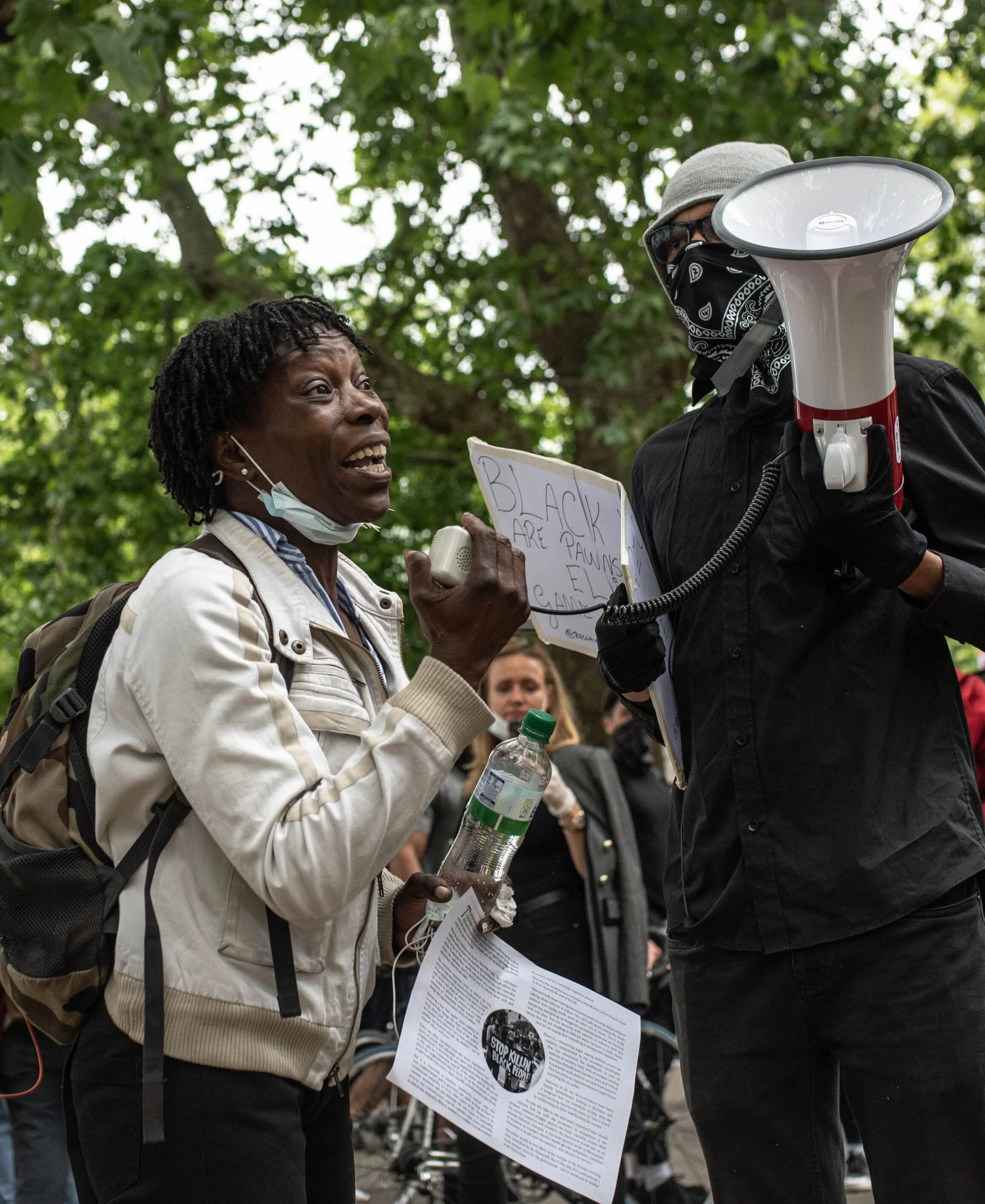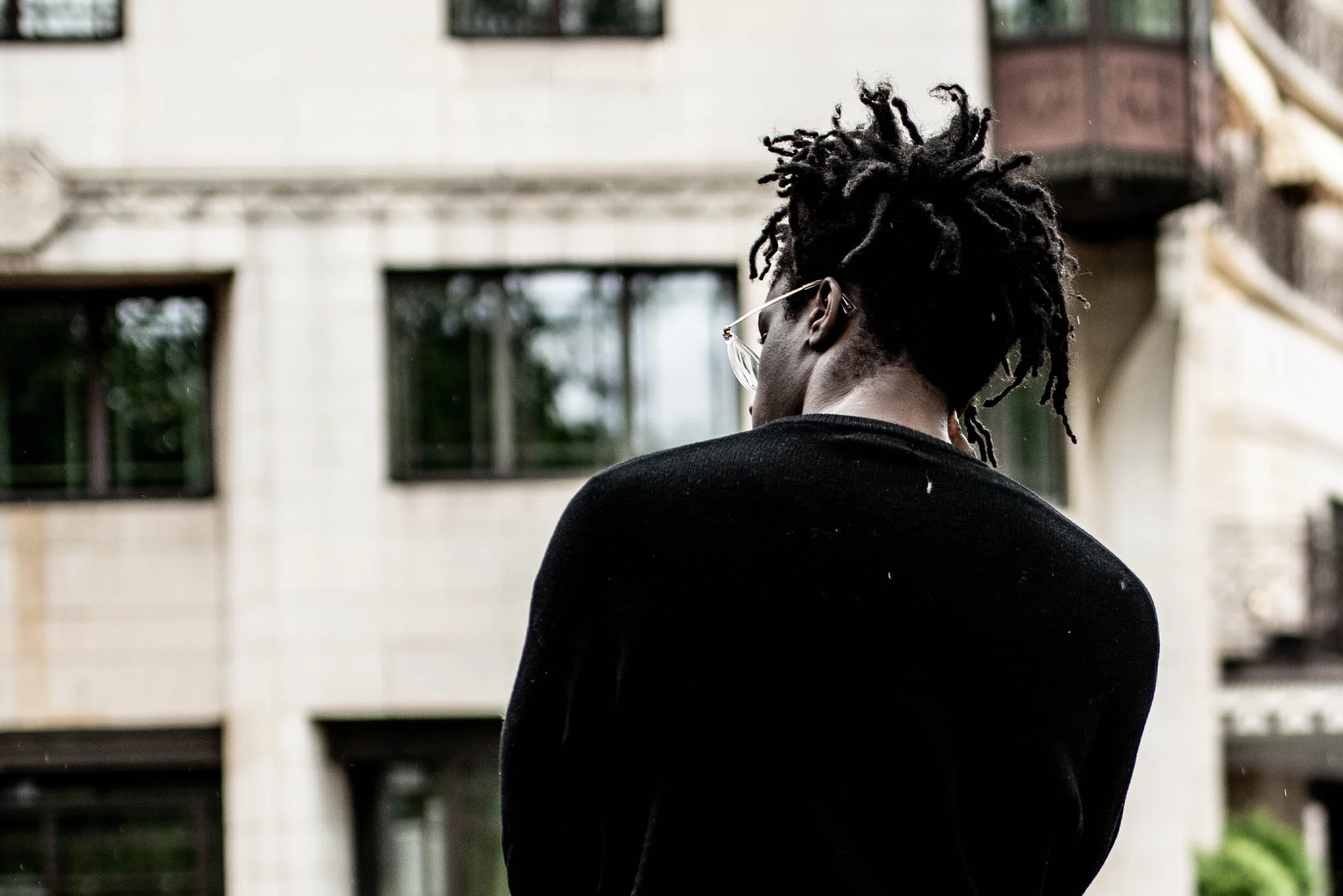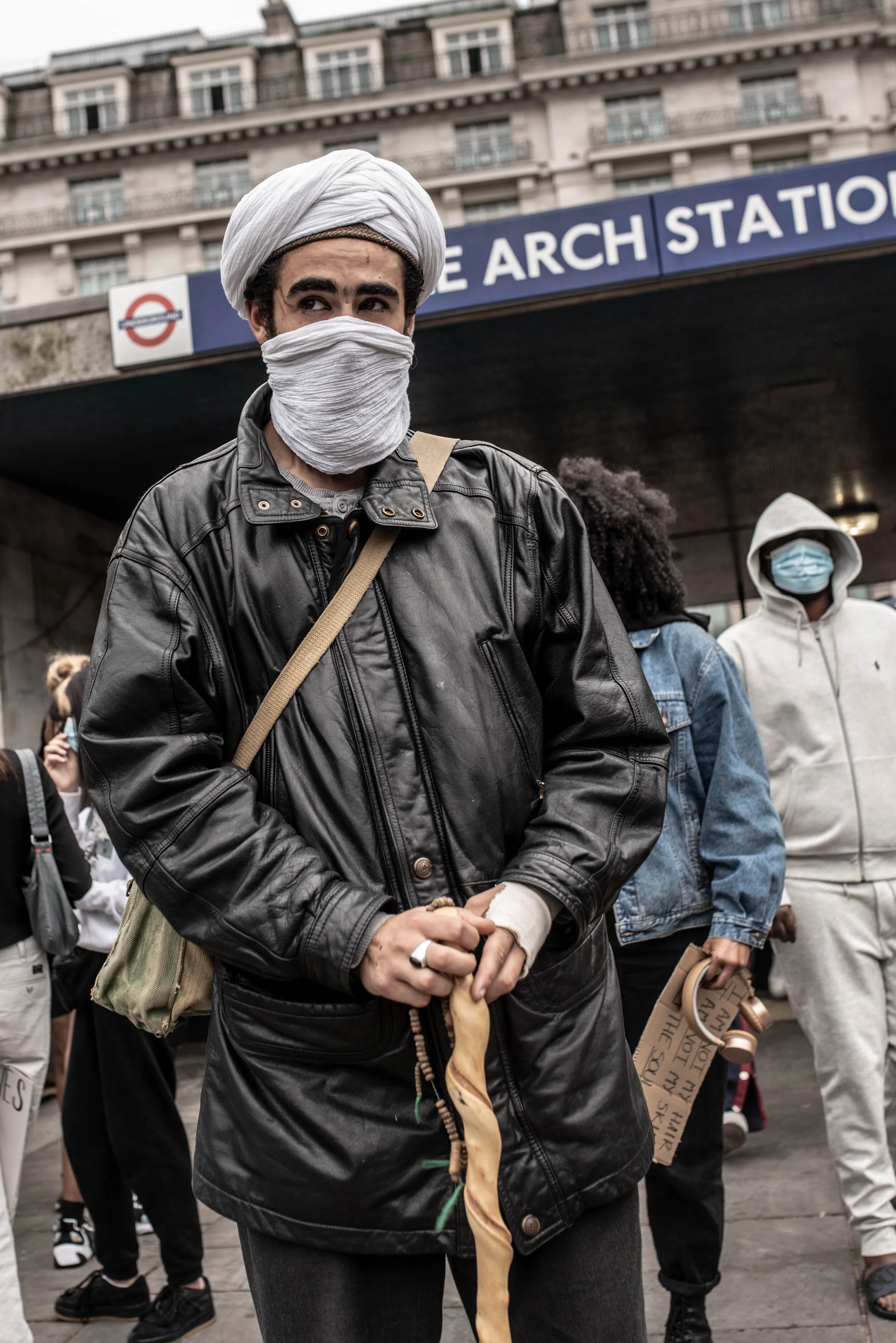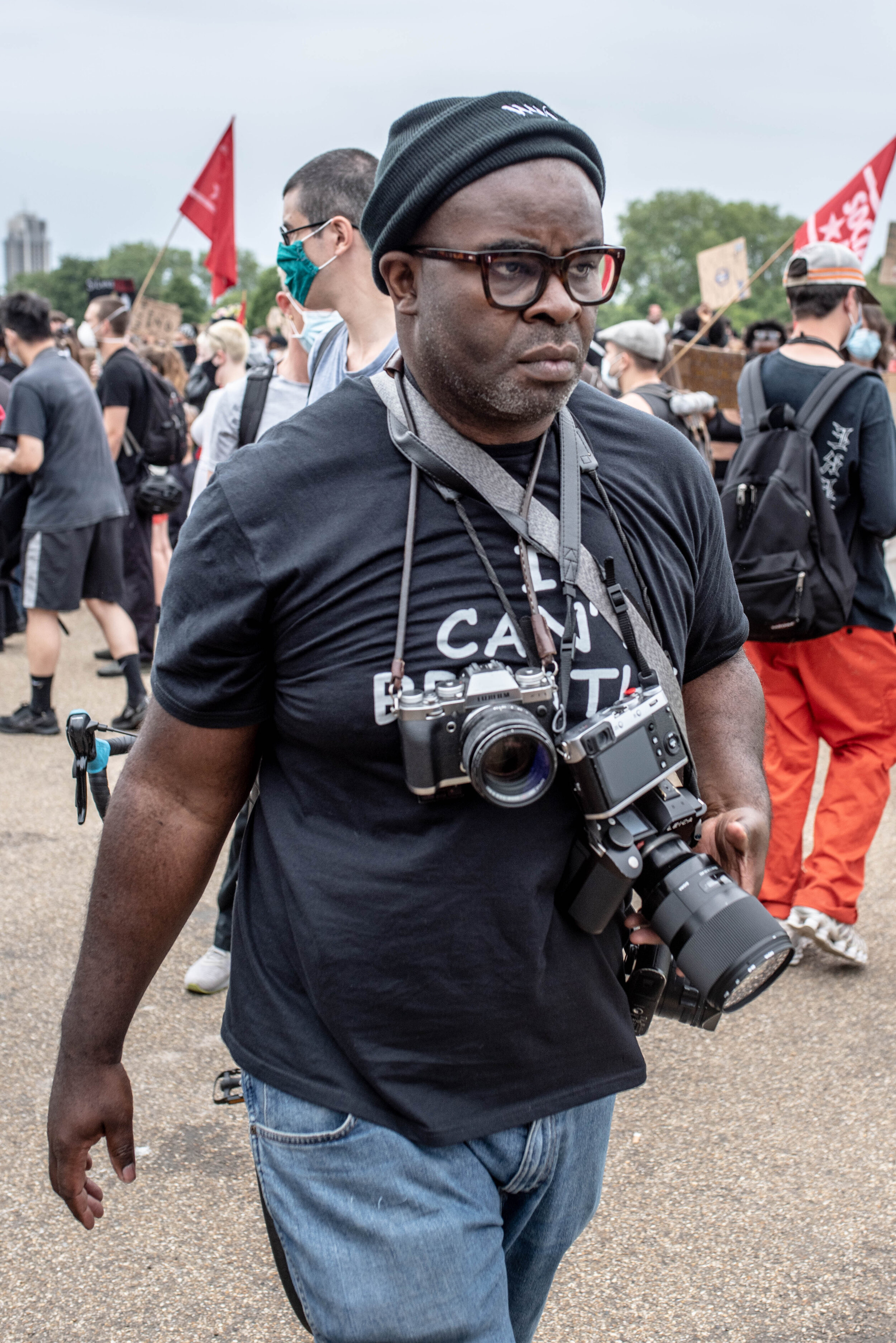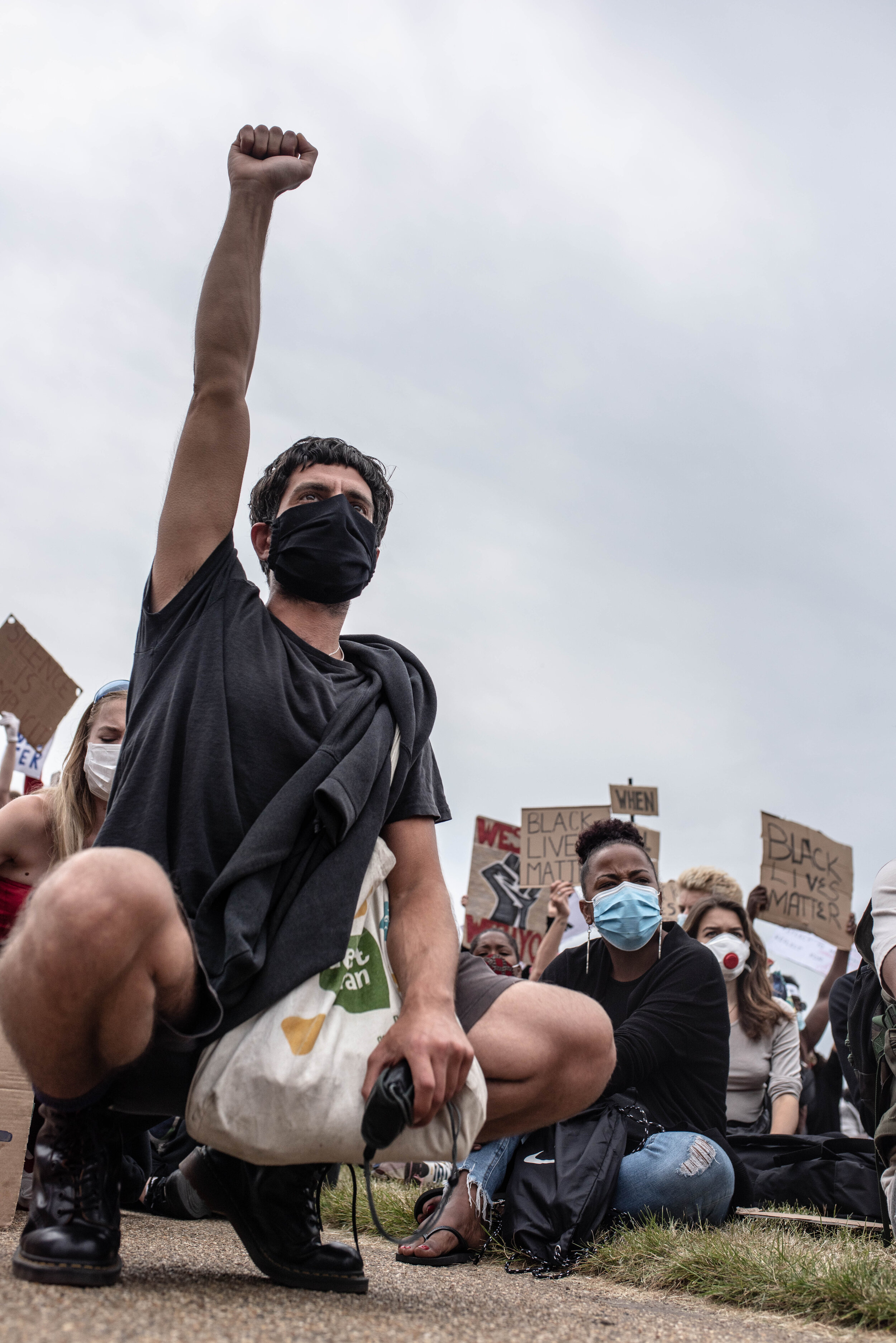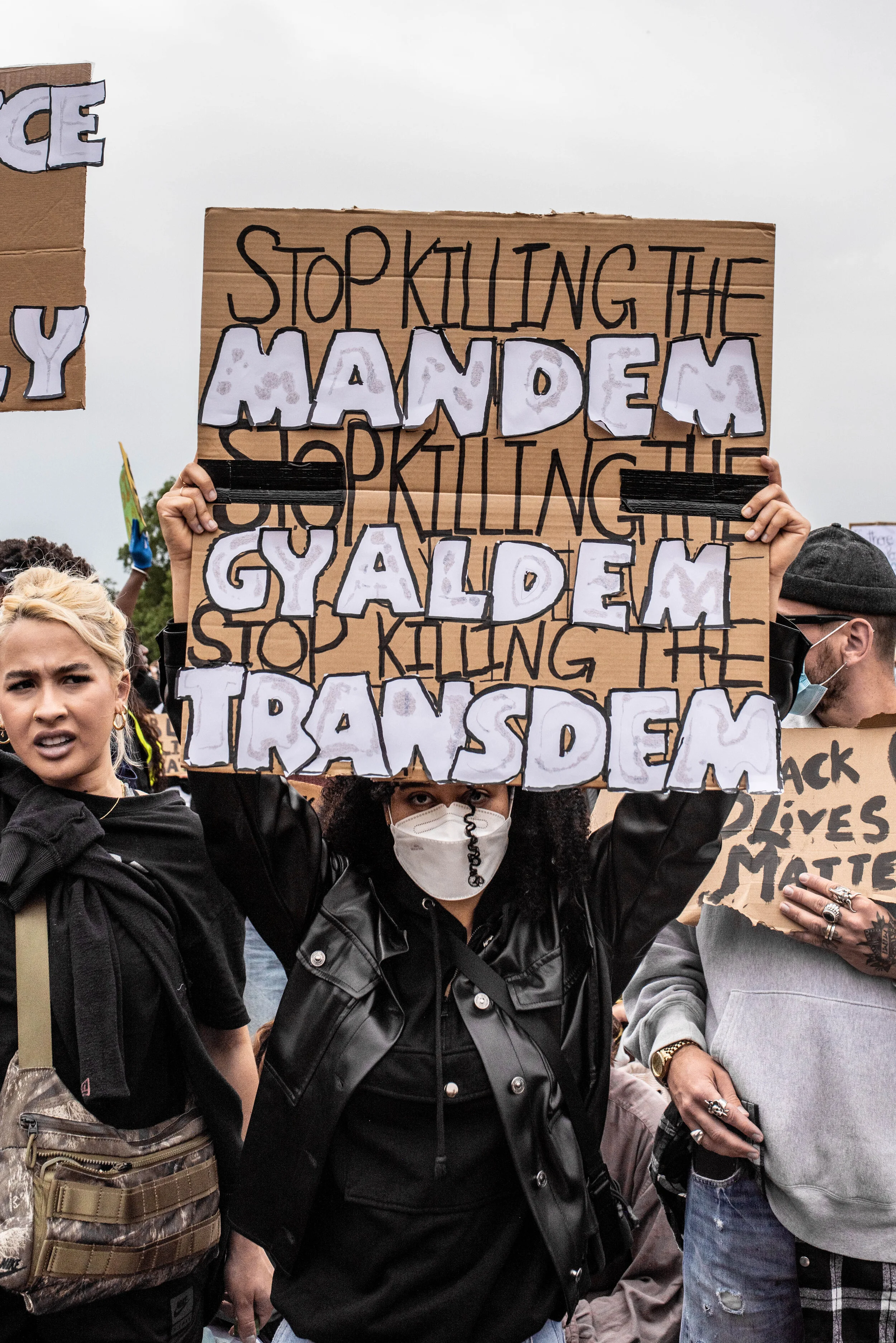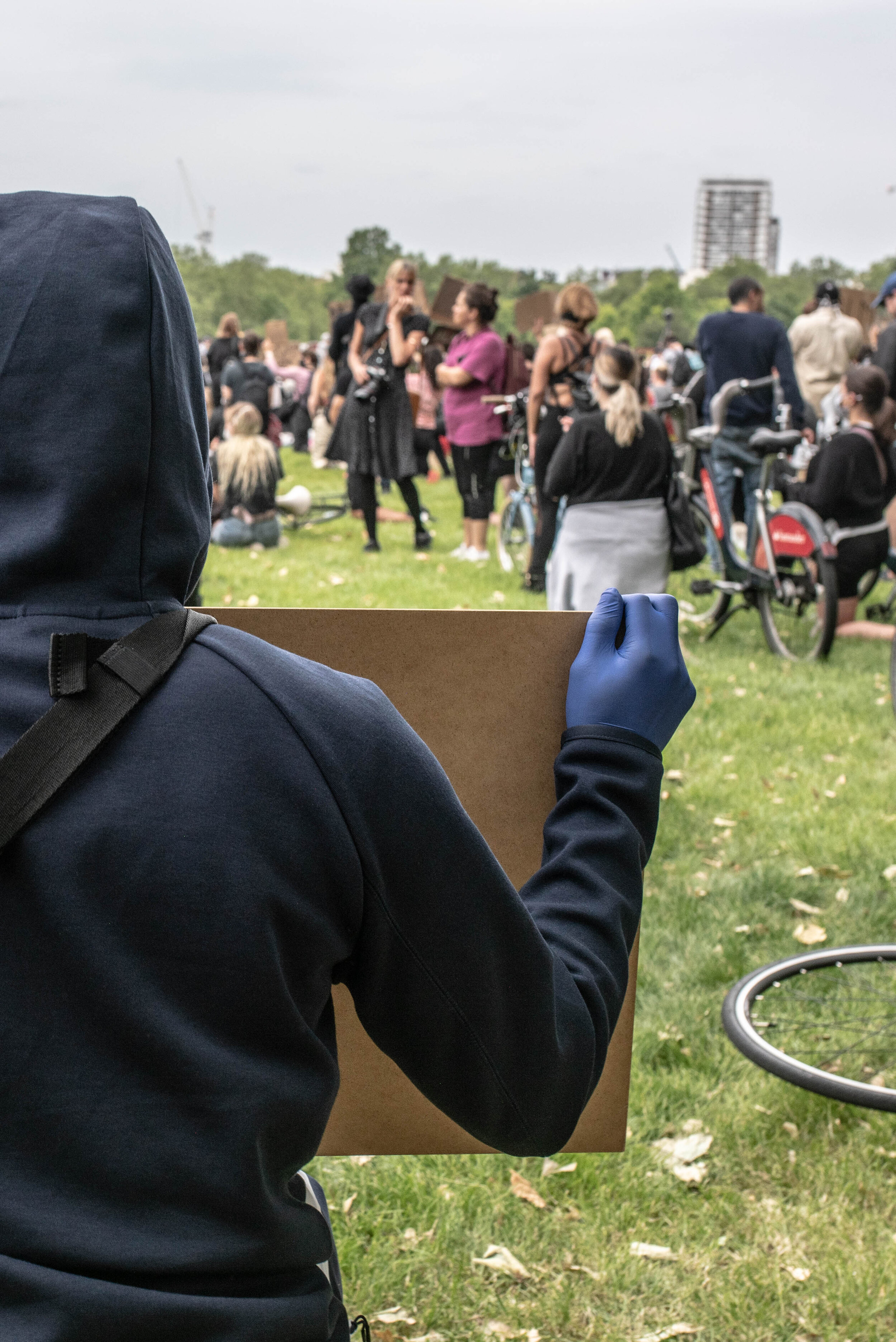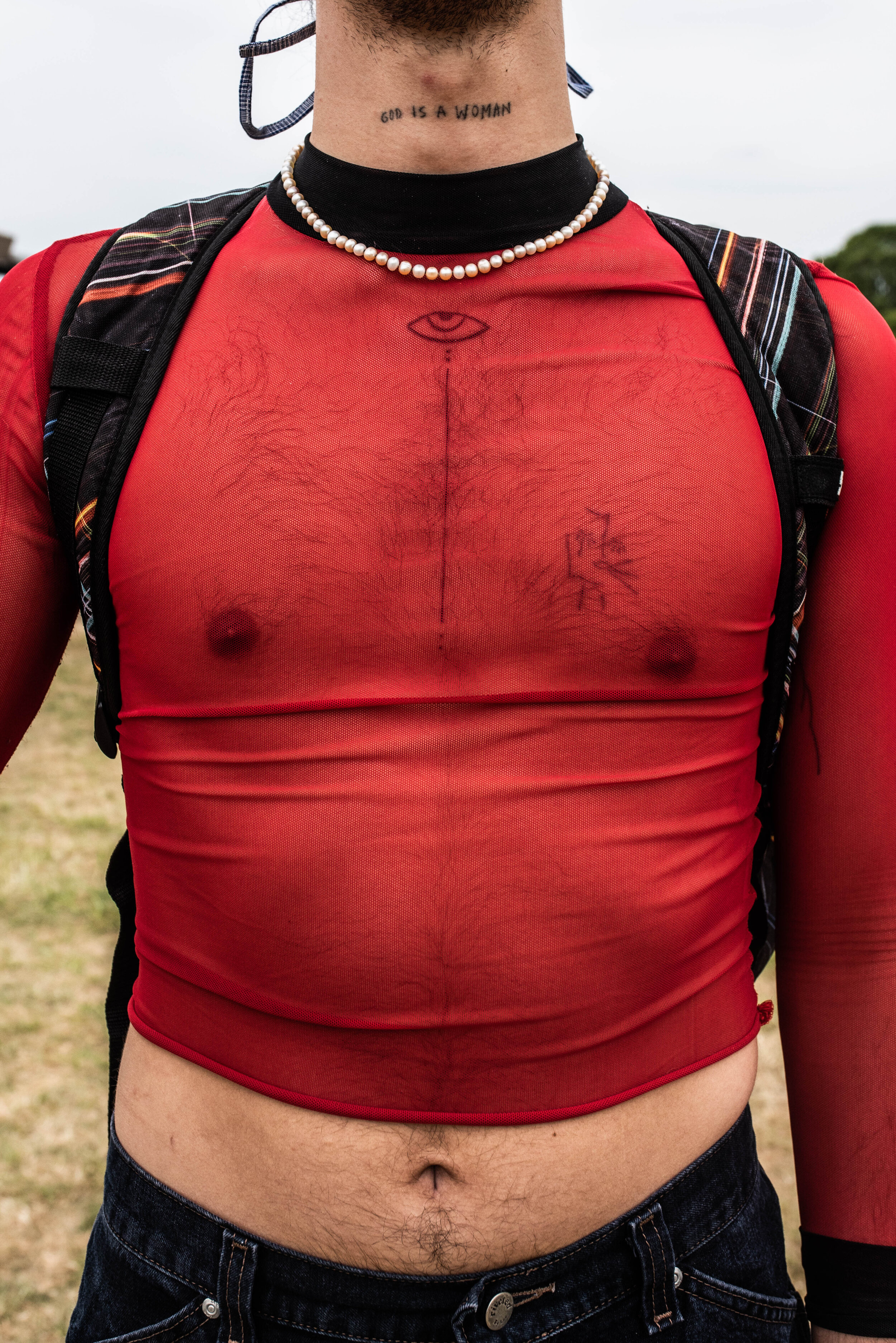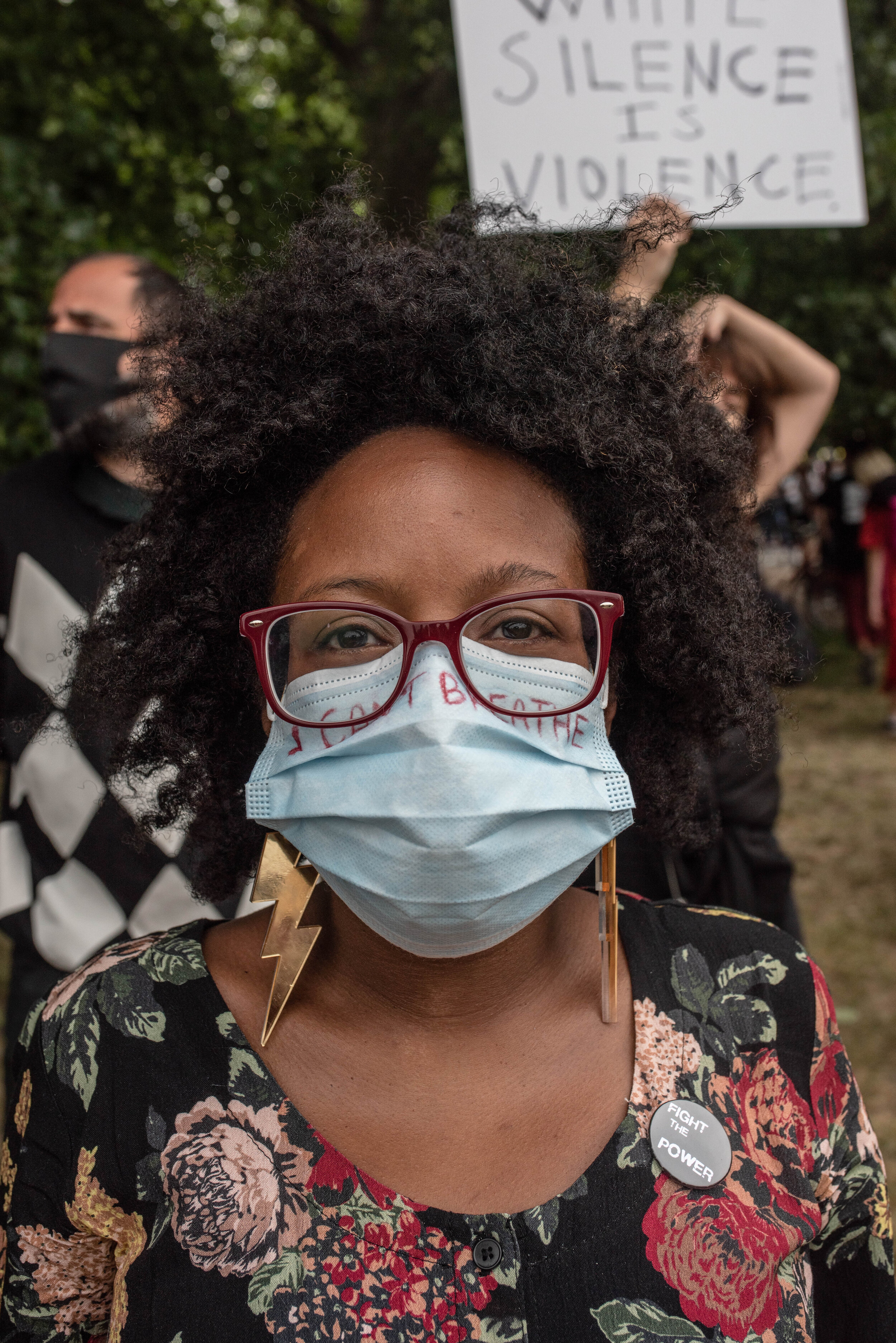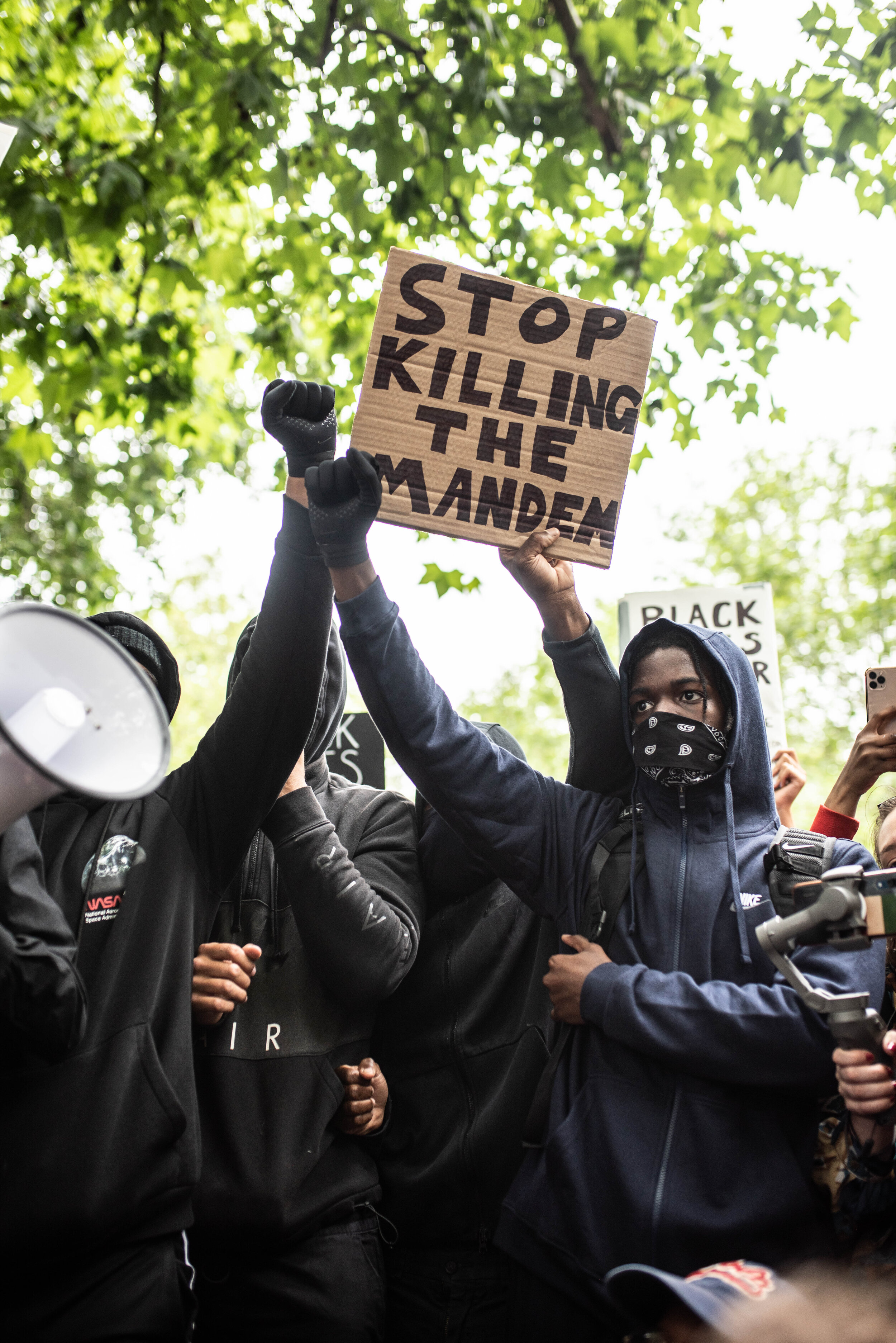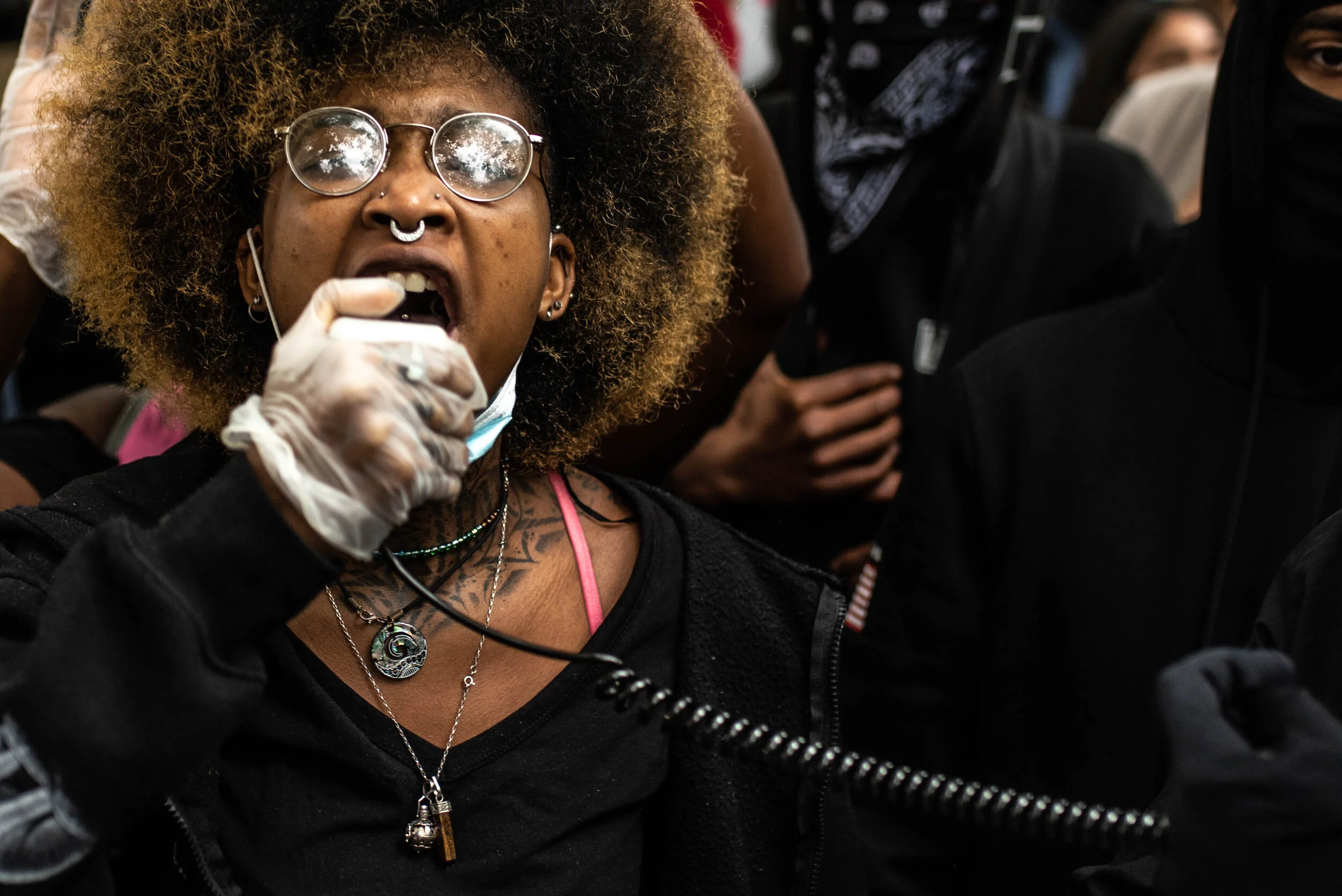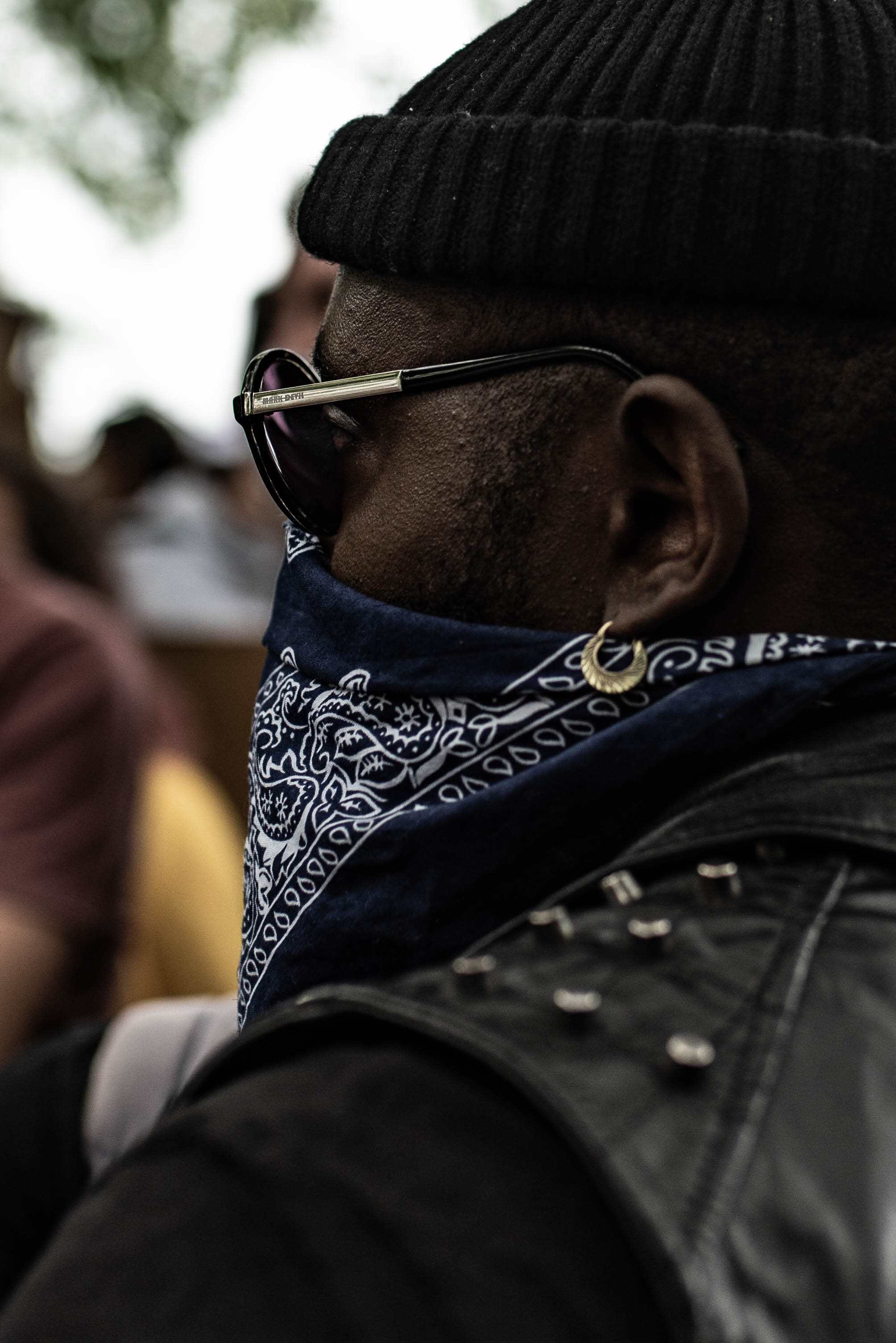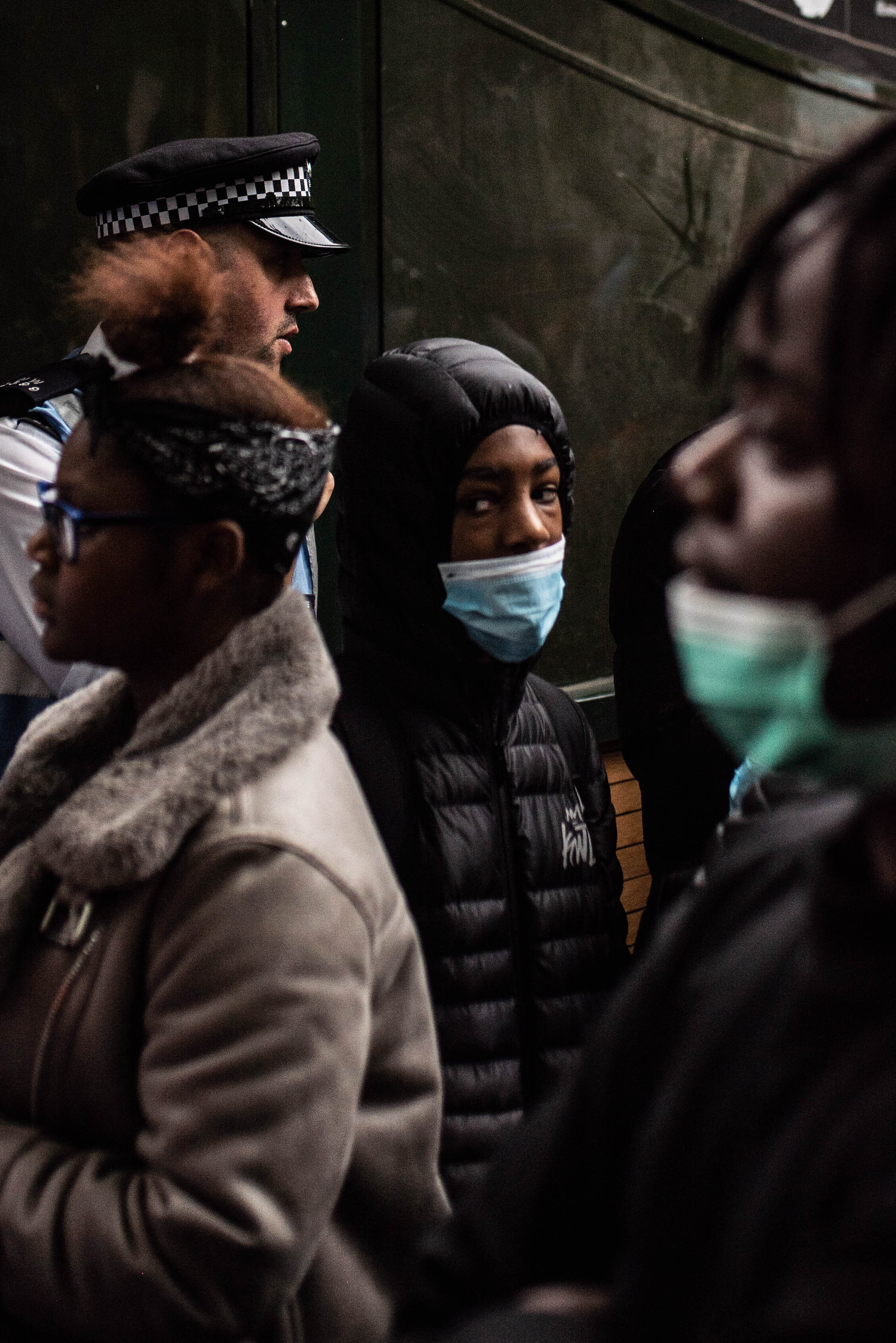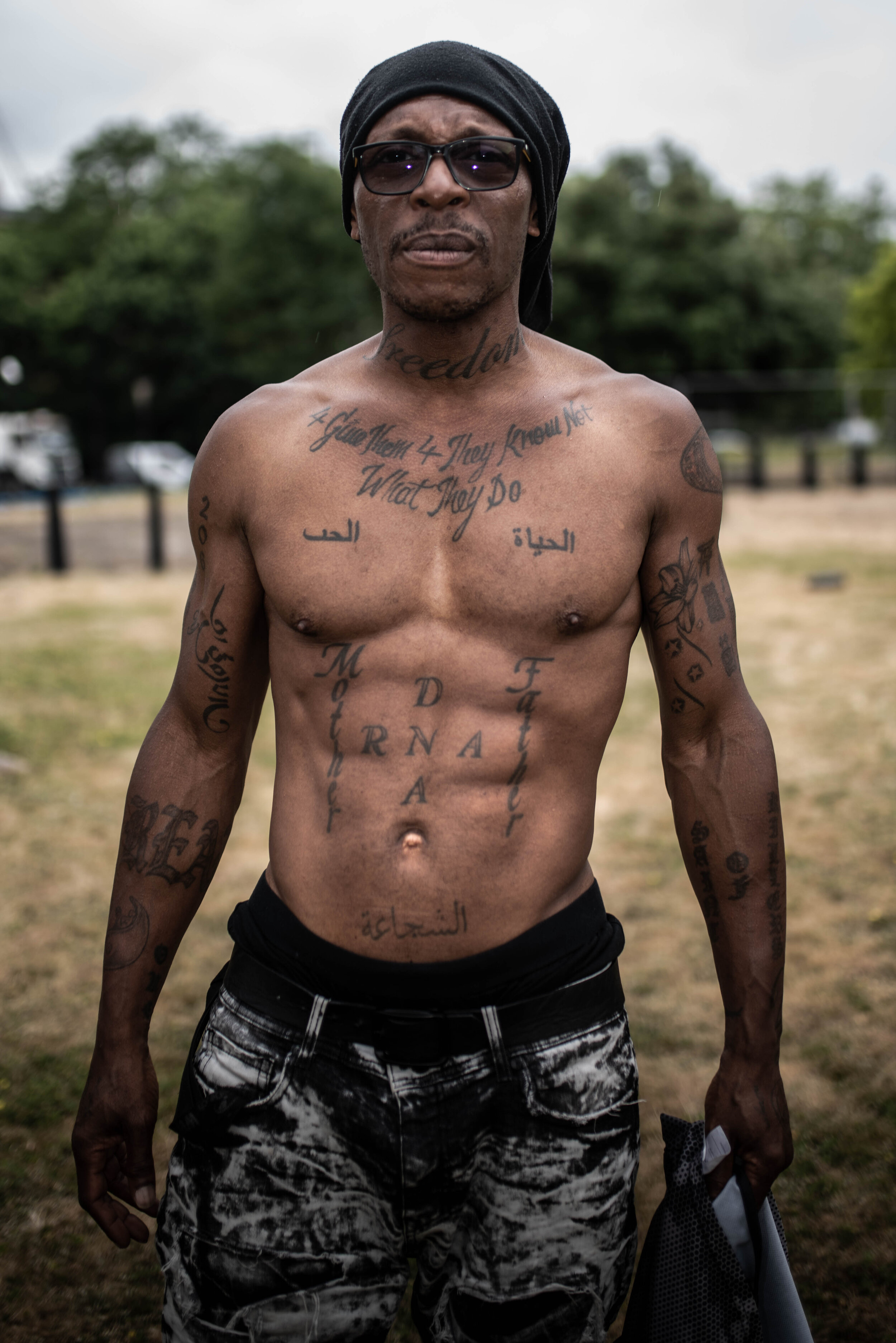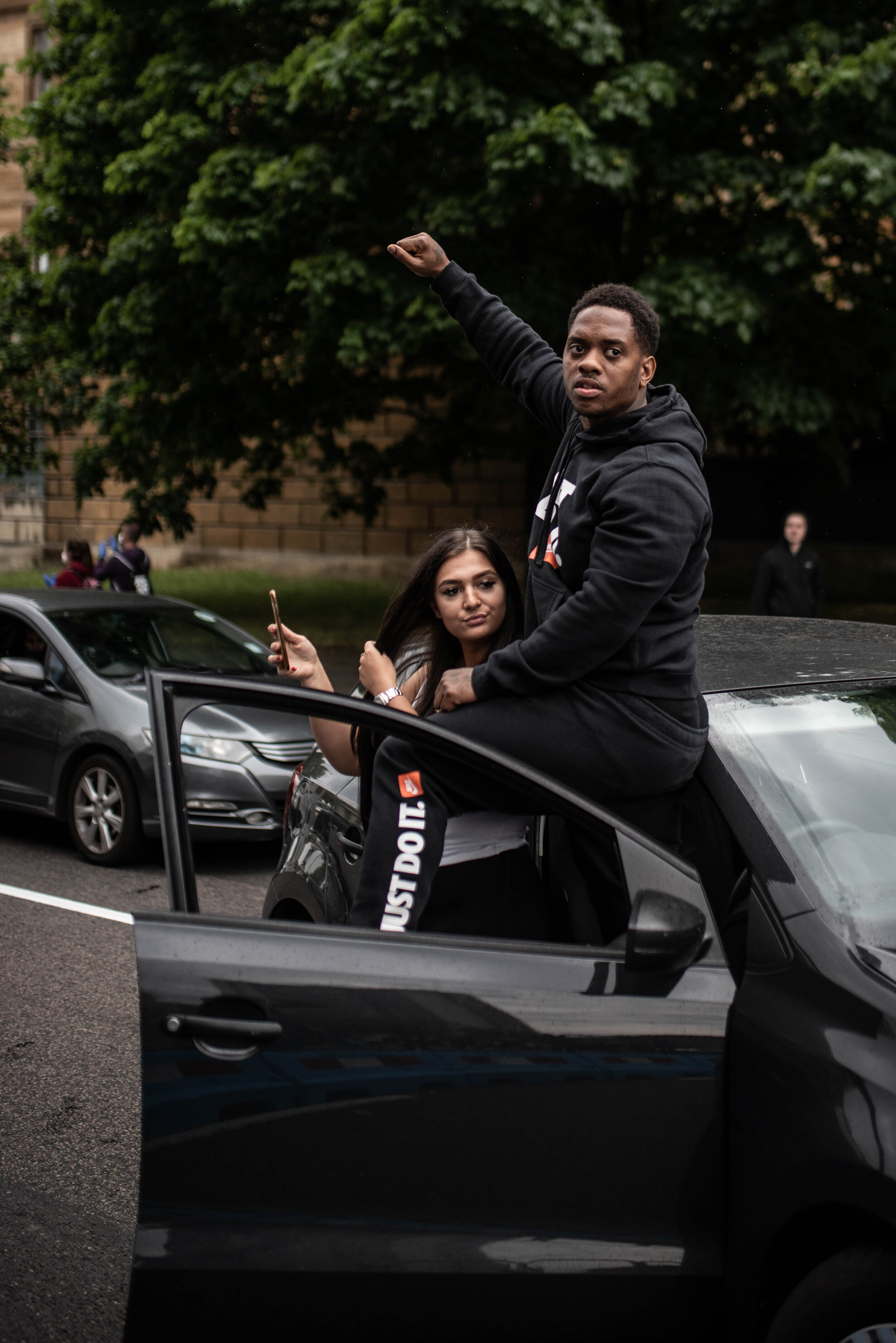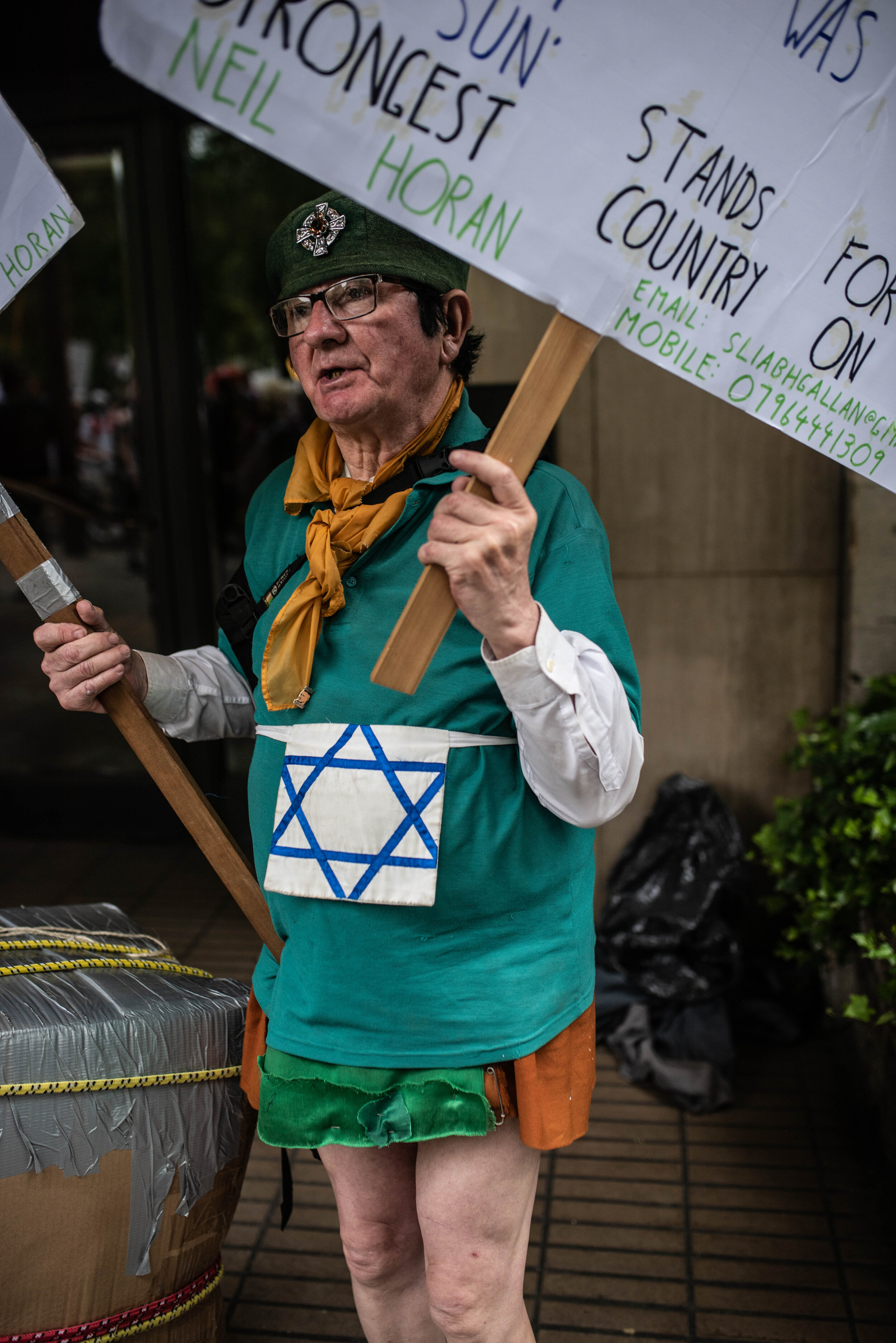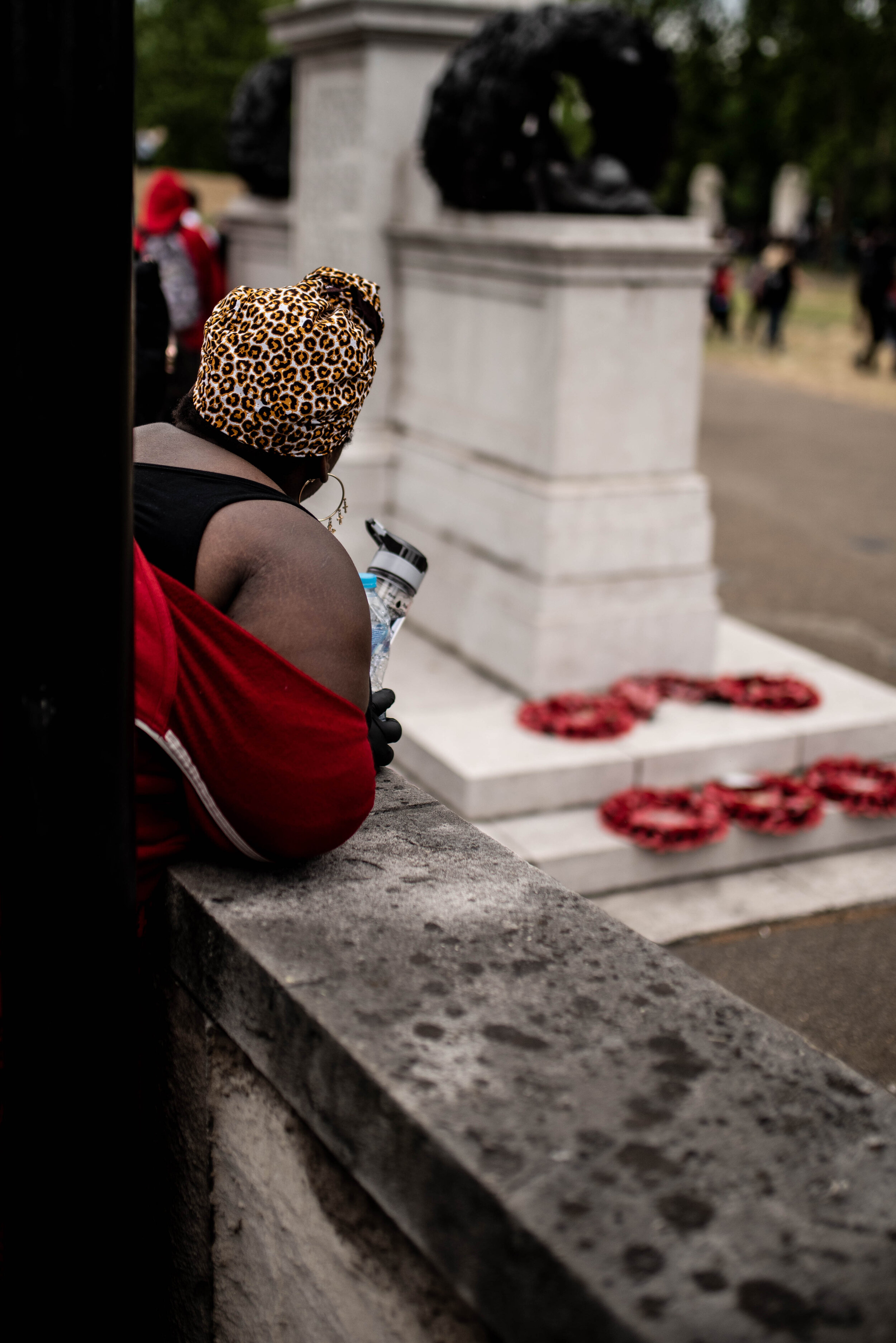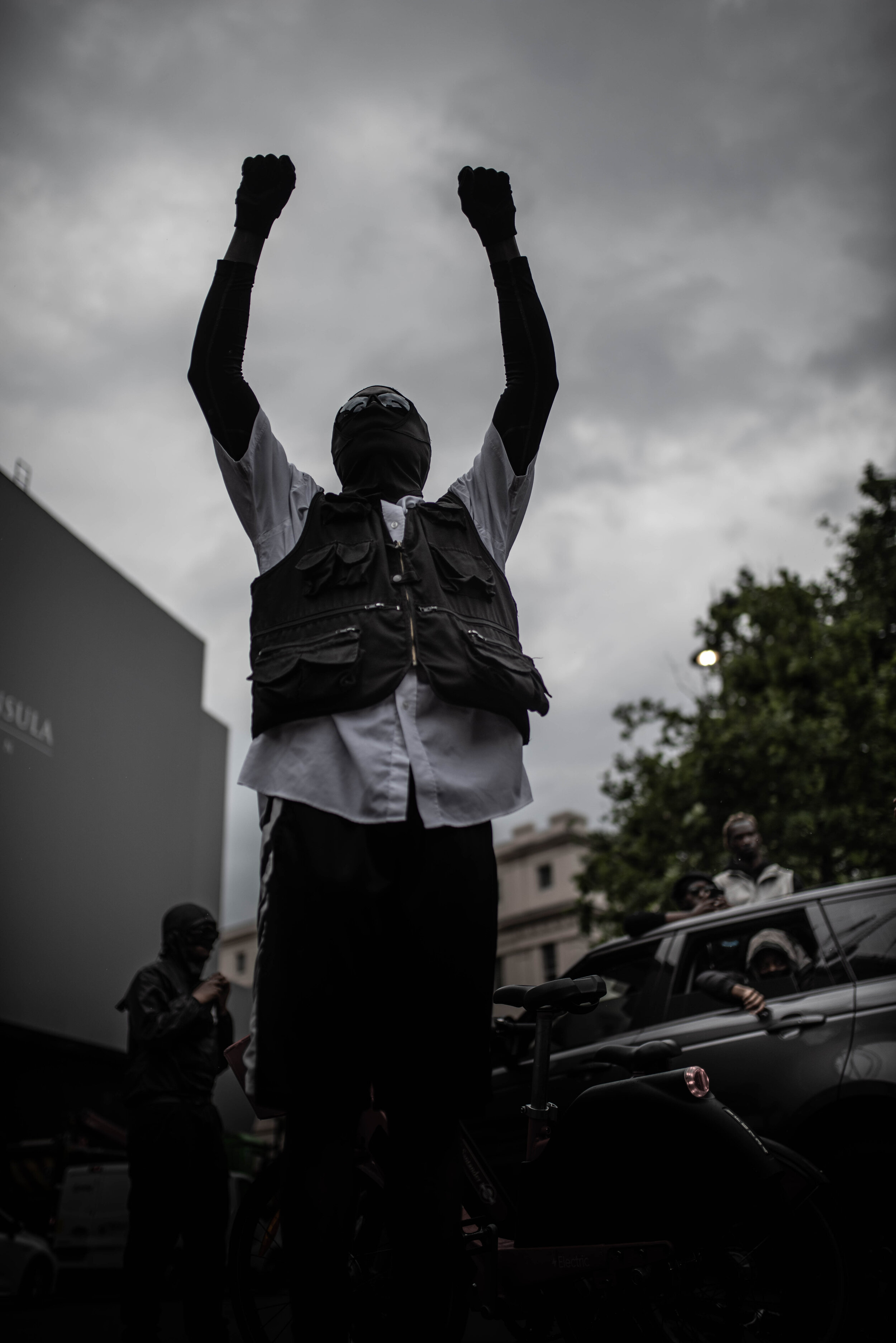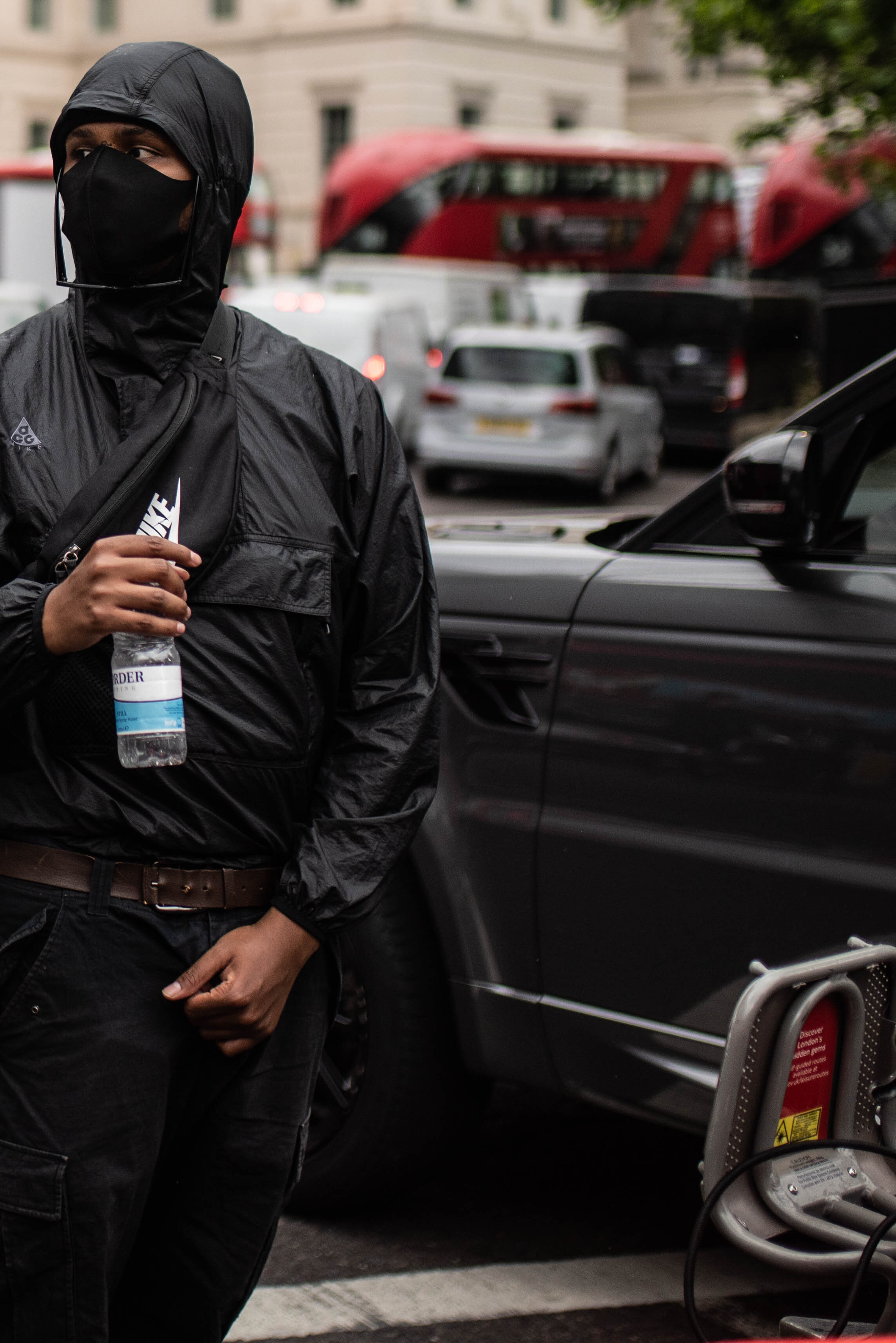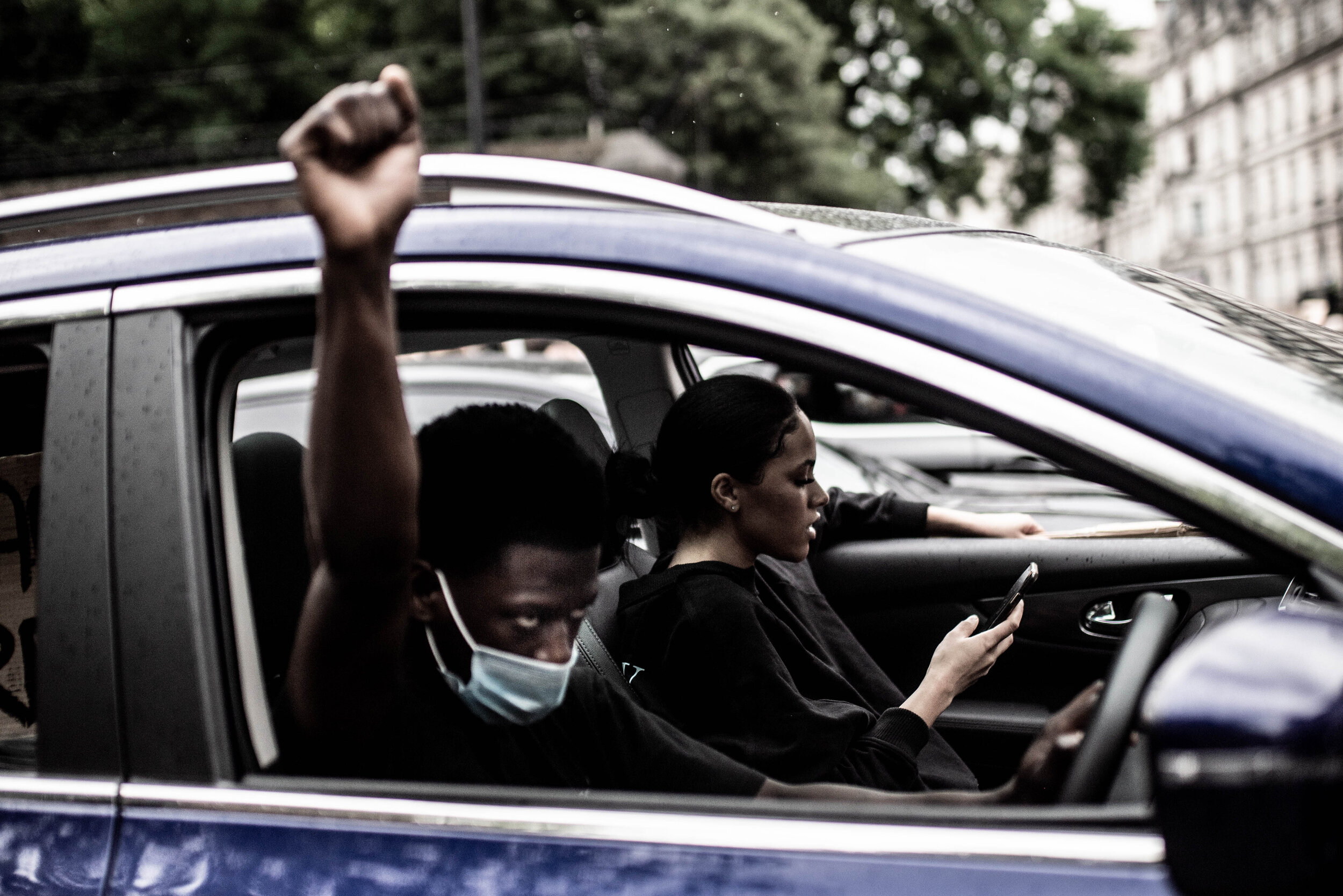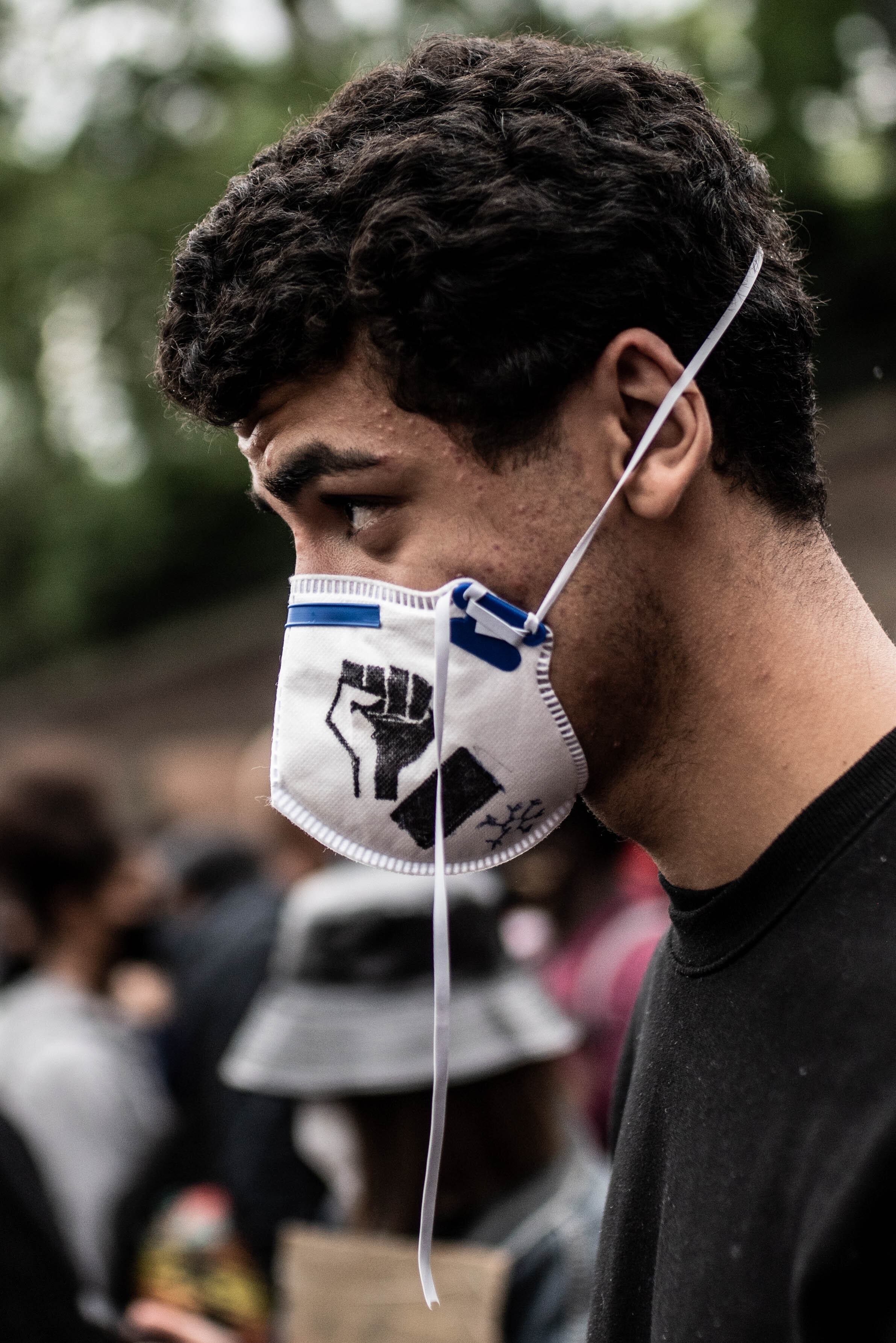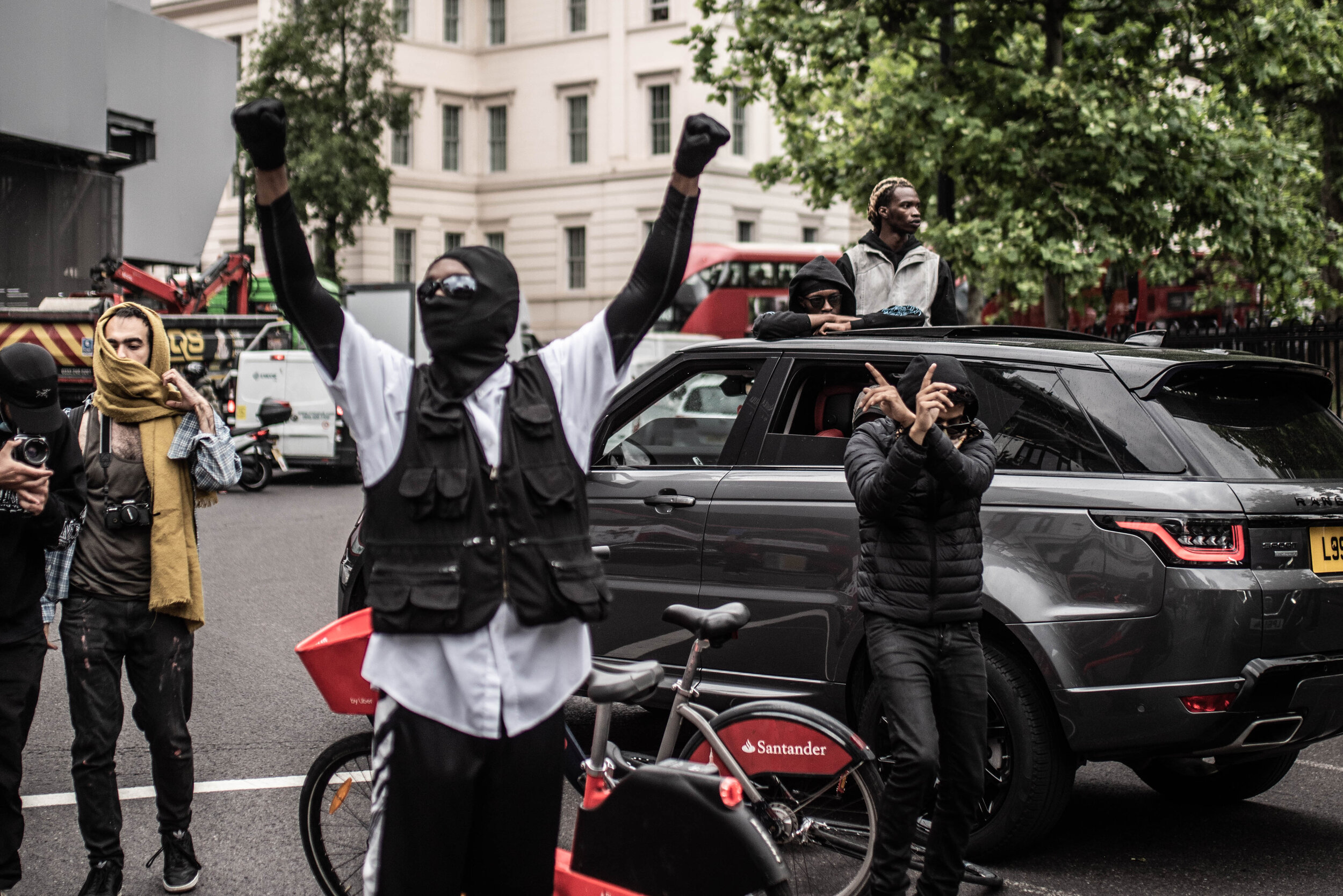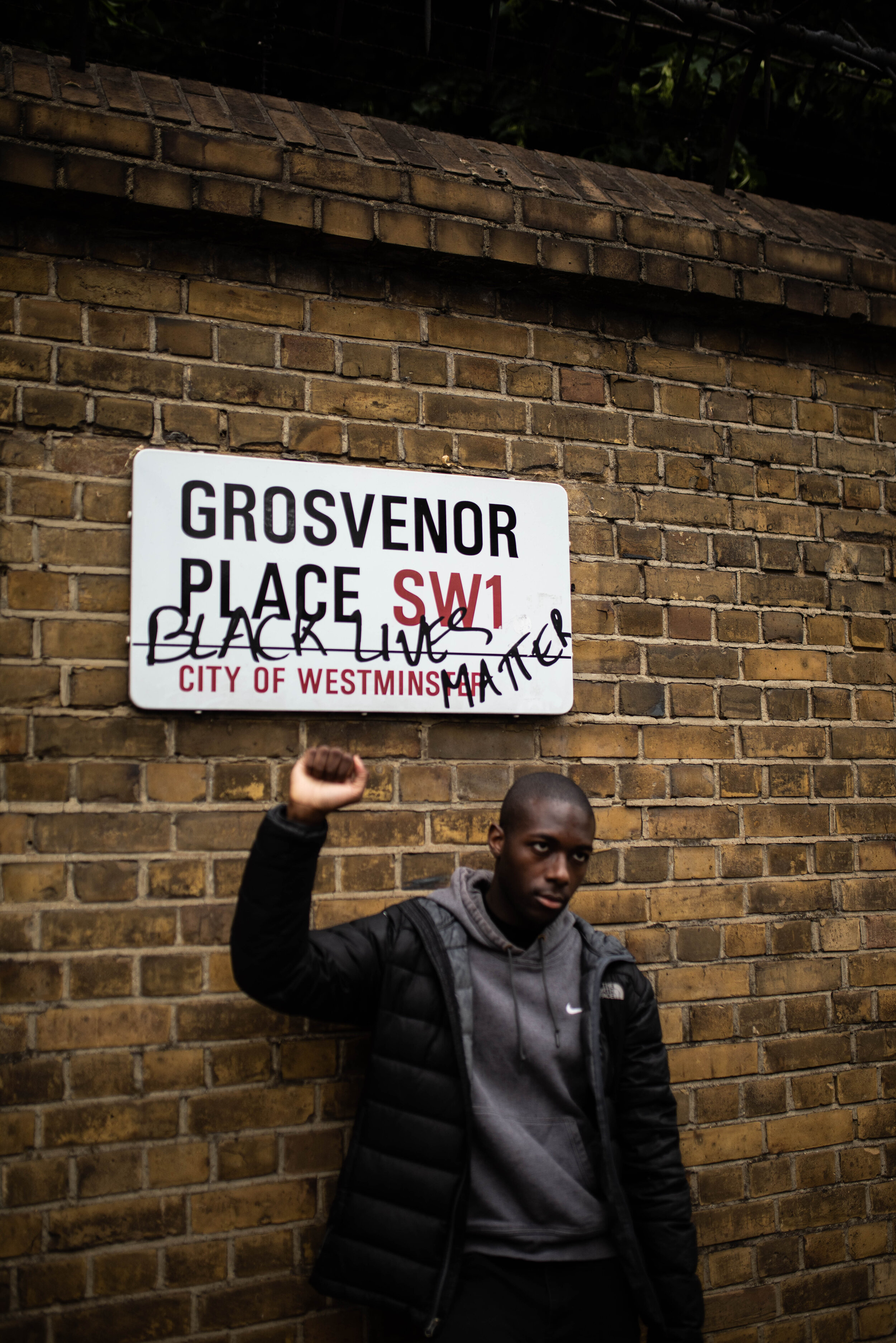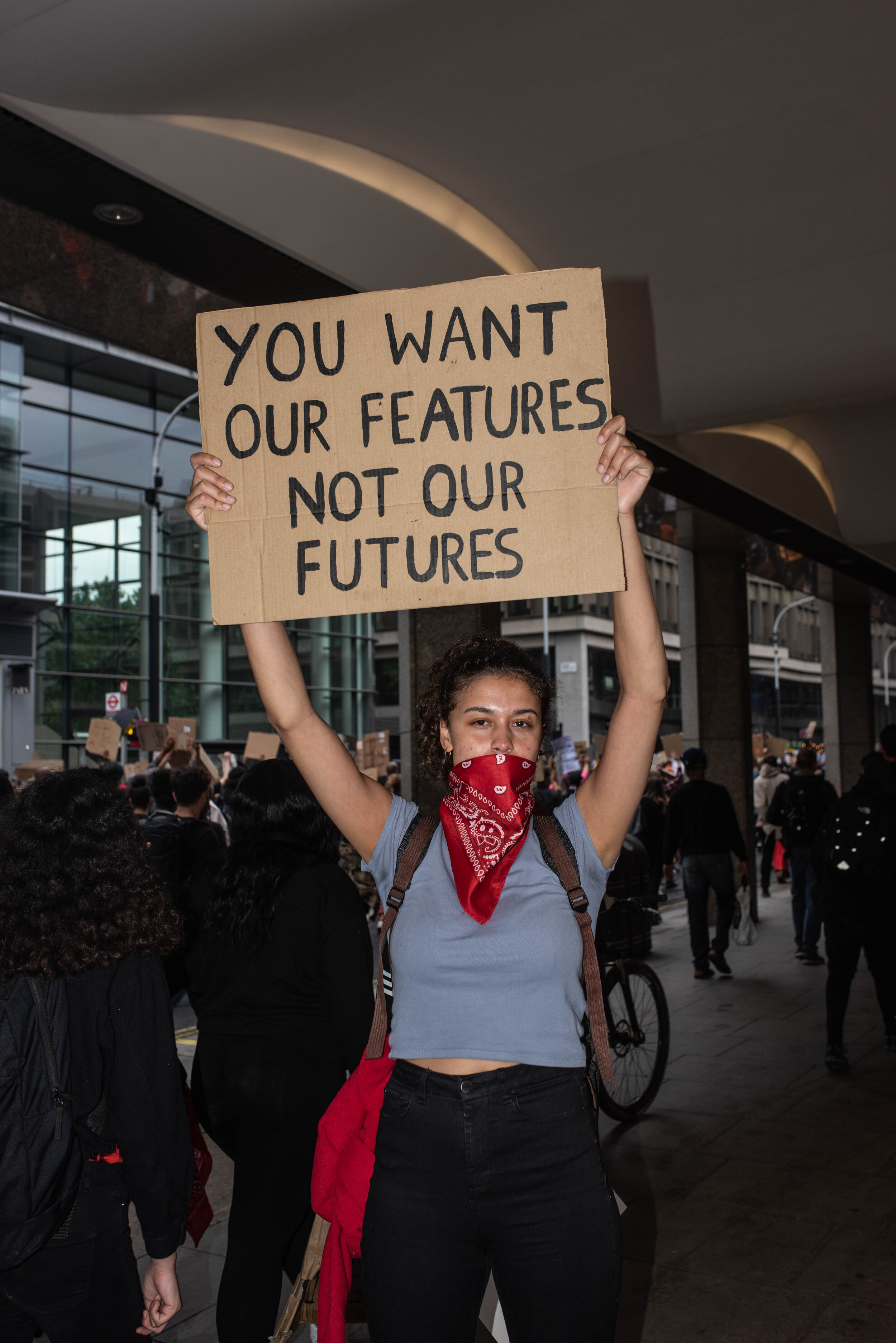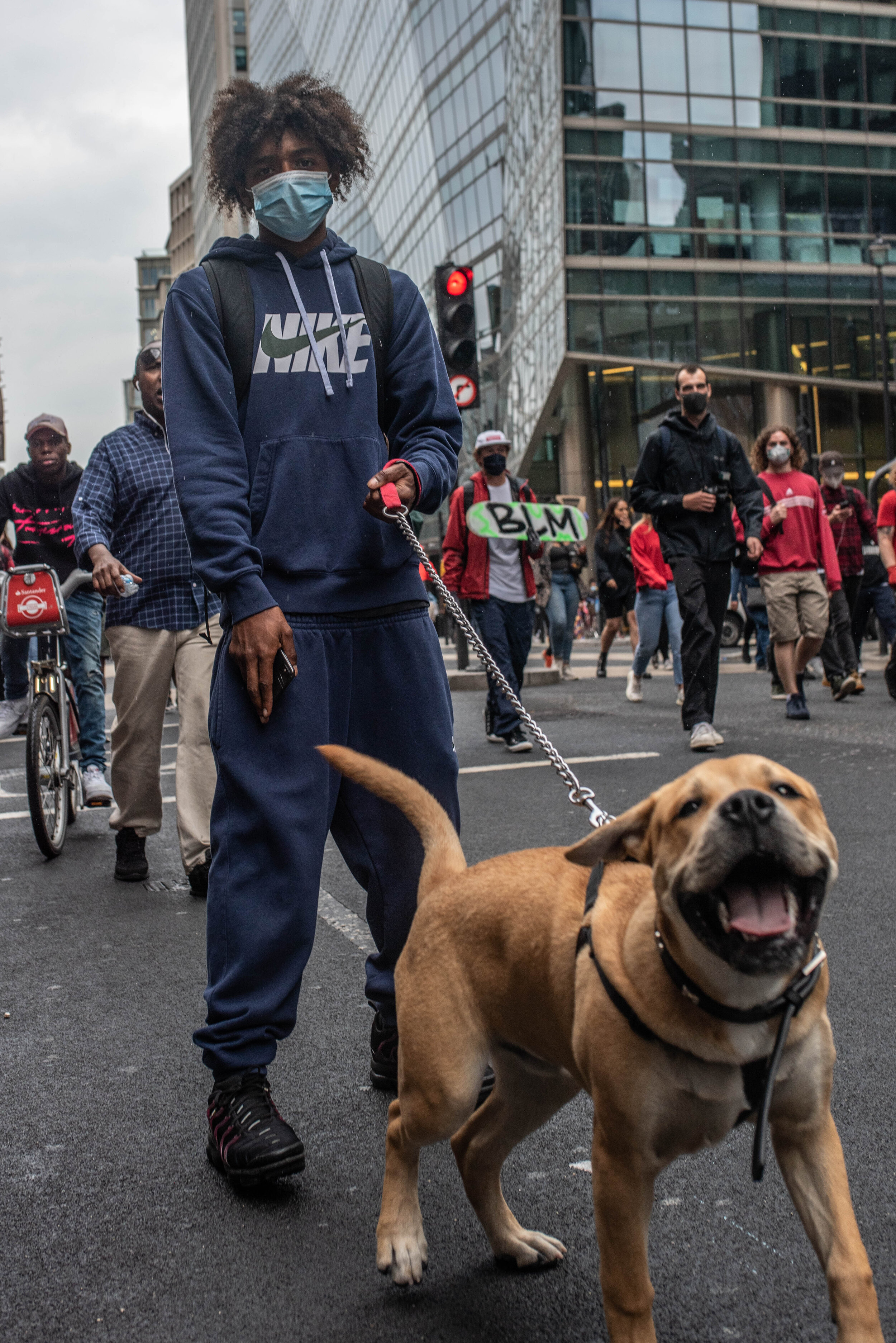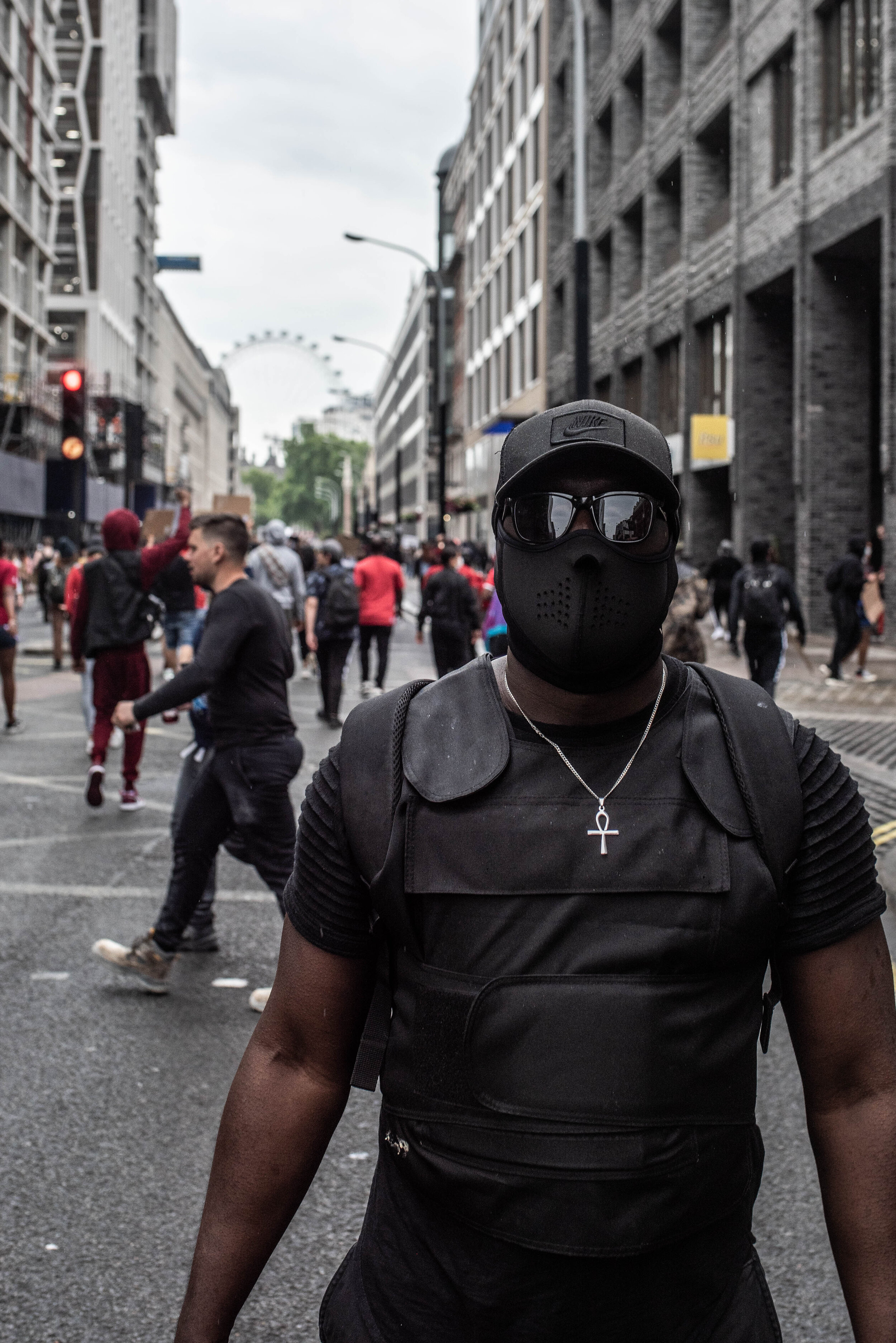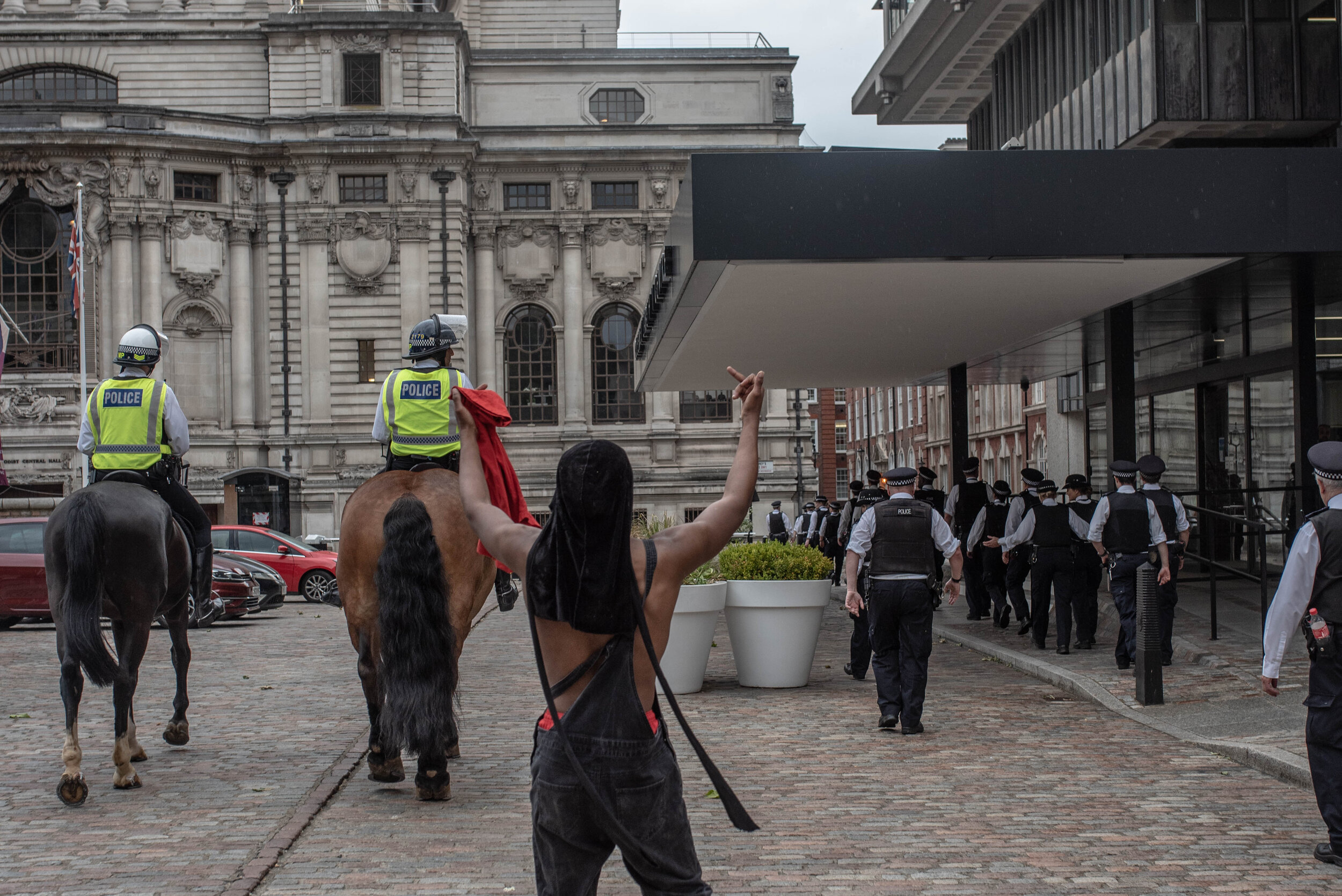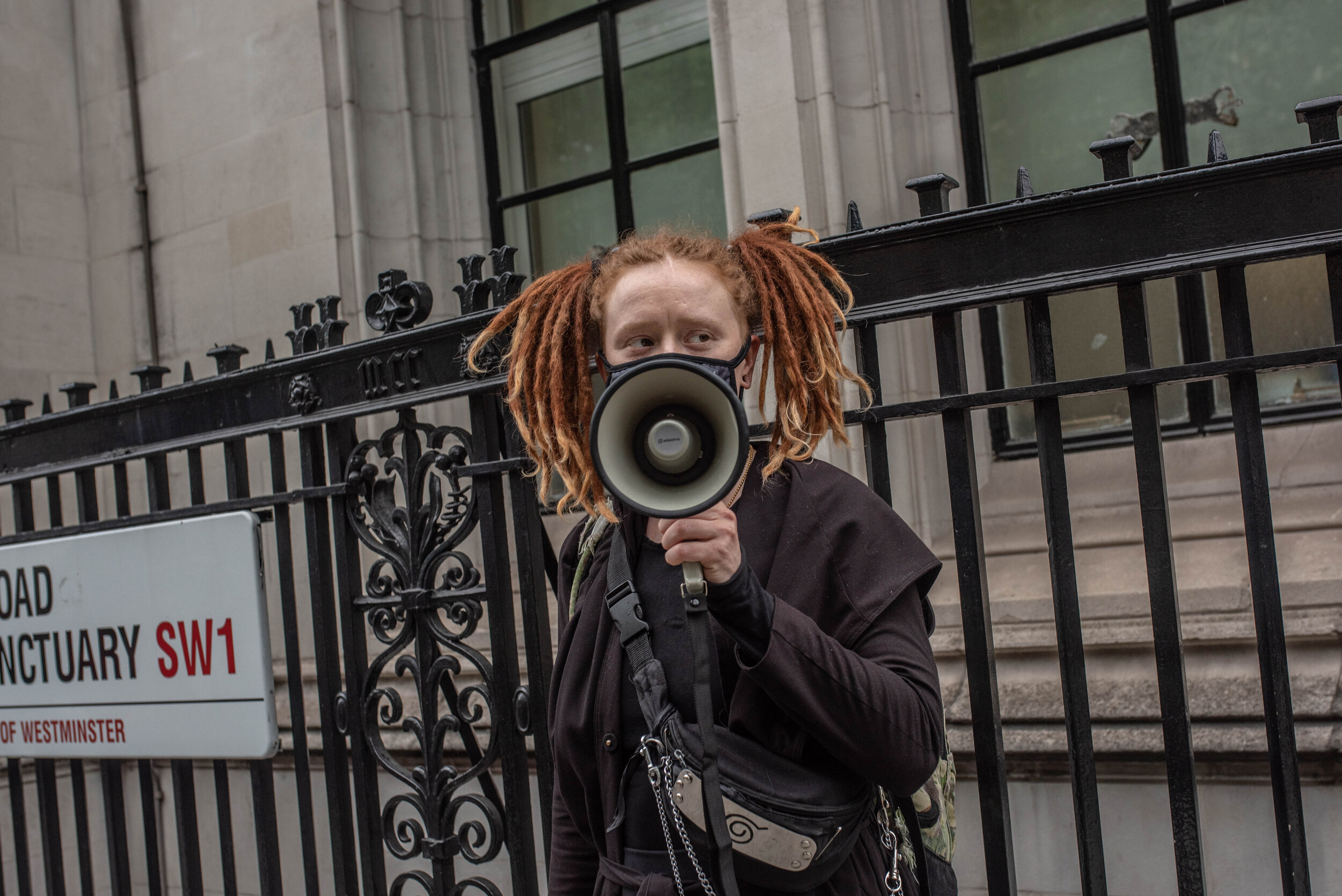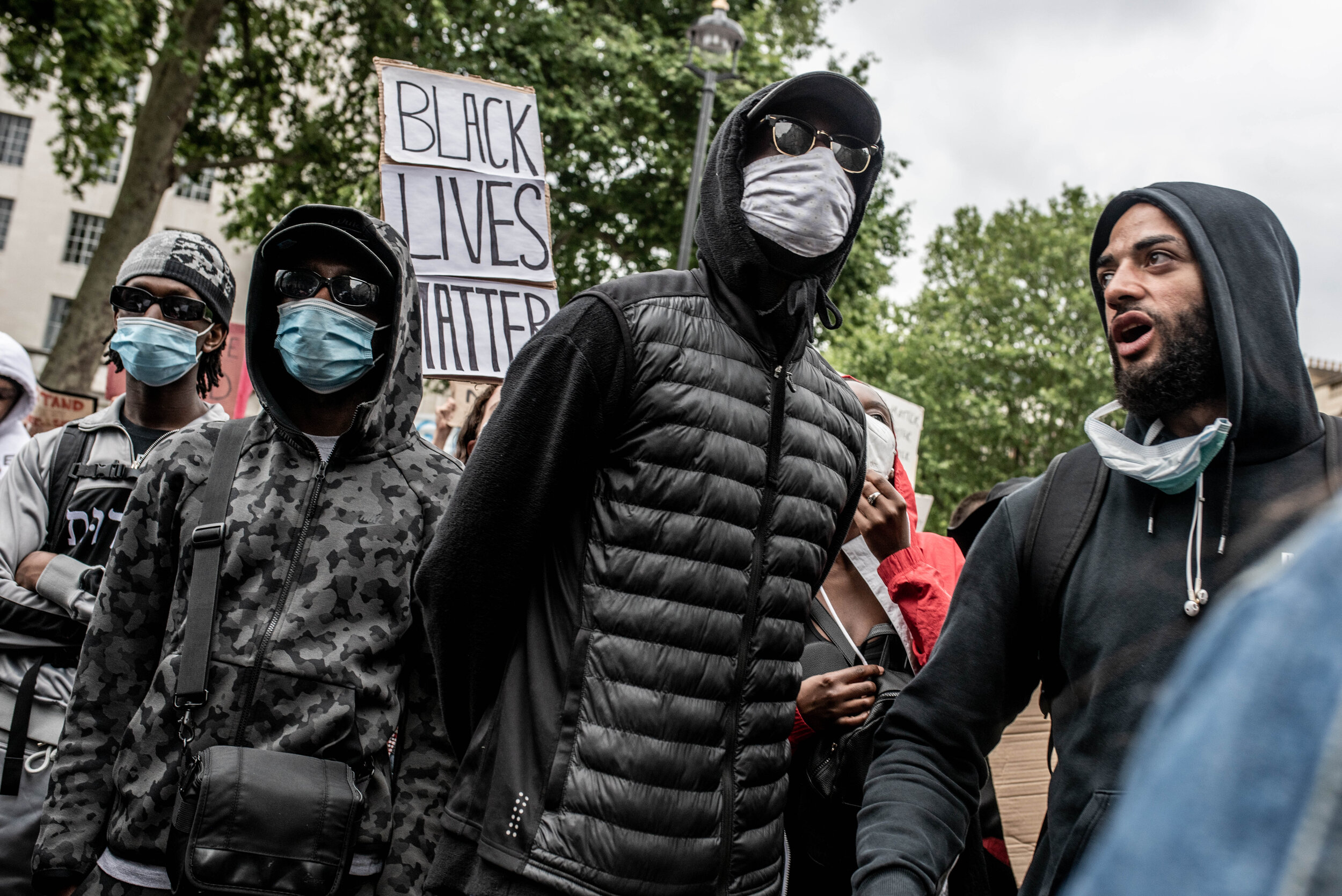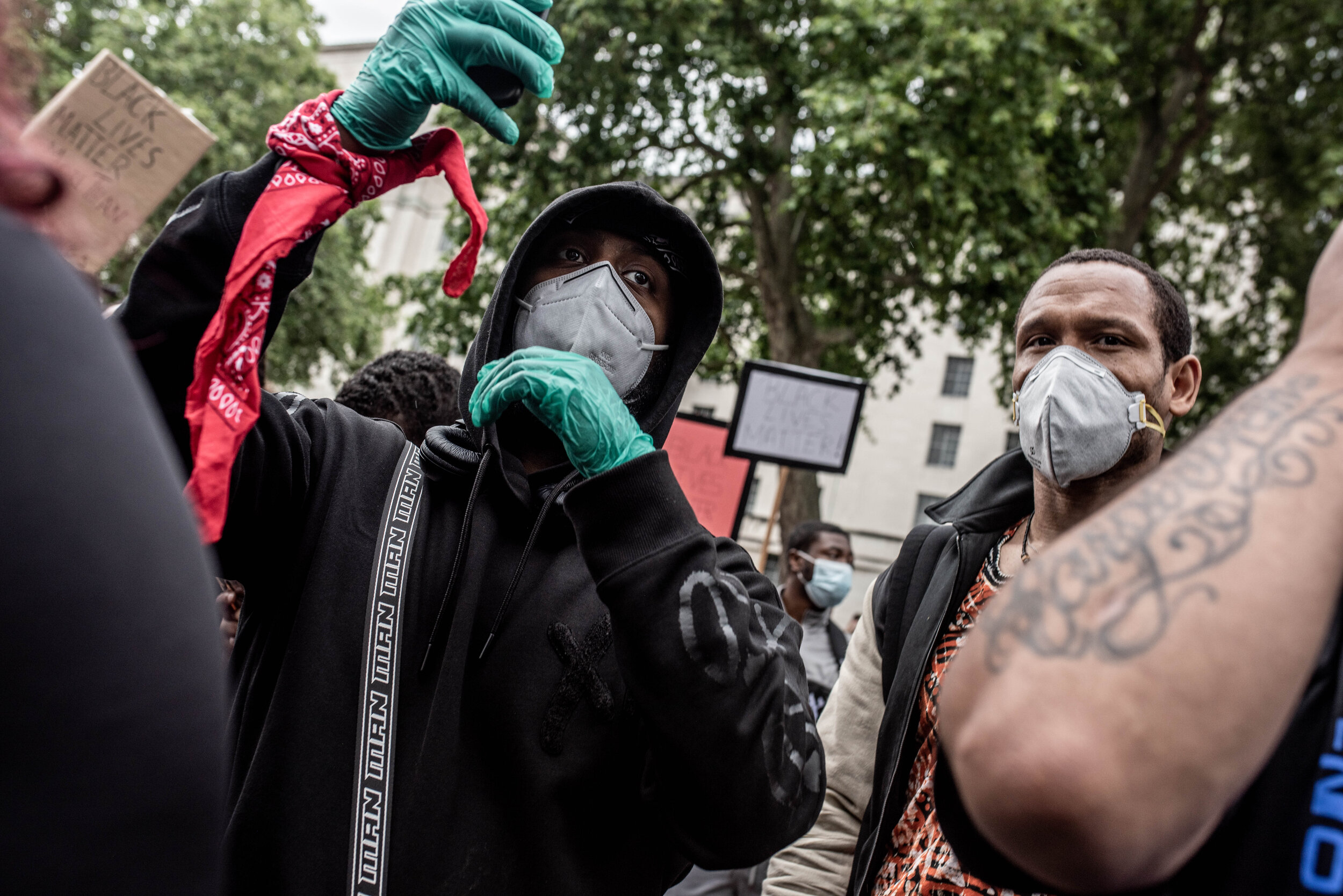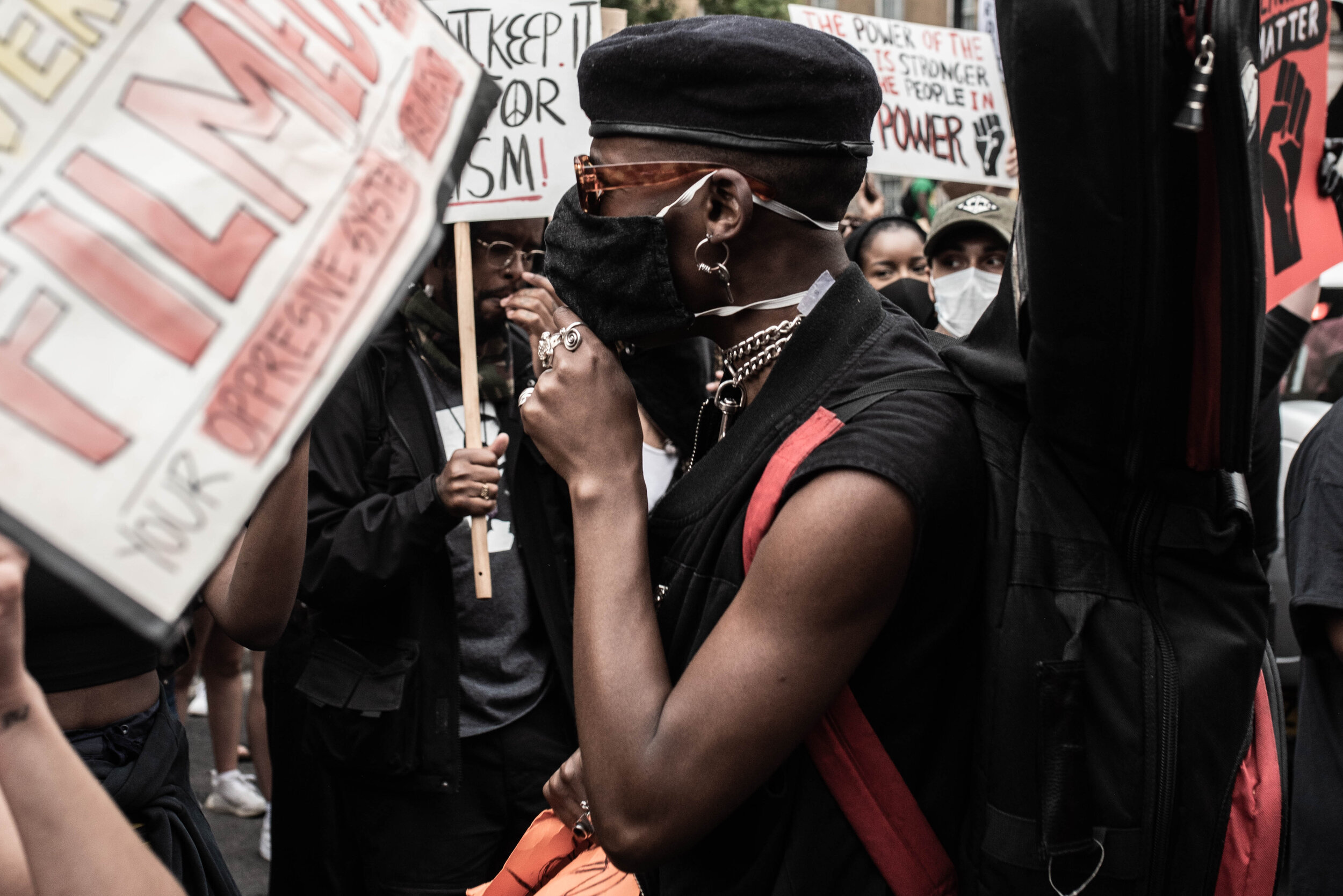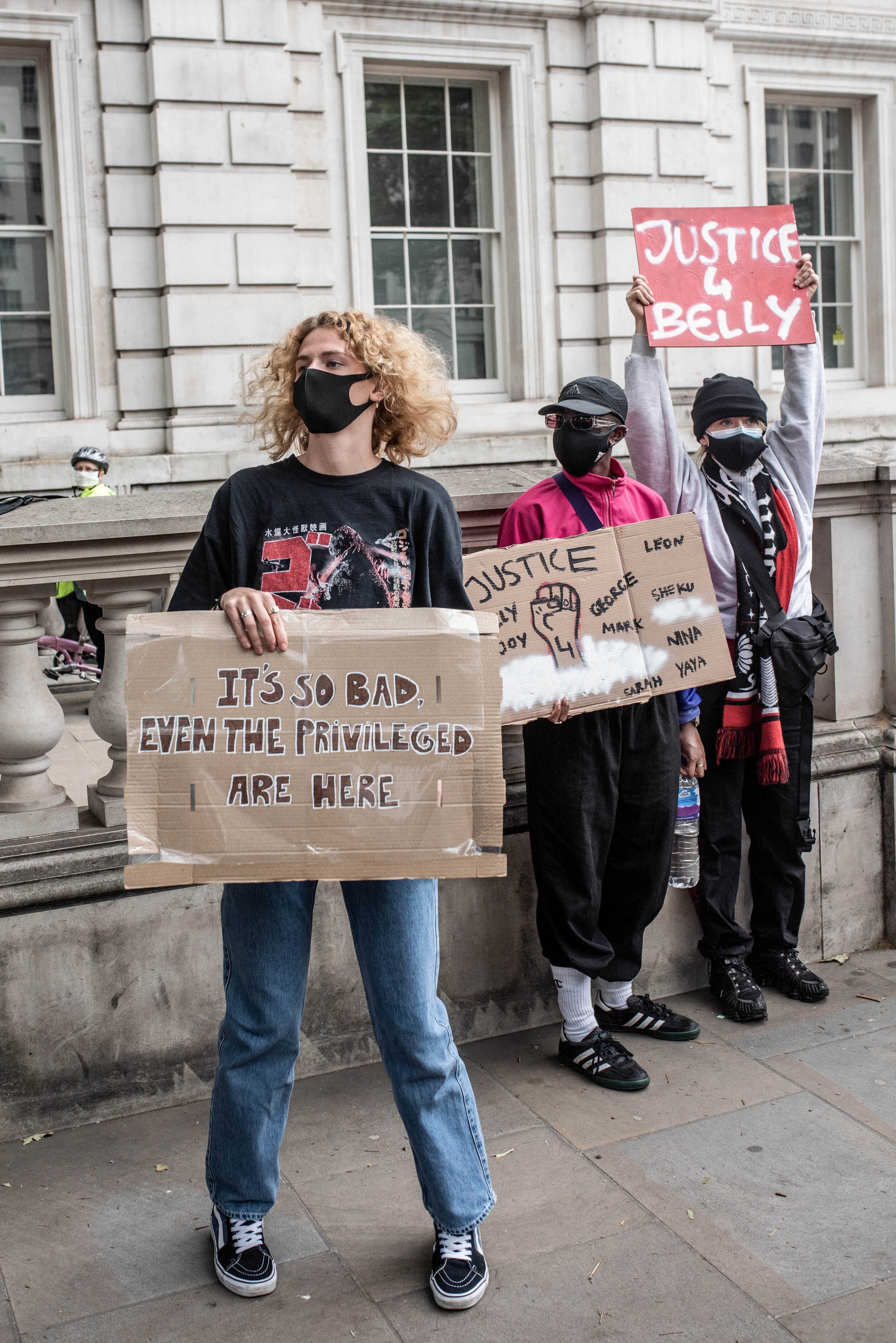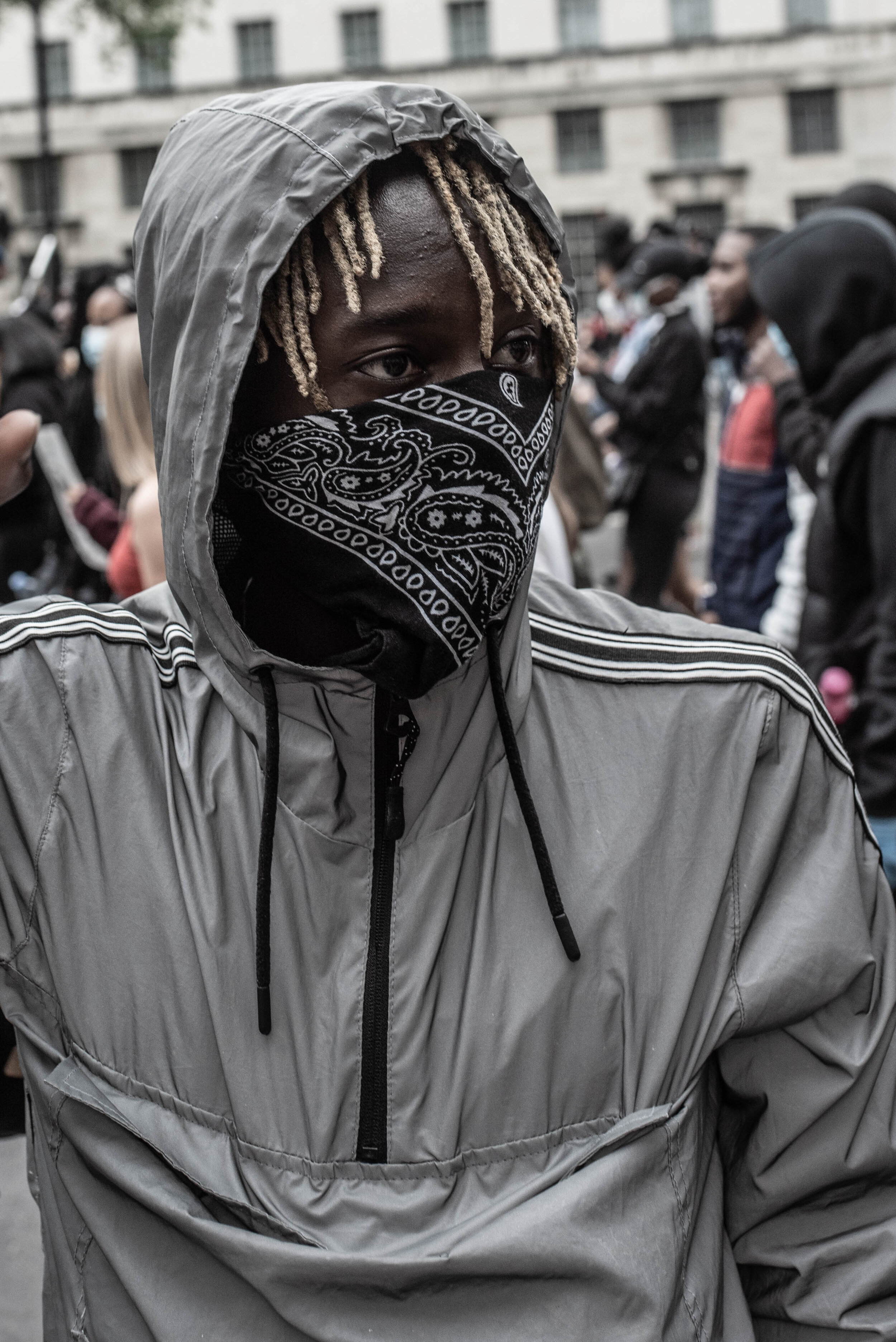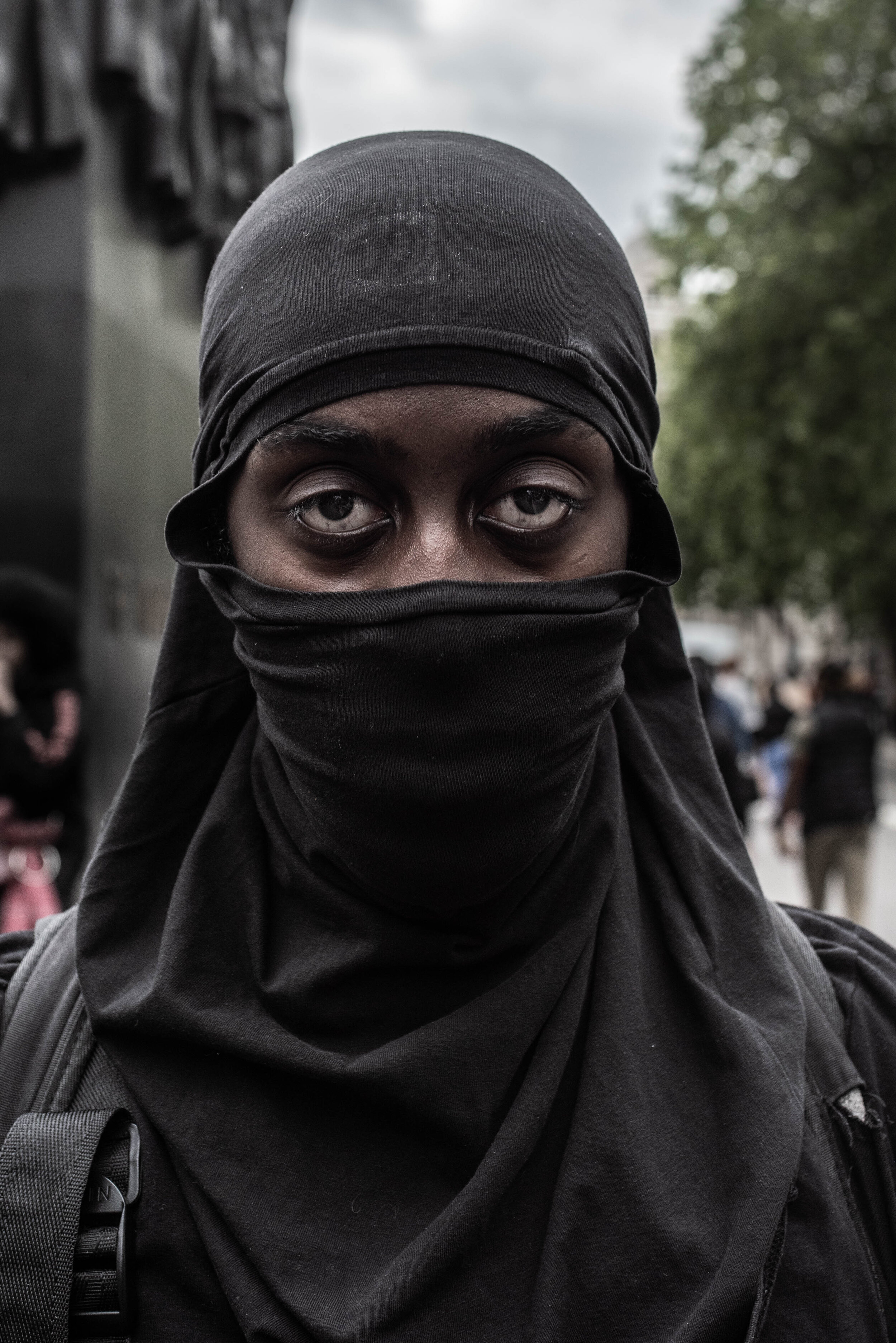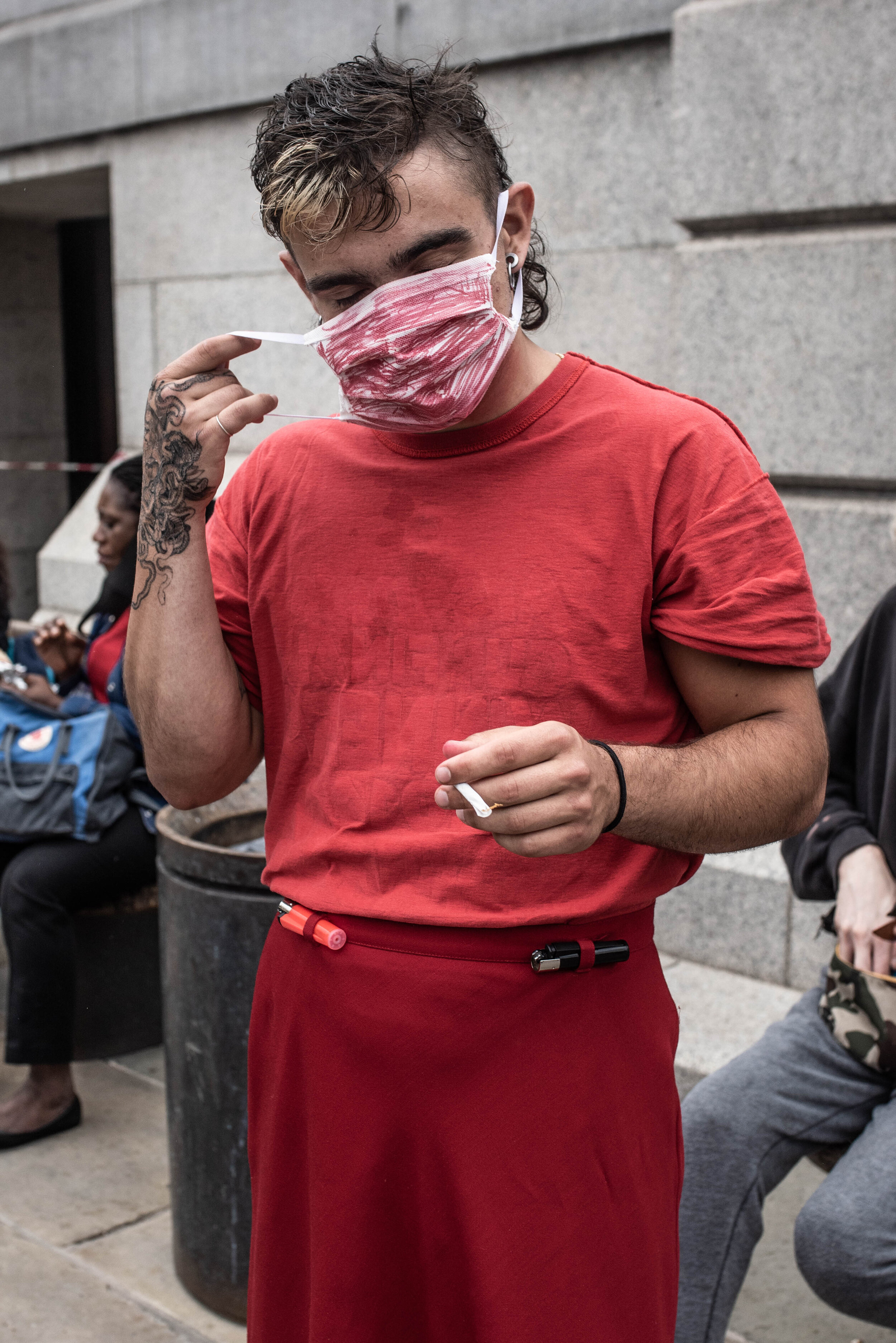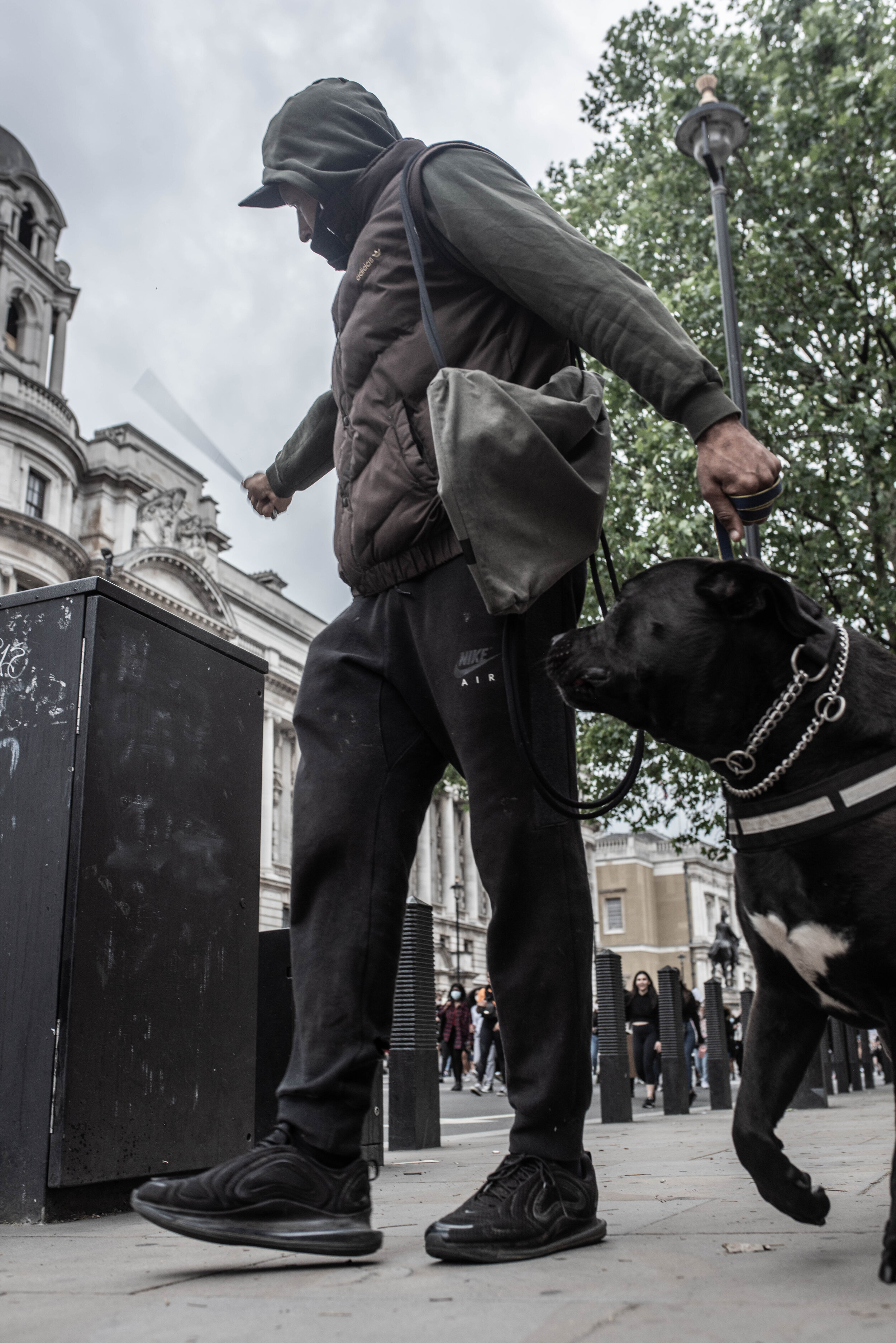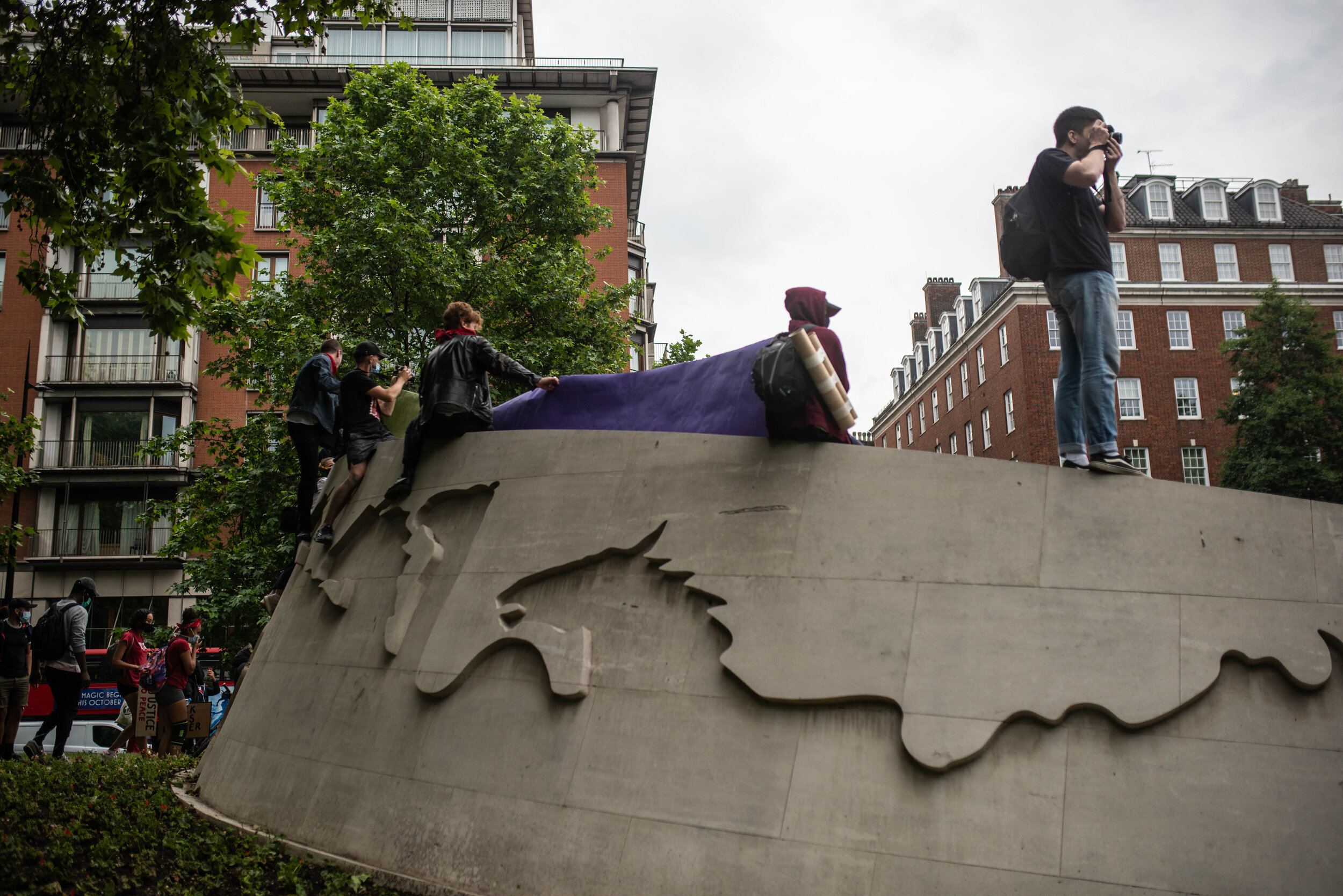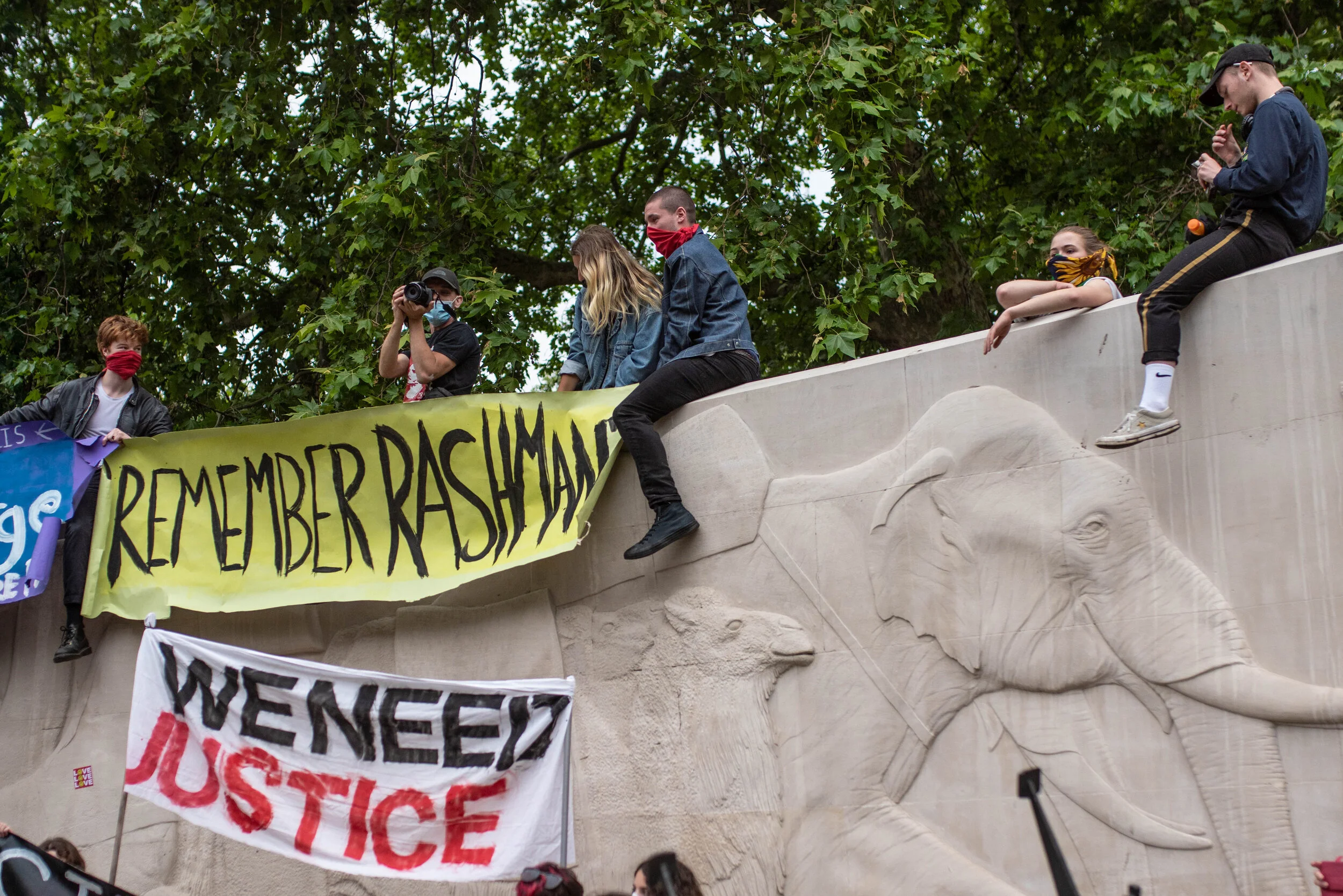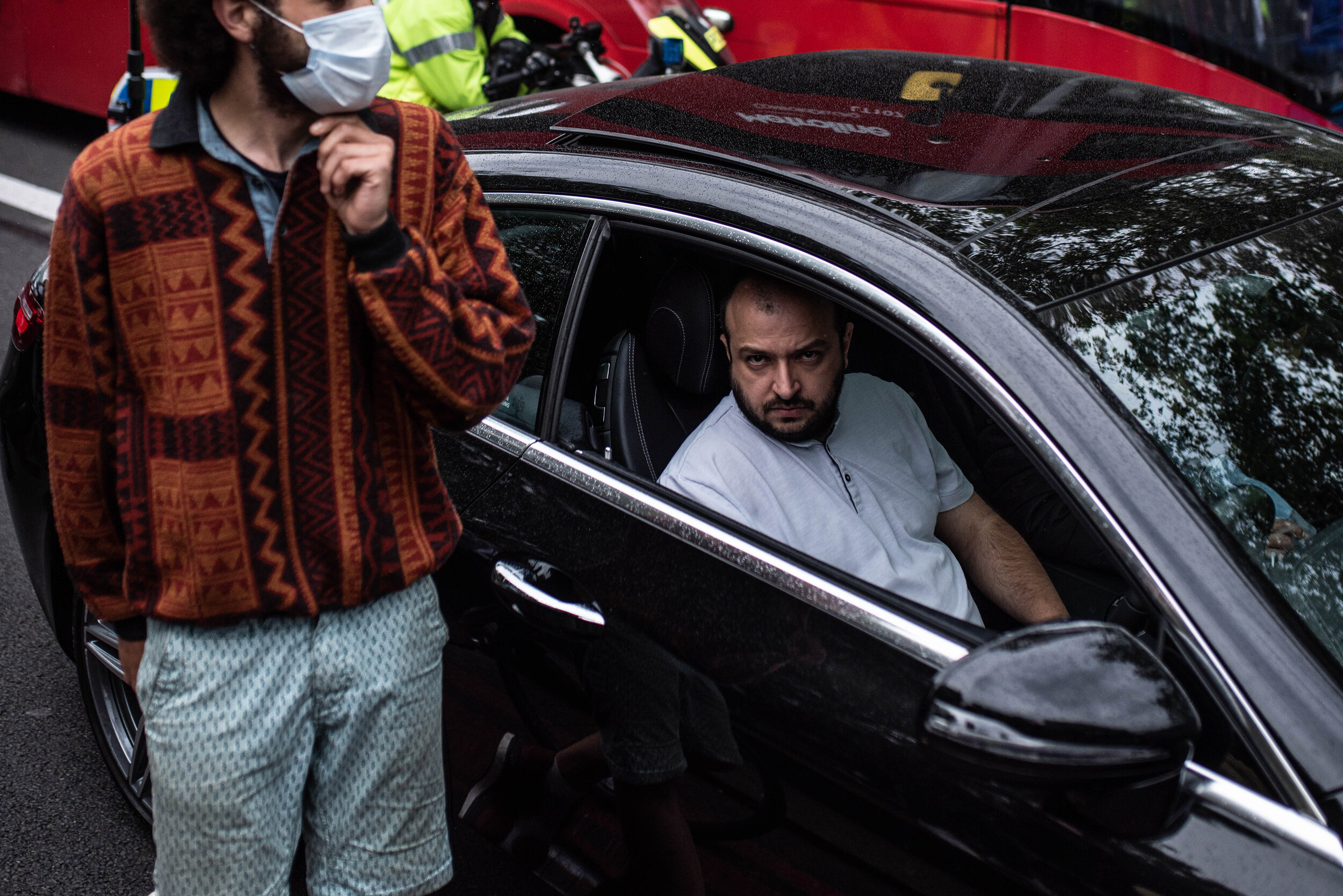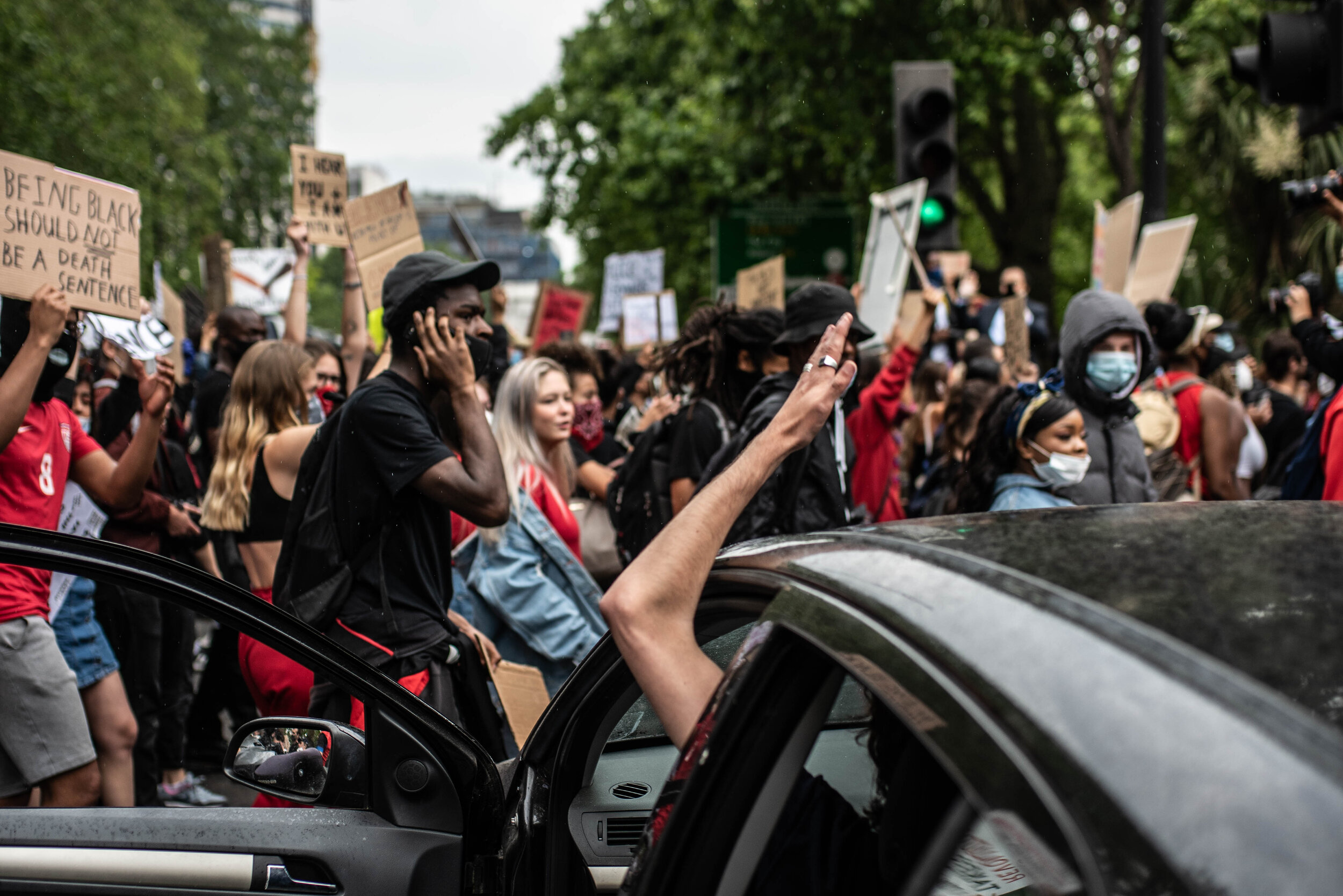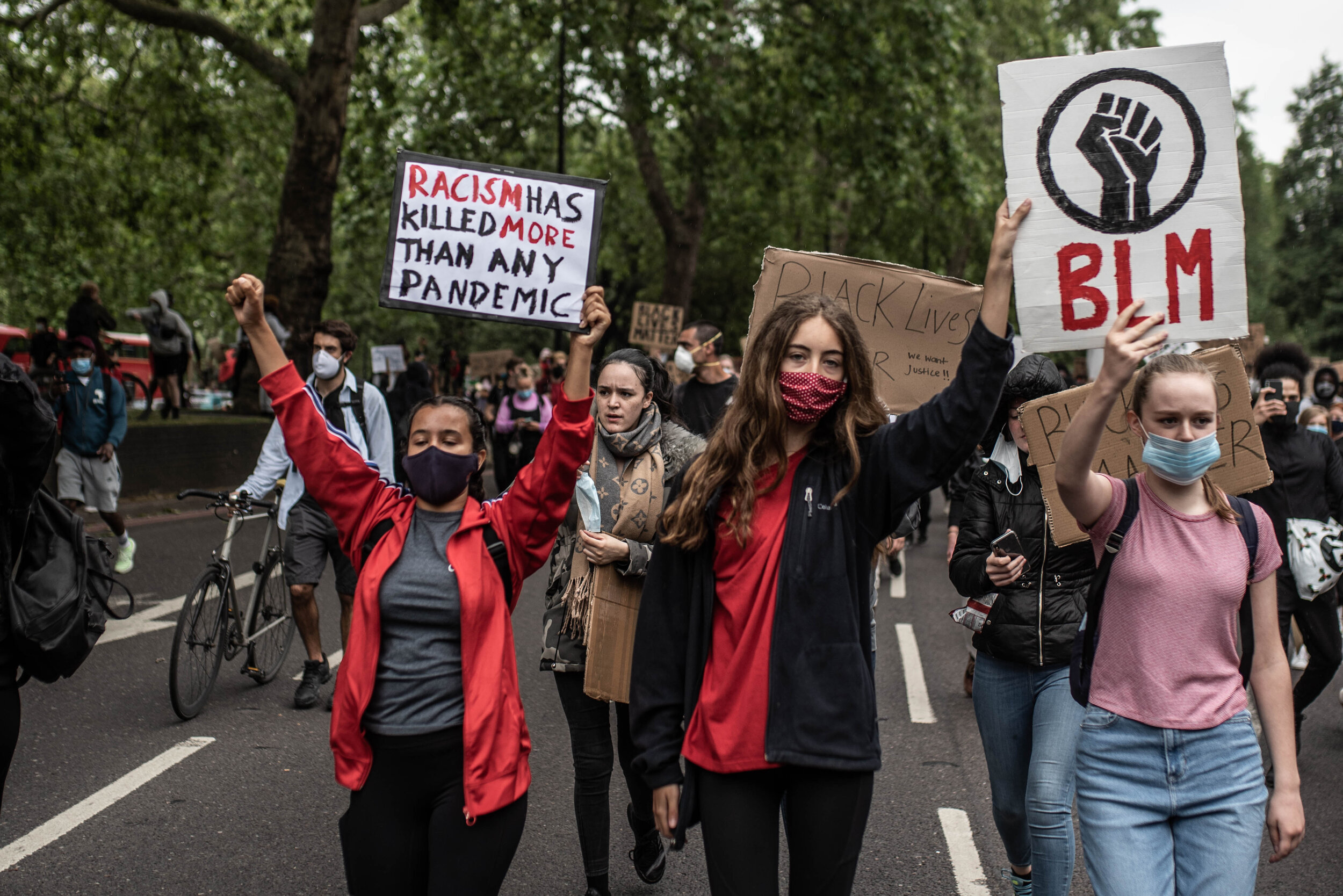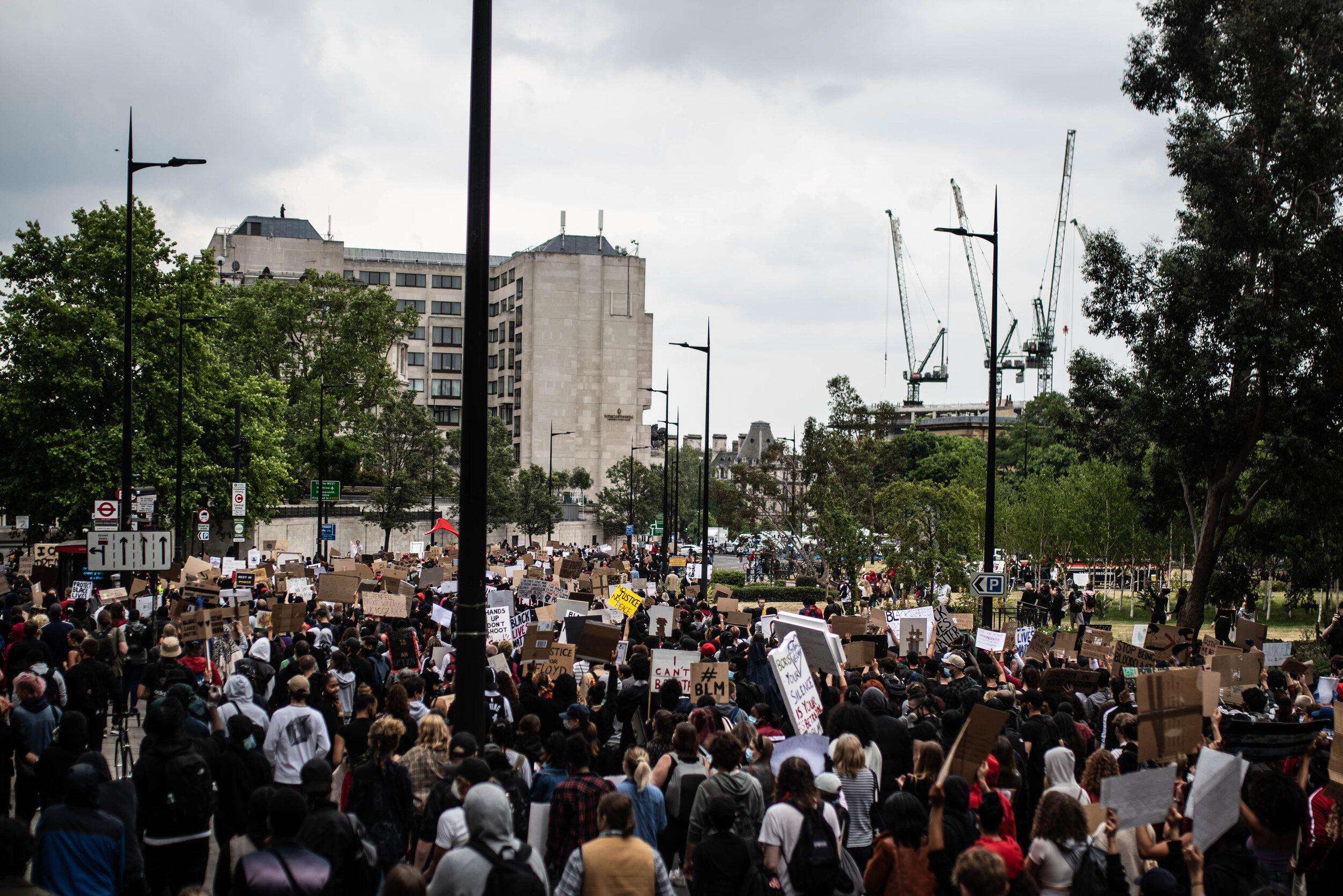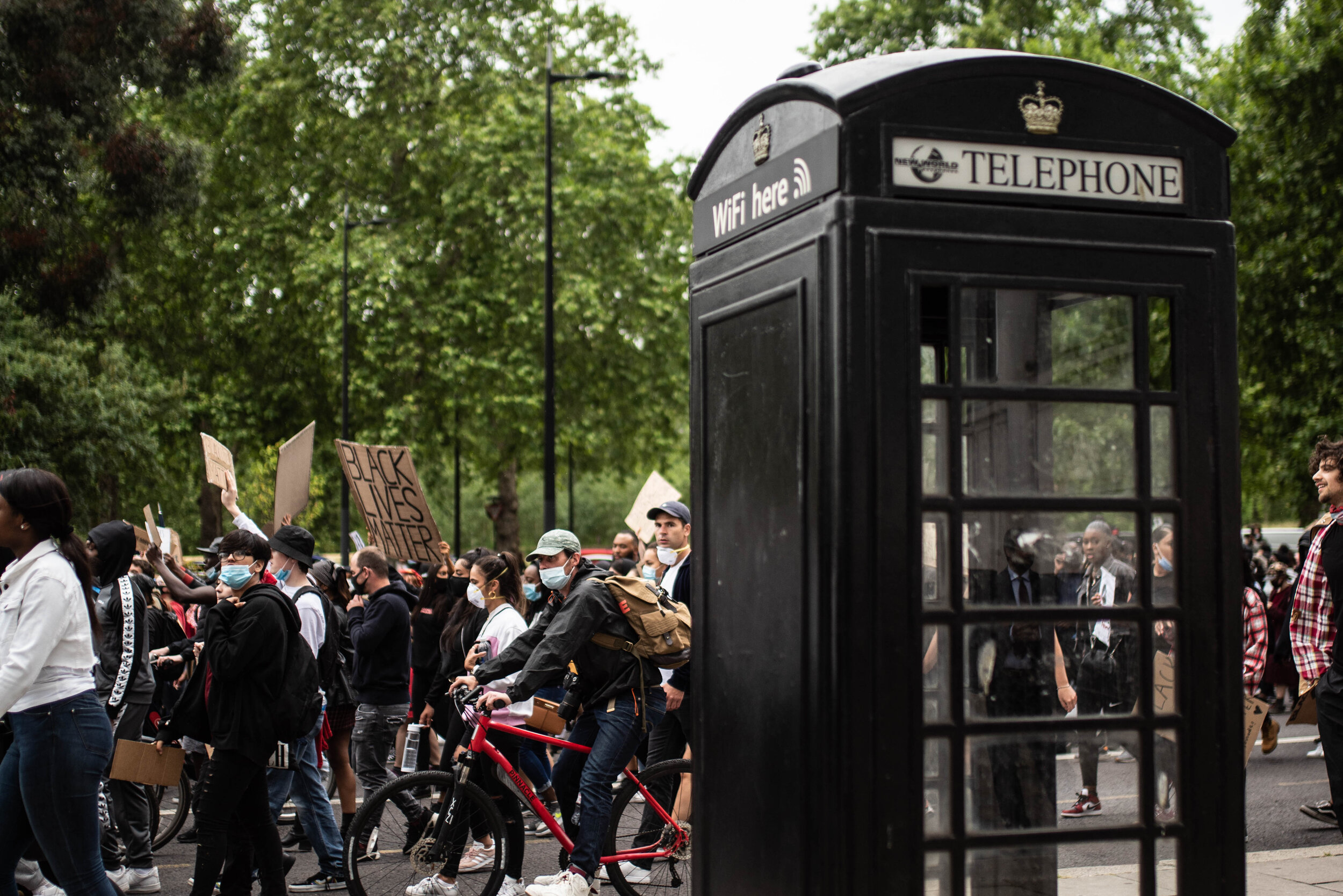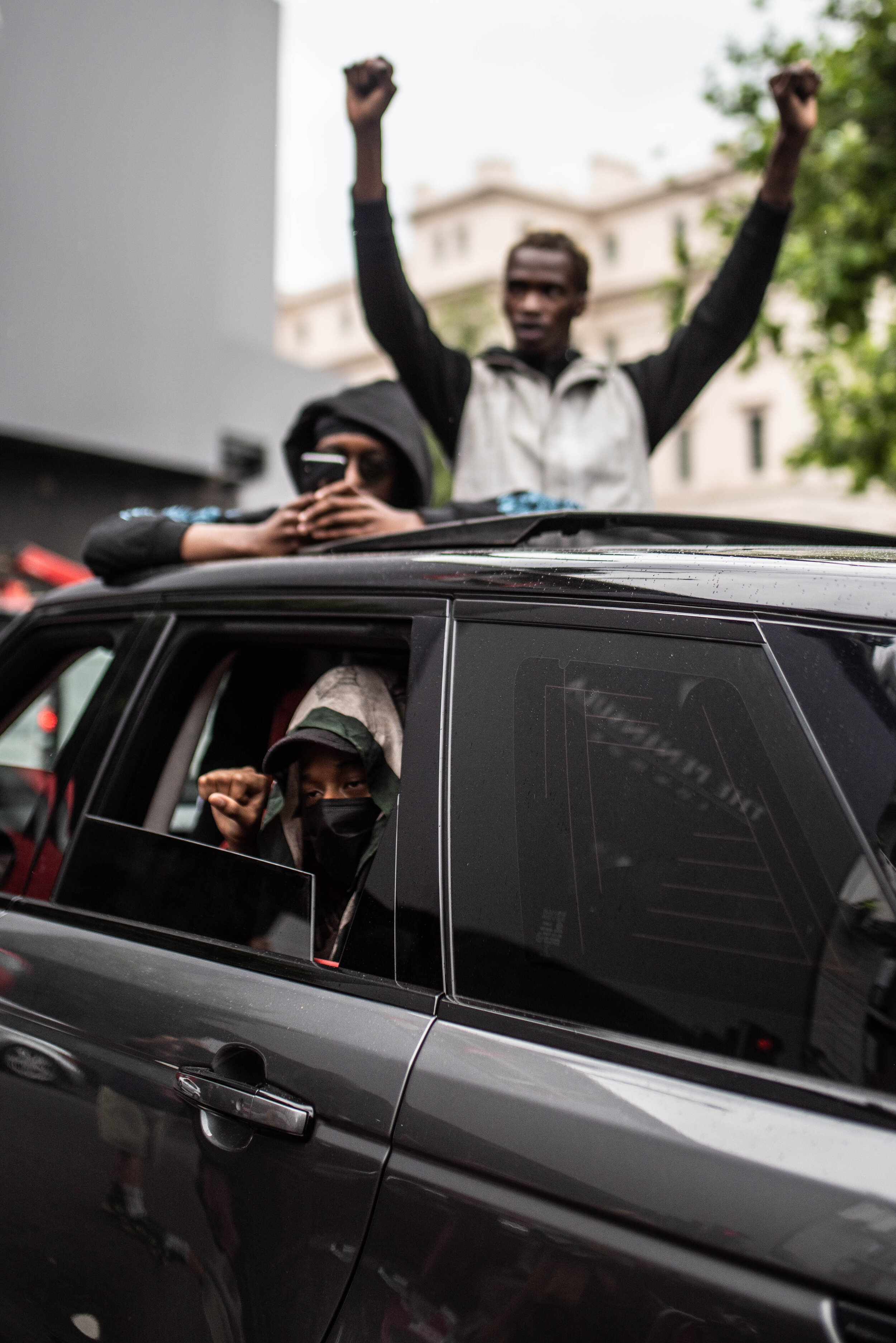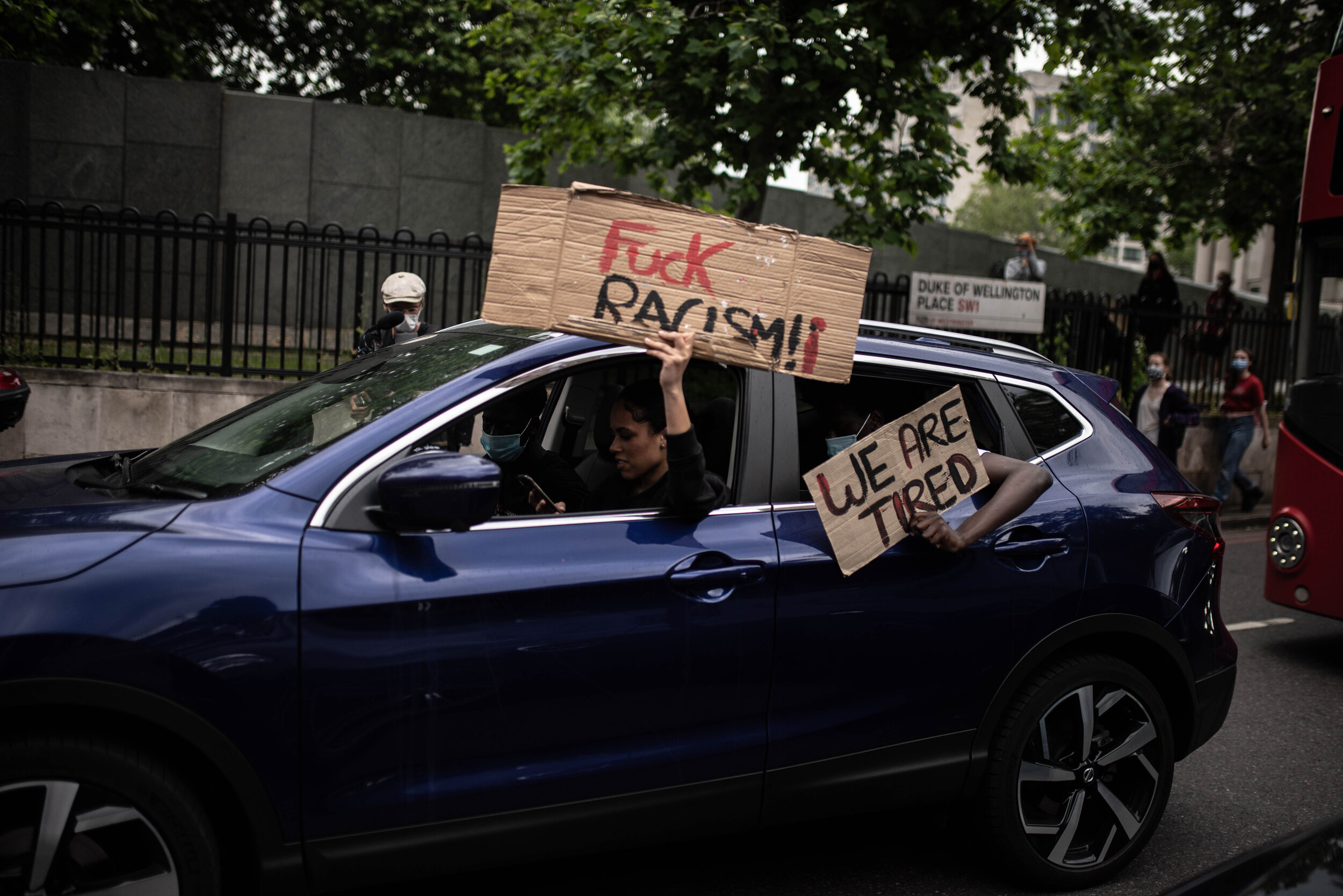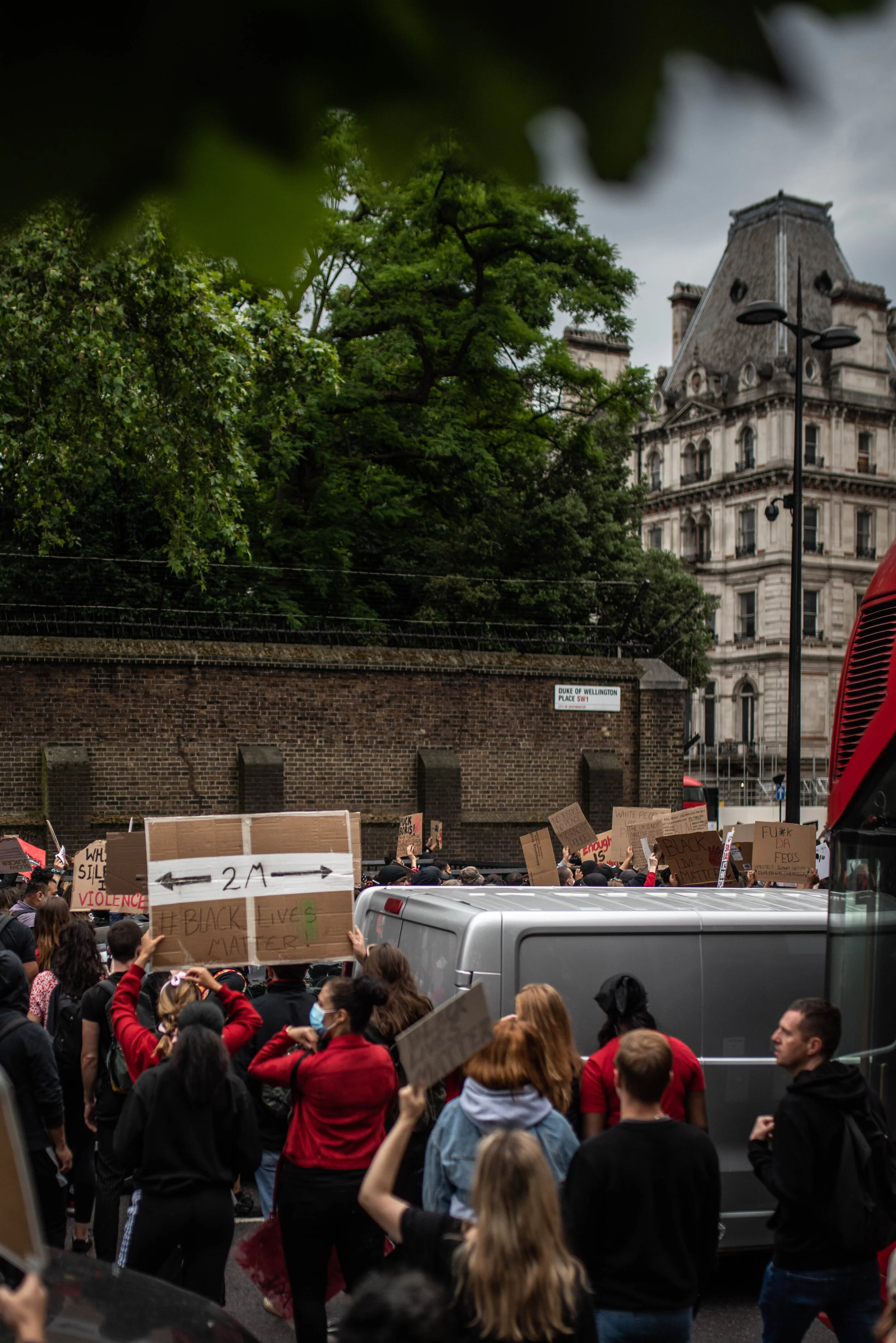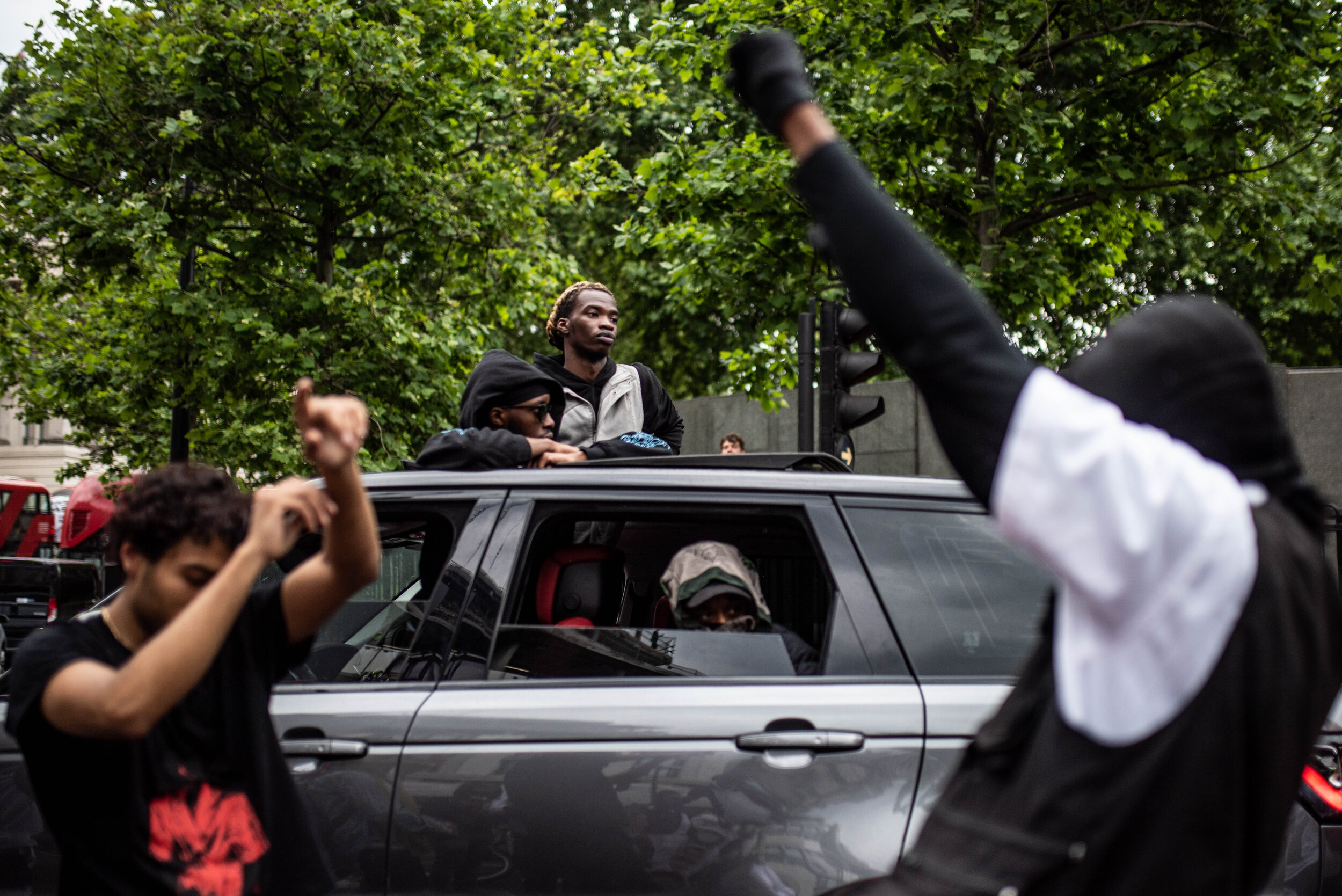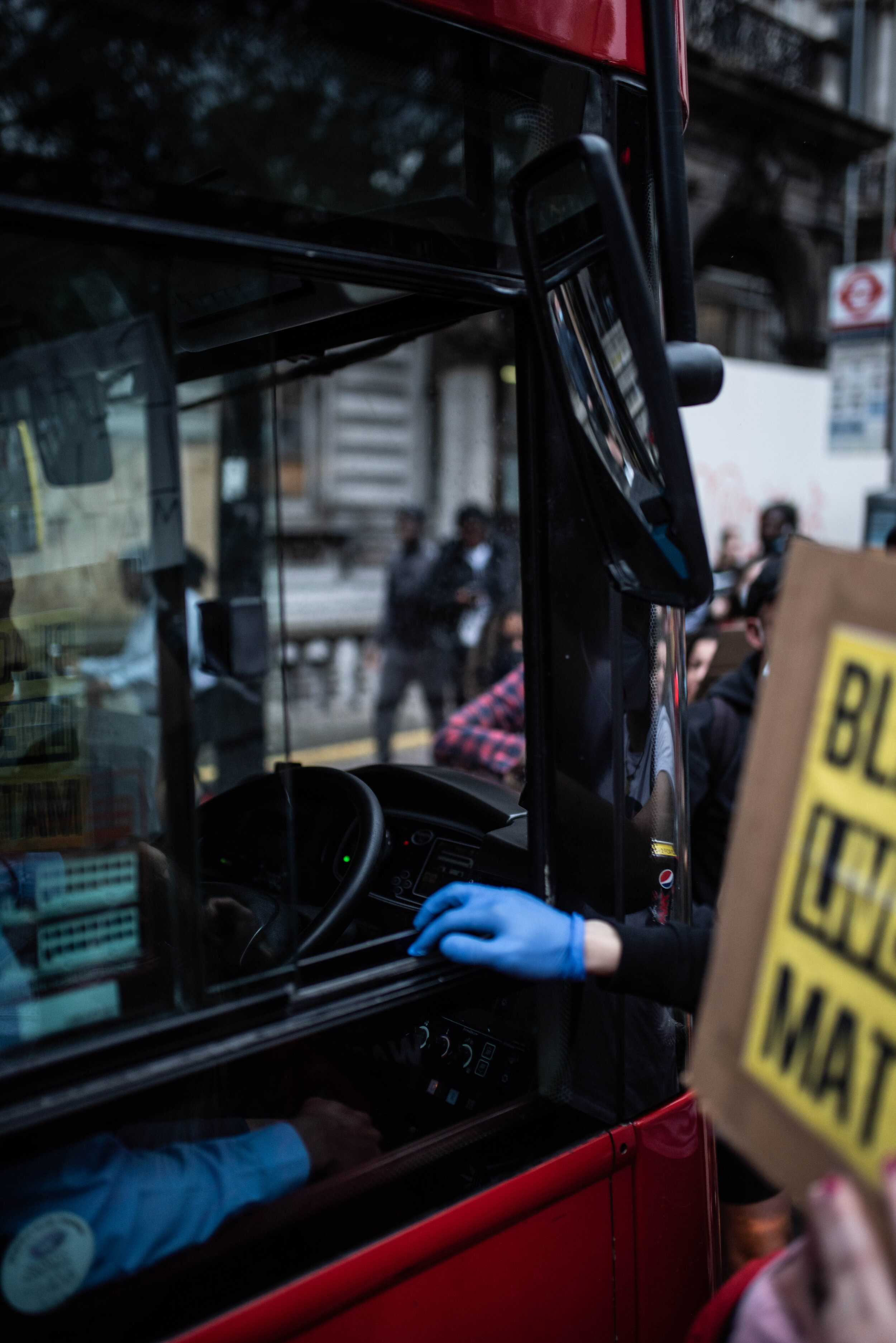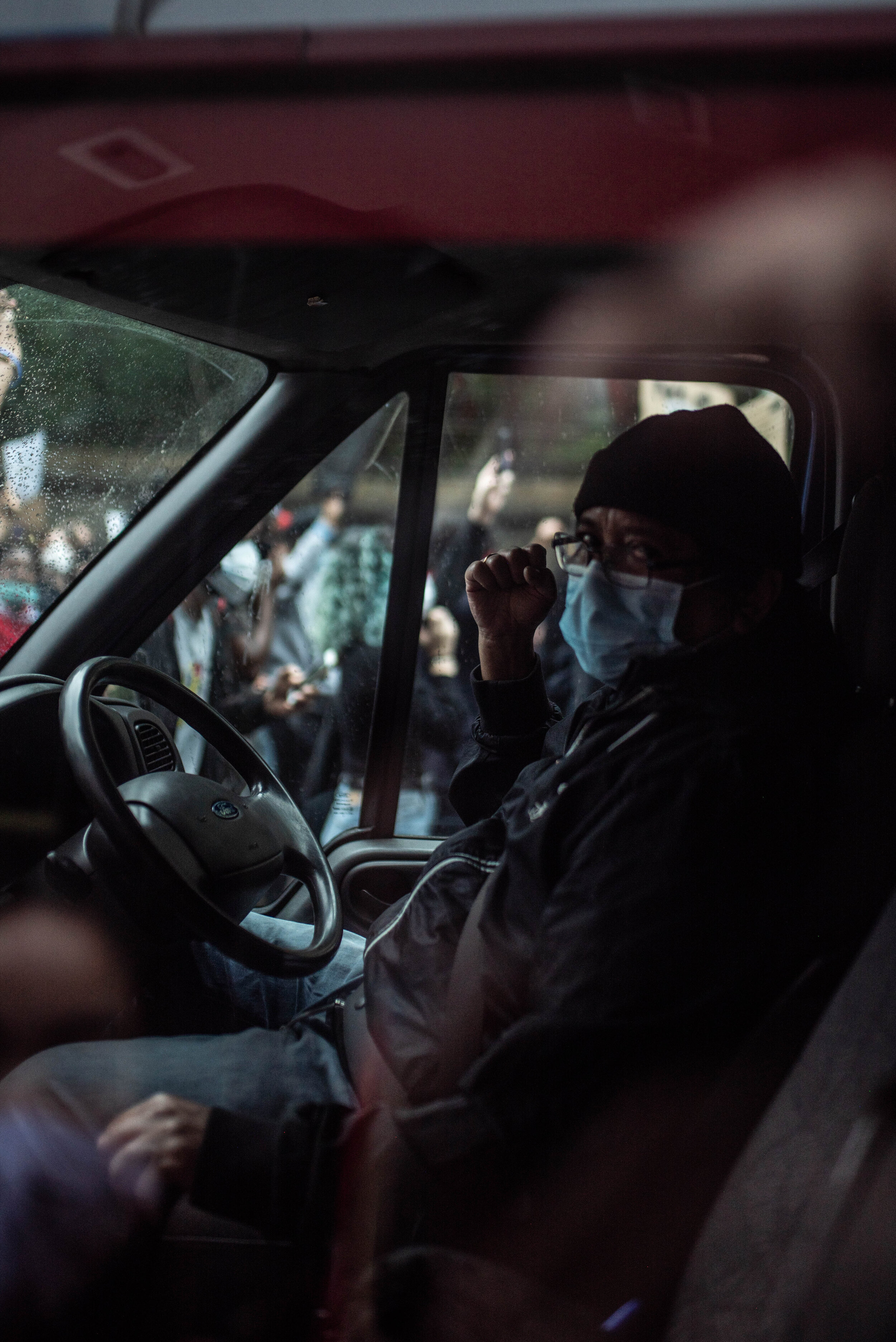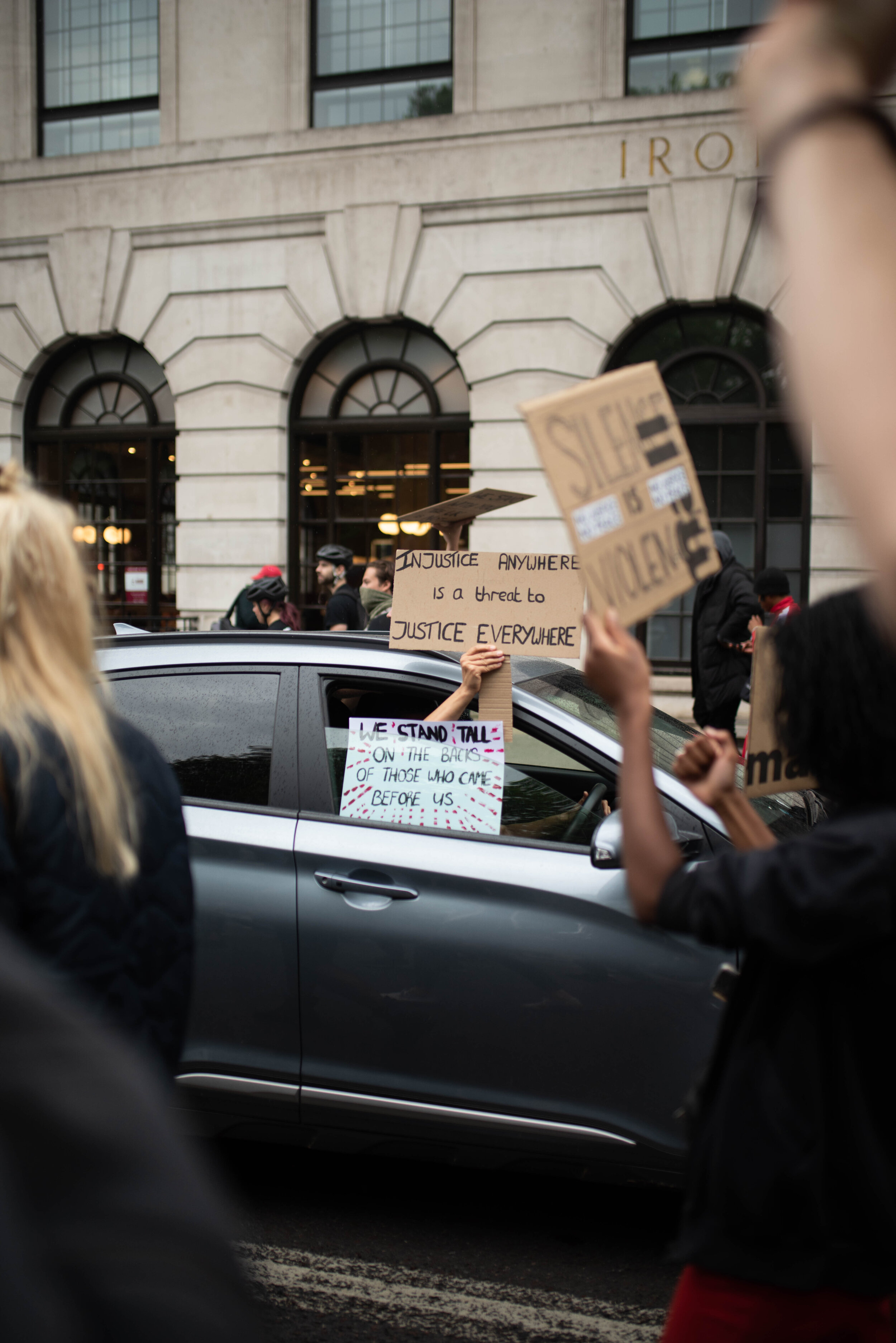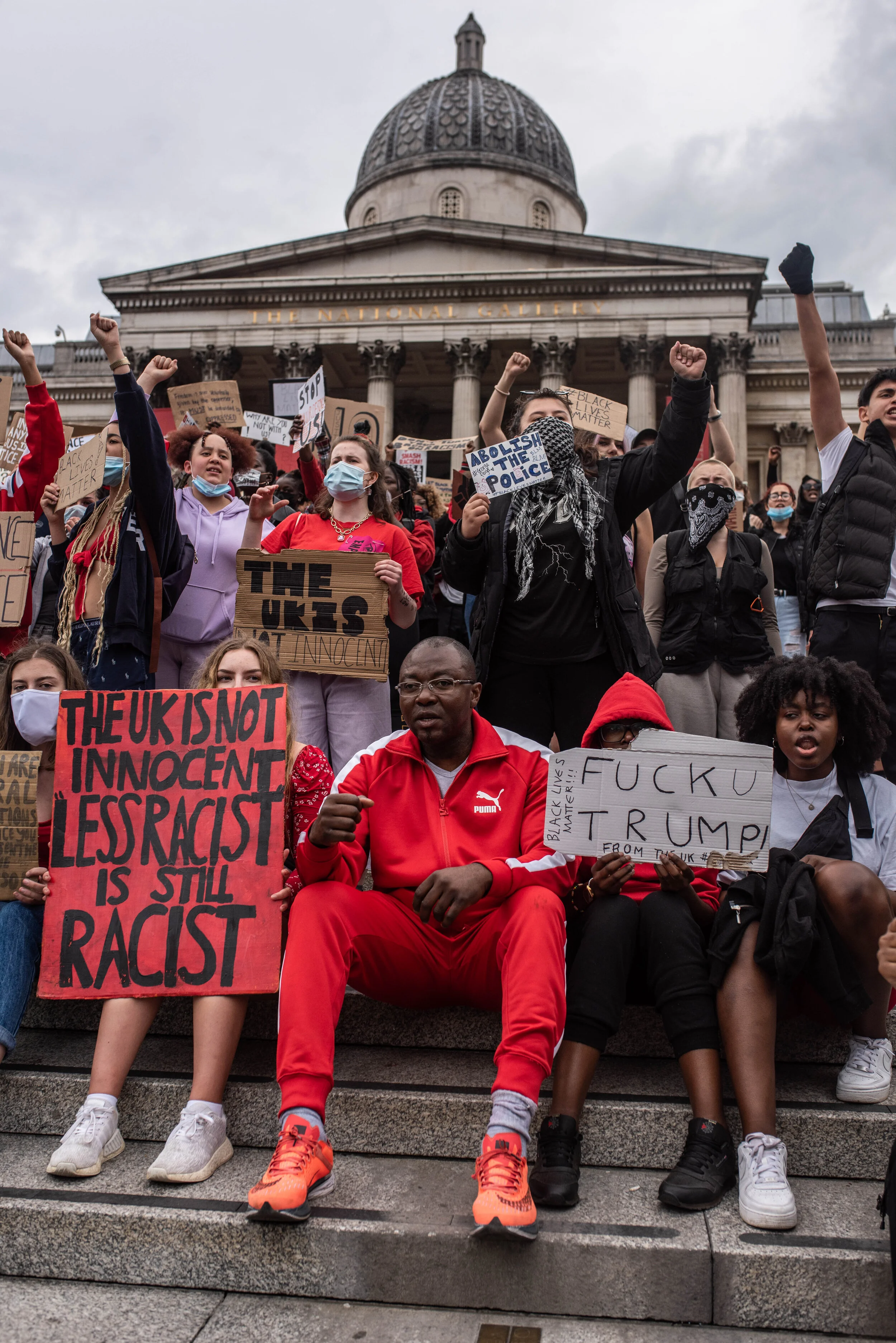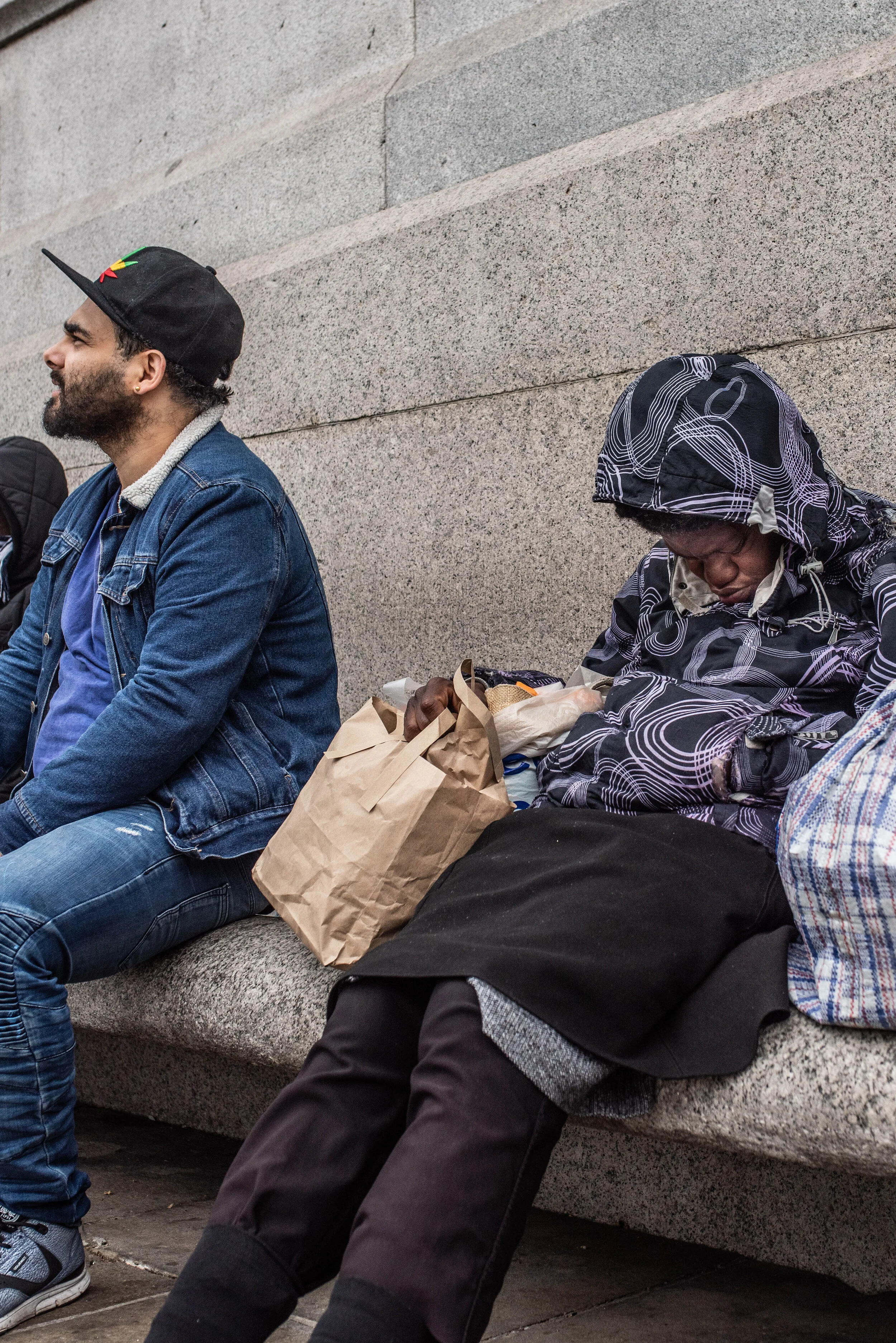I CAN’T BREATHE
Against the sickly backdrop of coronavirus and after seriously considering the ethicality and health risks involved in being surrounded by so many people, I decided early on the grey morning of Wednesday the 3rd of June to go to the BLM march in London. On an eerily empty train to Victoria, my reasoning and impetus for attending were mulling each other over among other swimming thoughts in my head. The sheer guilt of being in a tactile environment while the virus was still alive and well was the first difficulty. Yet regardless of that, I knew I was compelled photographically and journalistically to go, to see what people were saying about George Floyd’s death and how it related to the justice system/police authority in the UK.
A question I wanted an answer to in particular was why people thought the UK is ‘not innocent’. I took with me only my camera, had no sign or placard and bore no deep intention of truly becoming physically or verbally involved in what was taking place. I only wanted to see it for myself, to hear what protestors had to say and to capture it in photographs.
I had seen jostling protestors in videos of other recent demonstrations in London condemning the UK as guilty and ‘to blame’, which I found abstruse as surely the British police had nothing to do with the jurisdiction and operation of the police in America and therefore nothing to do with the death of George Floyd. I didn’t see reason in the animosity shown towards the British police. Seeing as they don’t carry weapons and only use guns when critically required to, it is blatant that the fabric of the British political and social government is cut from a very different cultural cloth to that of our cousins over the pond, where not only minorities must fear for their lives when they go out in public.
I also found it hard to understand the contention over black arrest and imprisonment rates being higher than that of white people in the UK (“black people were over 3 times as likely to be arrested as white people in 2017/18 – there were 35 arrests for every 1,000 black people, and 10 arrests for every 1,000 white people” [gov.uk]). Is the reason for inequality in arrest statistics just because of racism? Or could it possibly be due to an increased inclination for individuals among certain ethnic groups to turn to crime due to respective variations of socioeconomic stabilities and situations? By this I mean are black people more likely to commit a crime, and therefore be arrested, because of the situations they are birthed into as opposed to sheer racism?
I sought answers through observation on that day, and through subsequent research online.
I arrived at Marble Arch Station for just after 13:00PM and was met with a hubbub bubbling from cheery throngs of people that became thicker, louder and less socially-distanced towards the fields of Hyde Park. Police riot vans and vehicles punctuated the forecourt of the station and groups of officers were patrolling the perimeter of protesting groups everywhere.
There was huge police attendance, I think they were preparing for the worst (considering the impact of the Tottenham 2011 riots, which began after a police car was smashed, the bristling presence was not surprising).
The macabre procession of bodies adorned with black and red slowly began throbbing intimately around Hyde Park and then through the scanty streets of London like a funeral march, conveying with their colours and chants the blood and blackness of Floyd’s death and treatment. Calls and refrains of “I can’t breathe”, “The UK is not innocent” and “say his name” were shouted so loudly and fervently throughout the day as to throw them up and imprint them into the sombre canopy of clouds covering London, in unanimity with groups meeting around the world. On multiple occasions the rhetoric and uplifting lexis of the speakers made my hair stand up on end and of course made my finger clamp down on the shutter button of my camera to capture the emotions tangible there.
Pictures of the crowds:
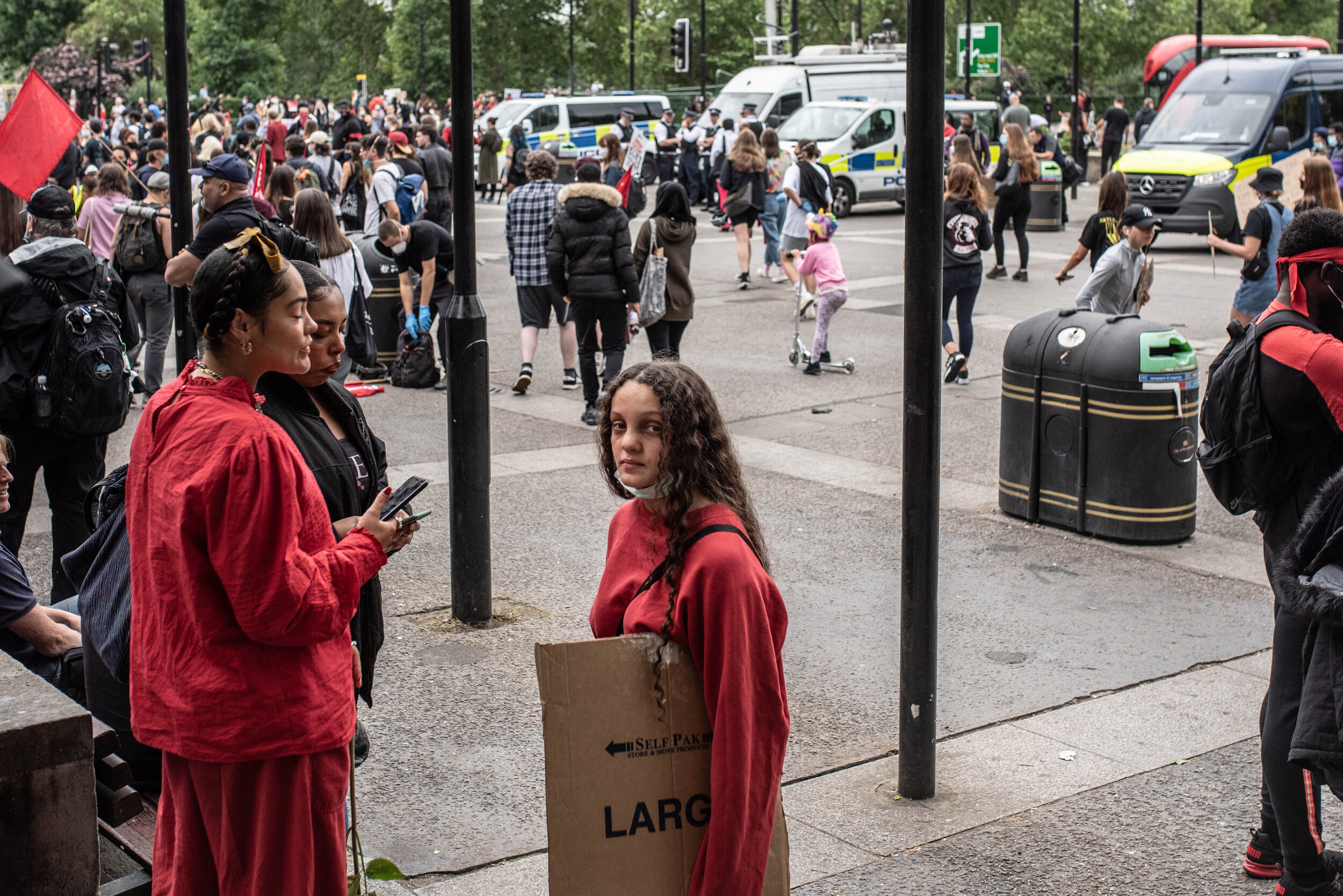
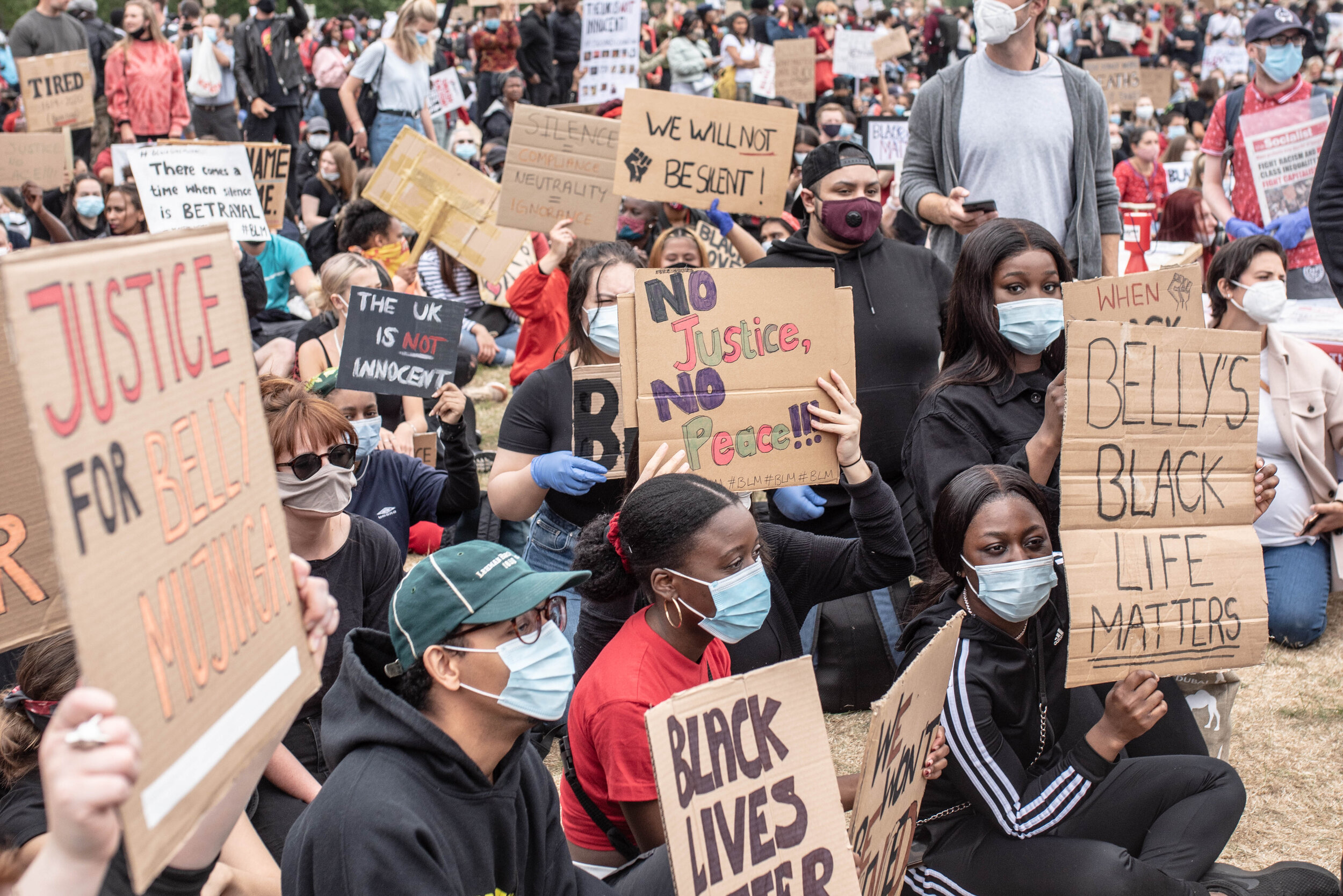
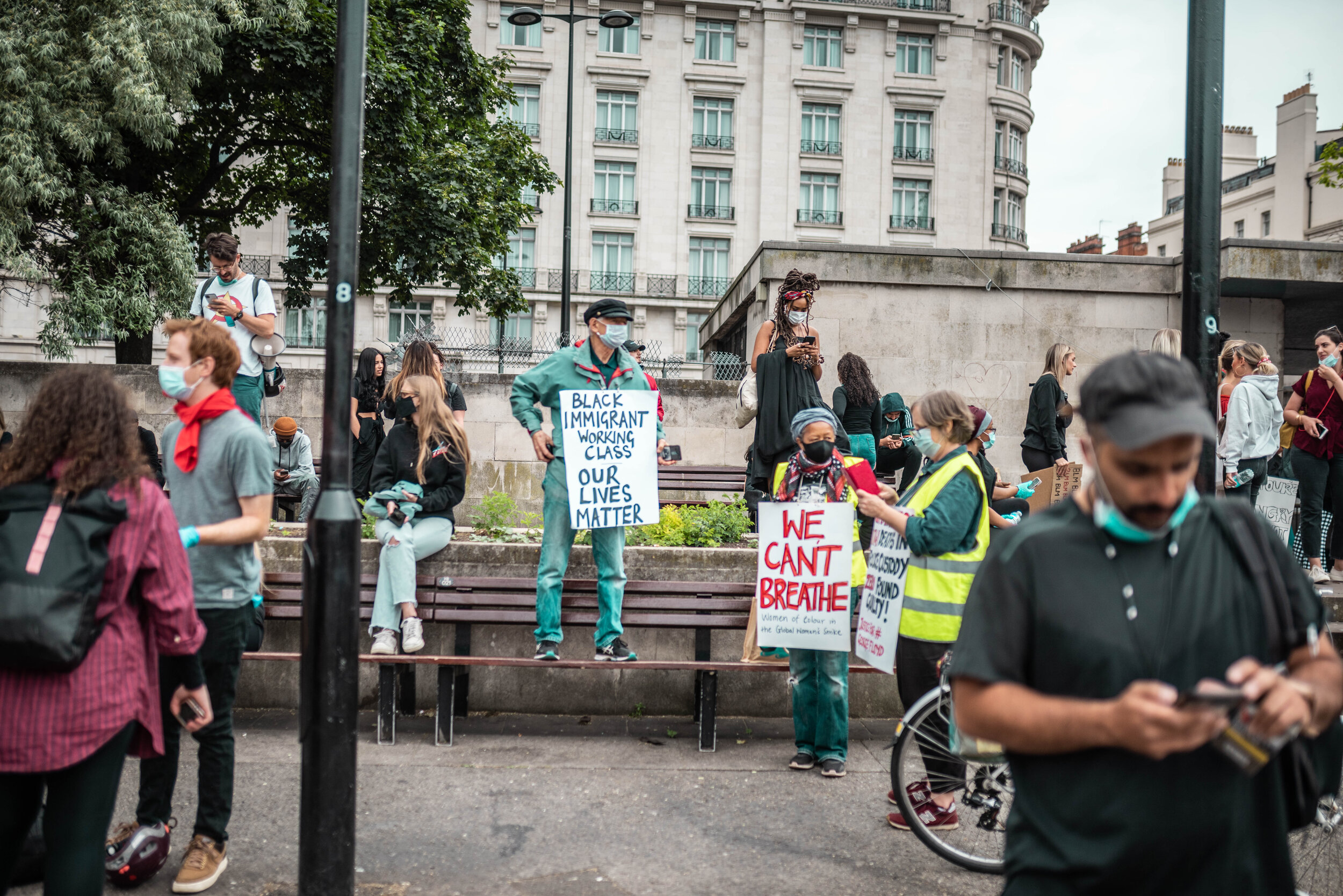

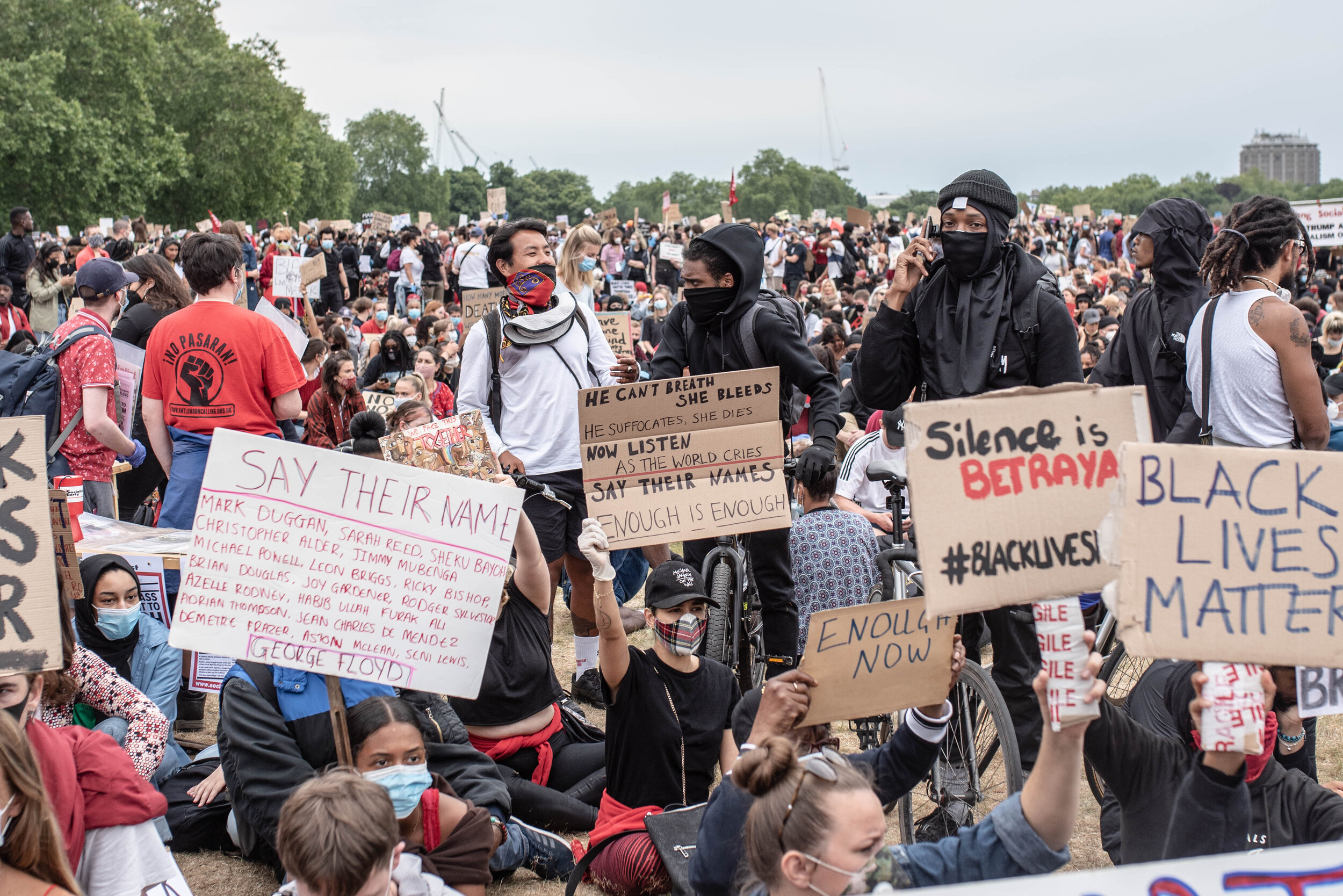
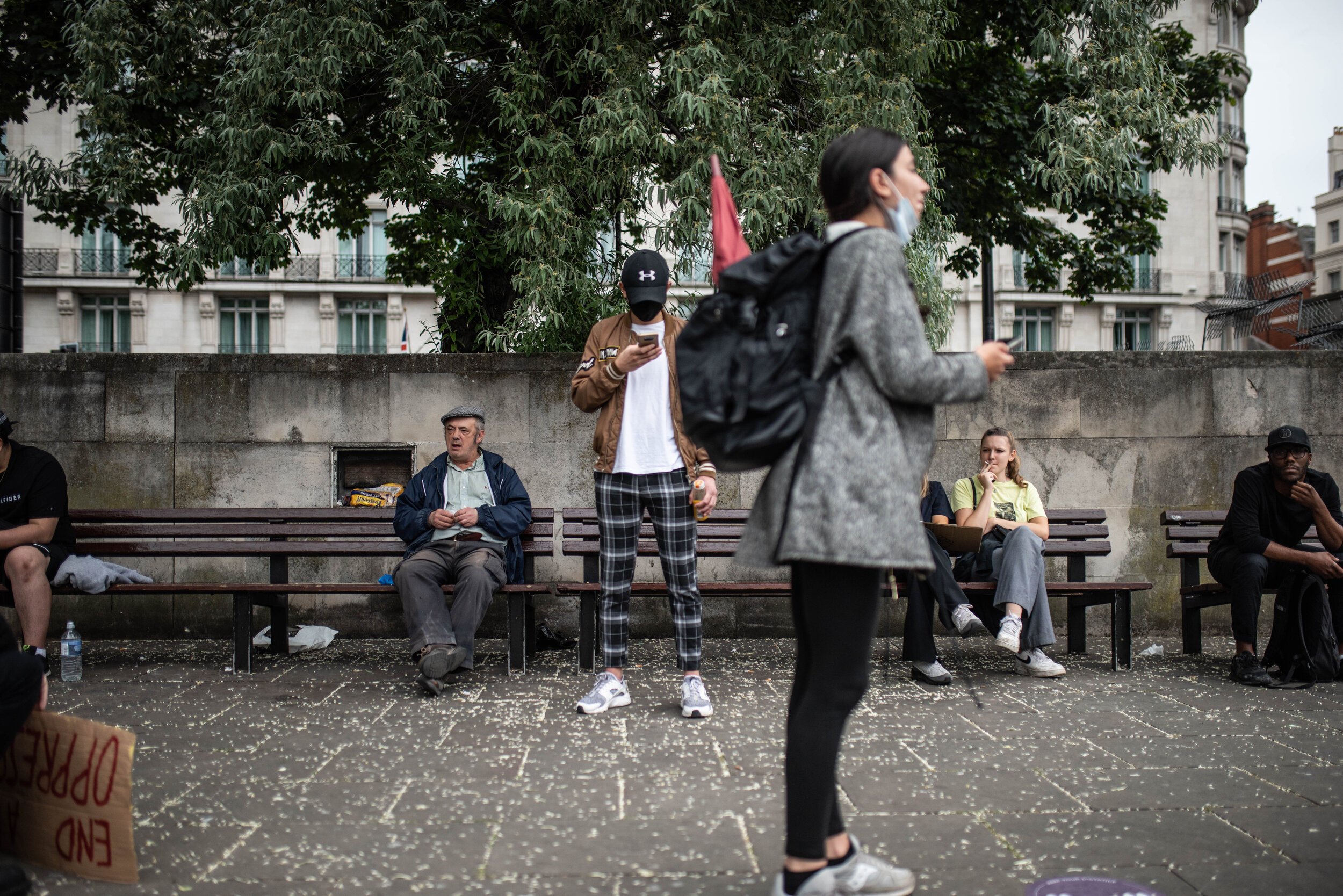
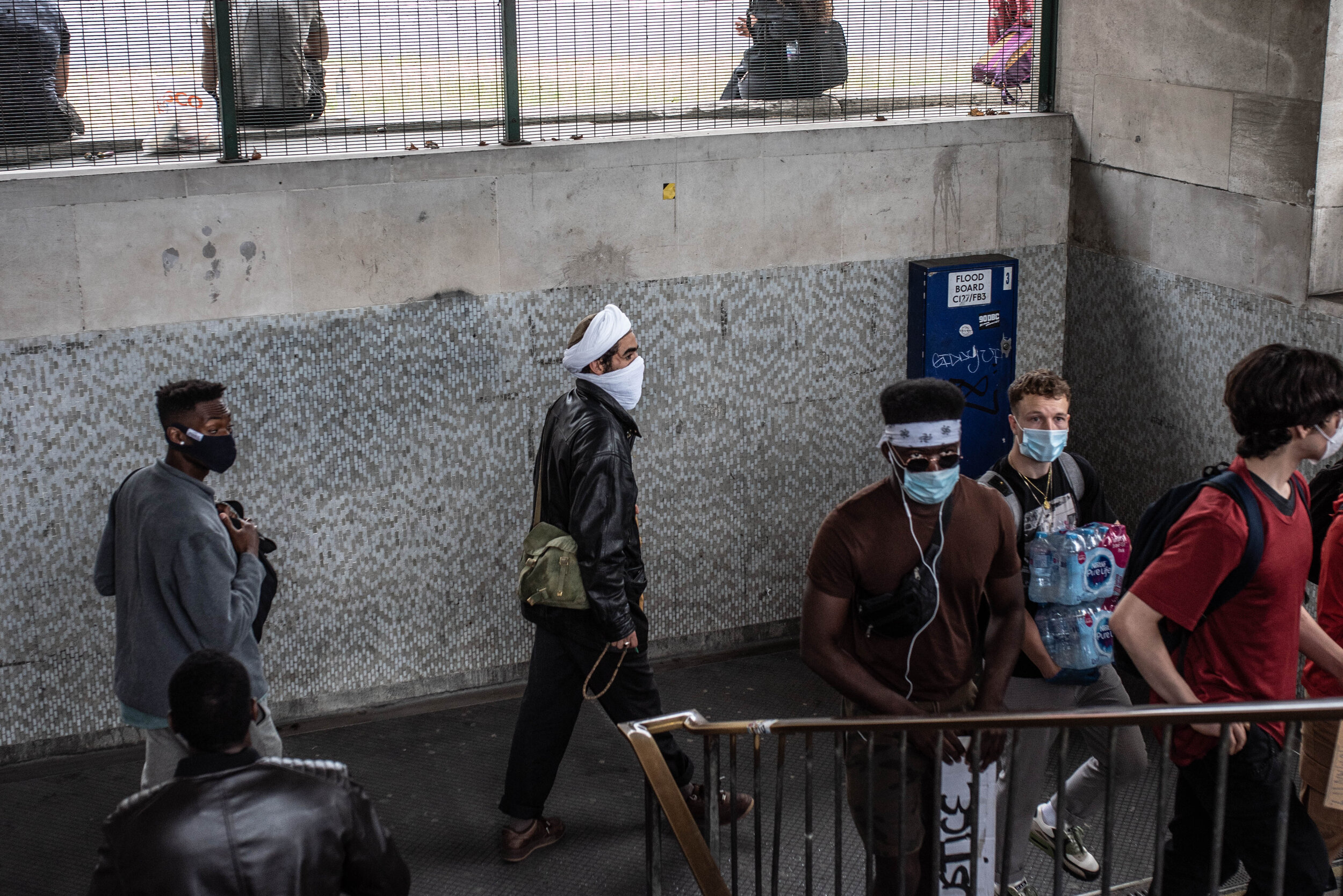
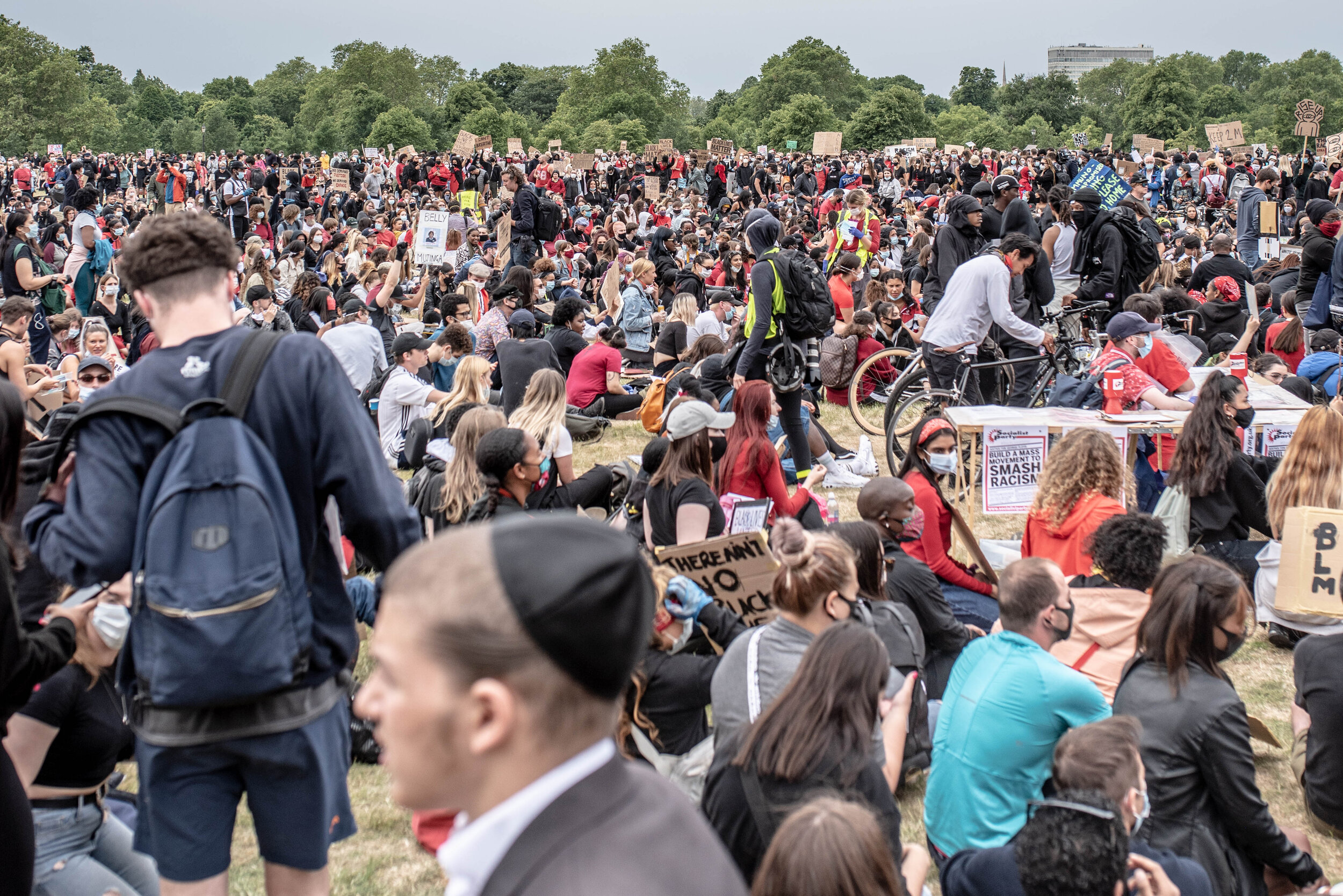
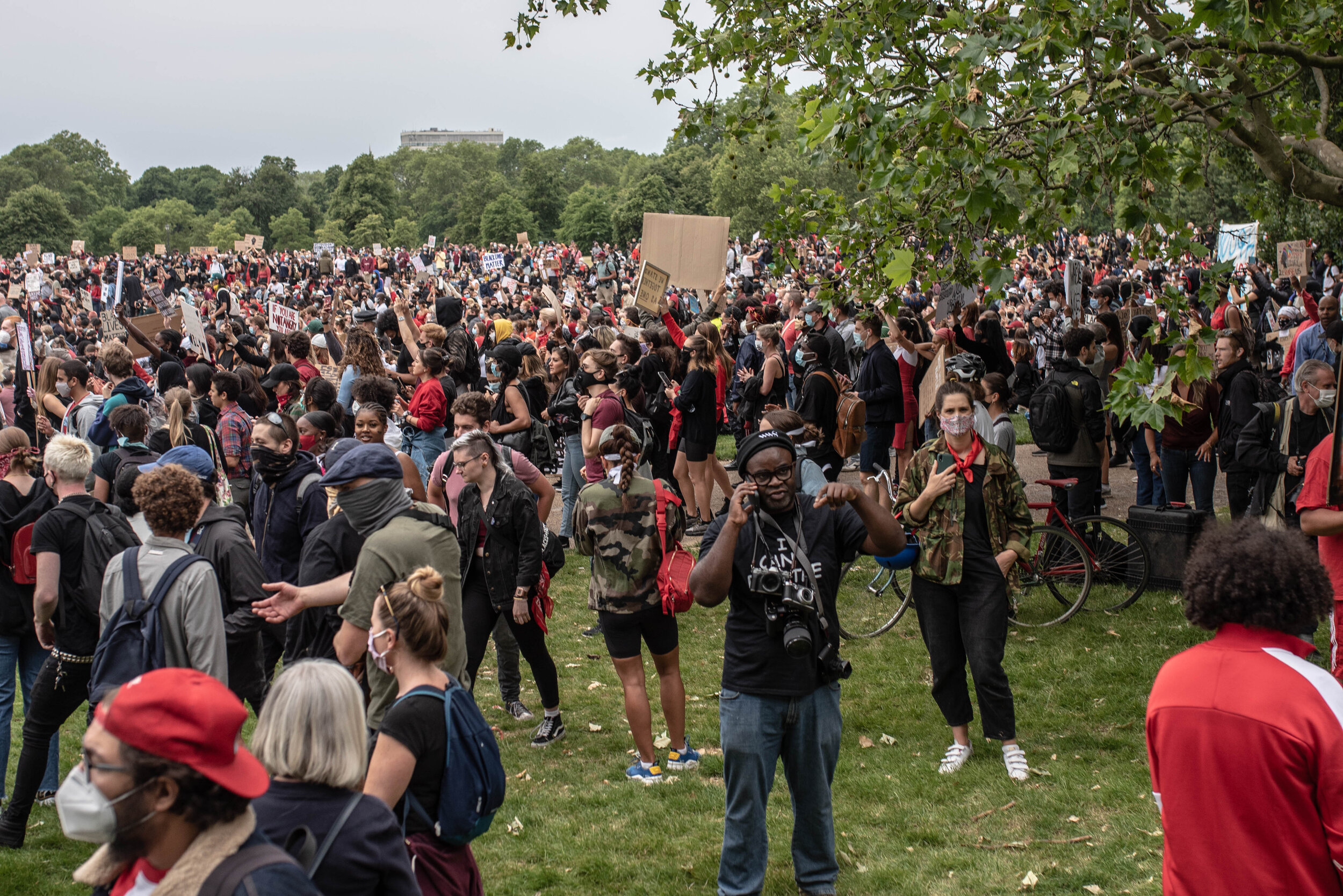
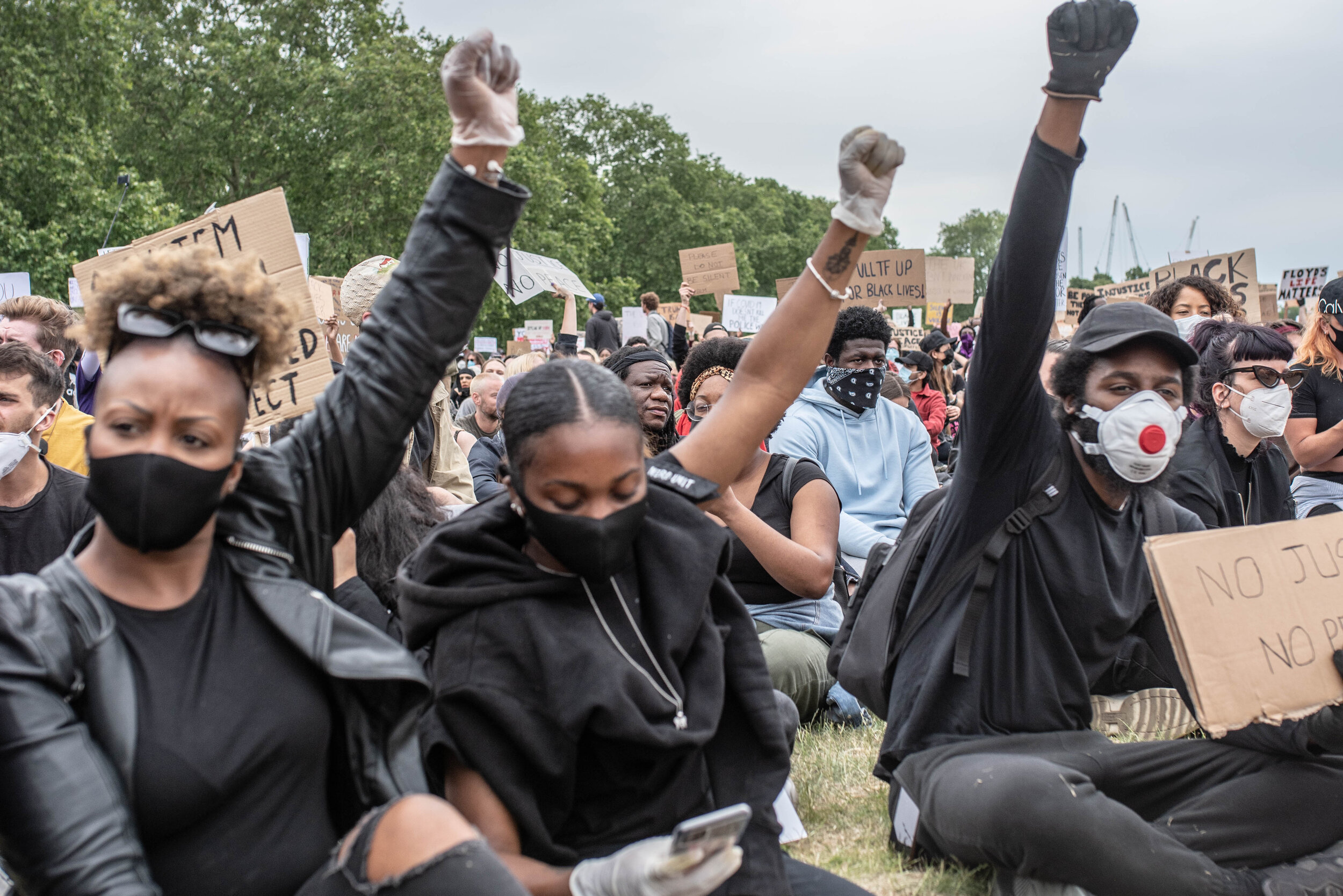
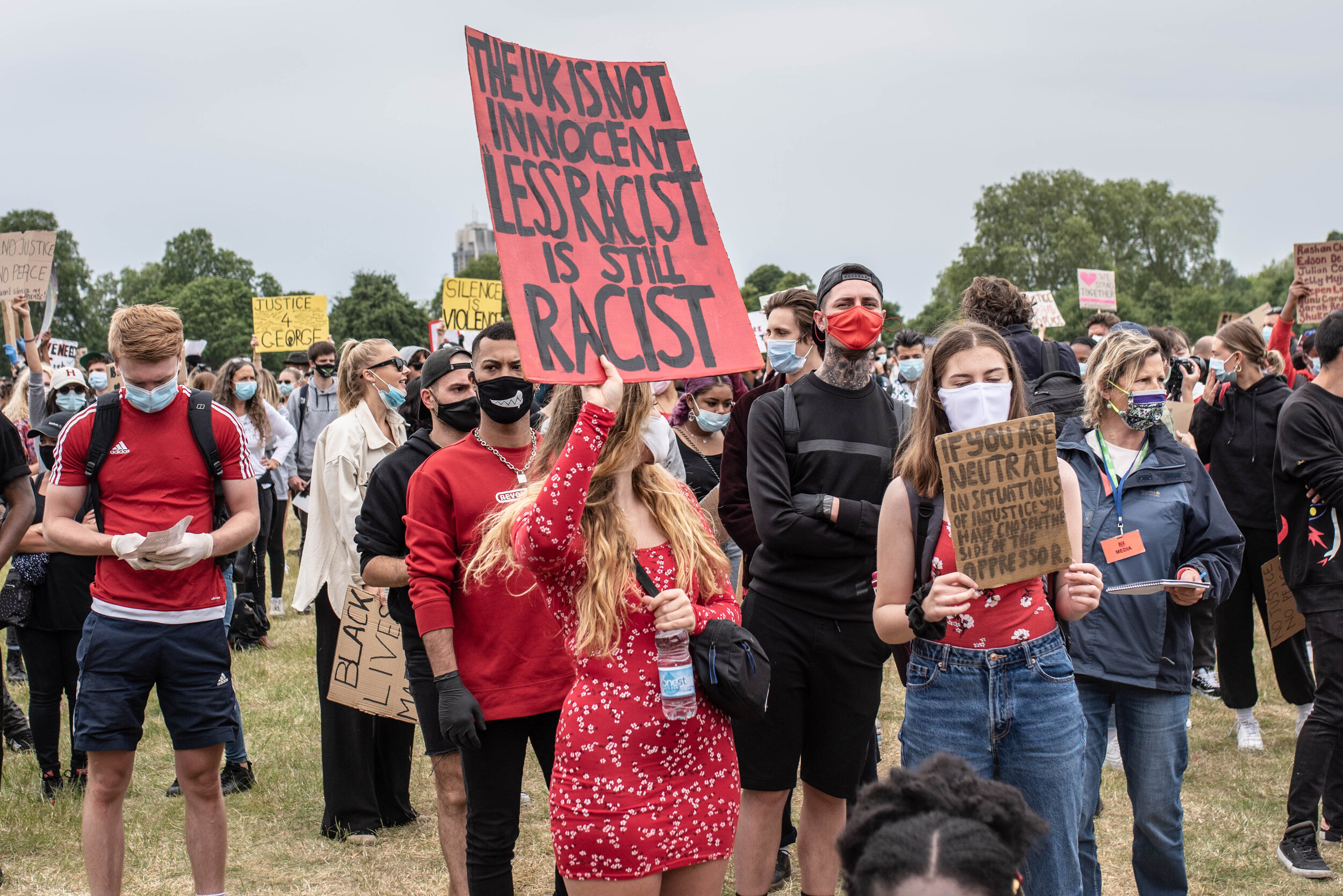
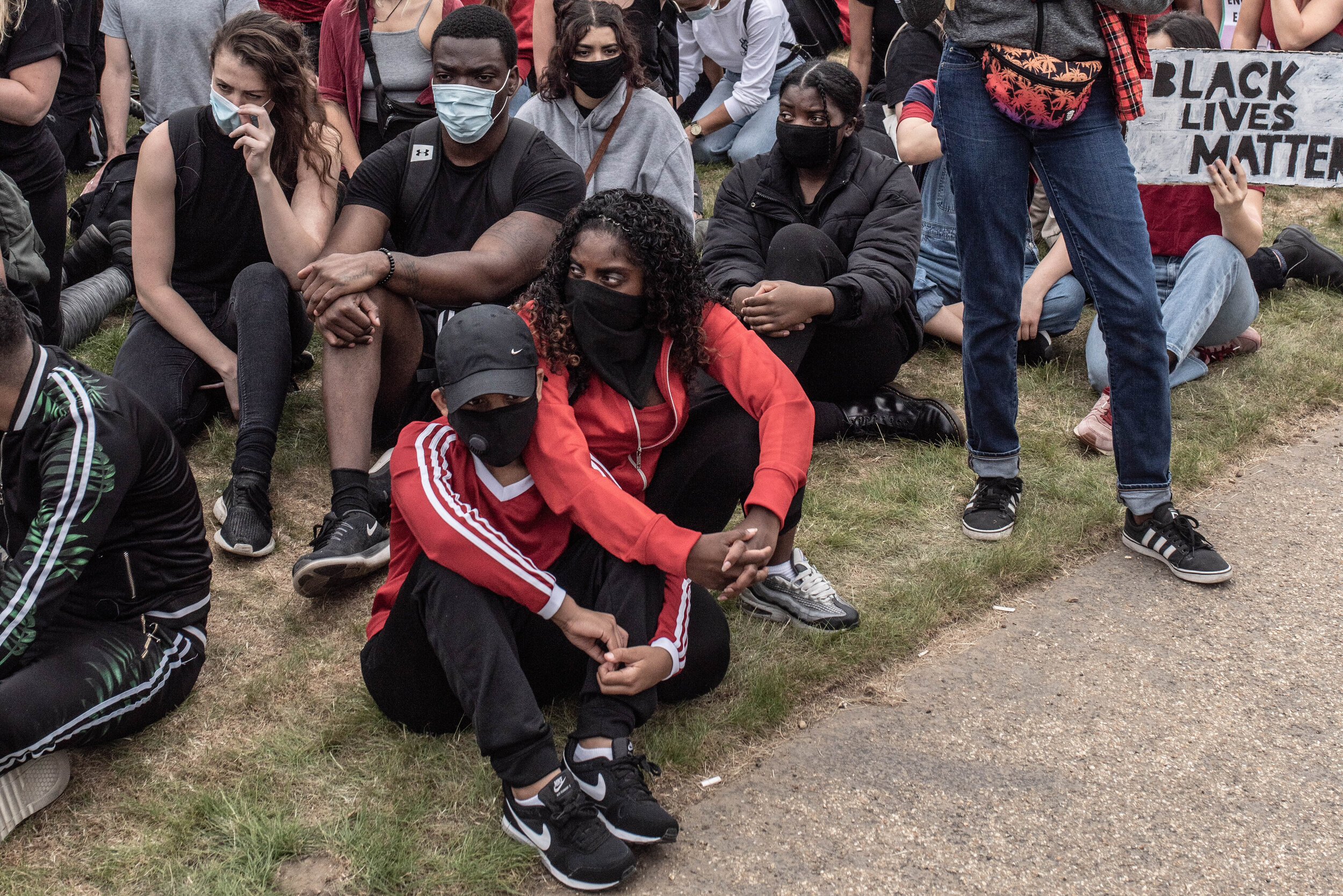
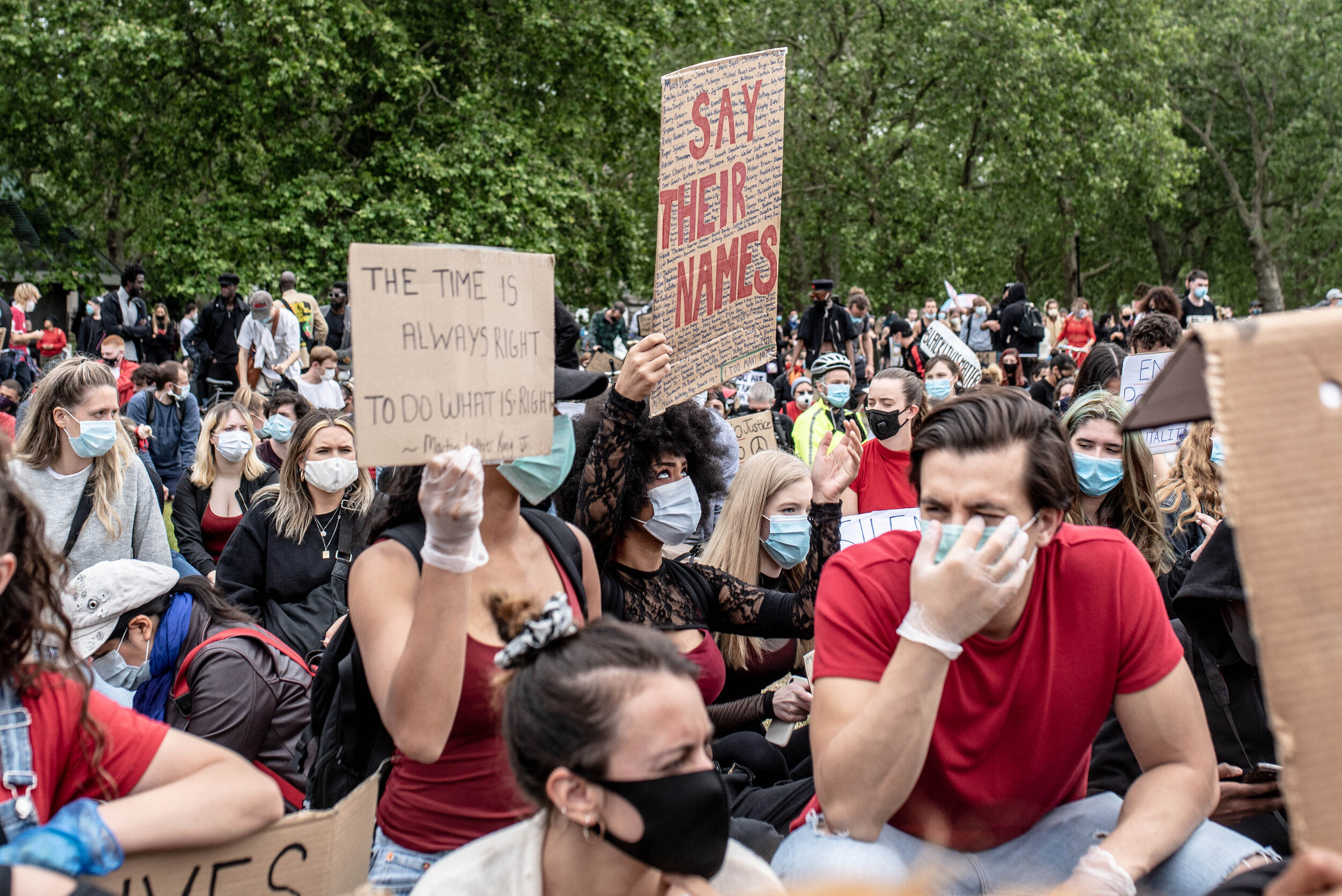
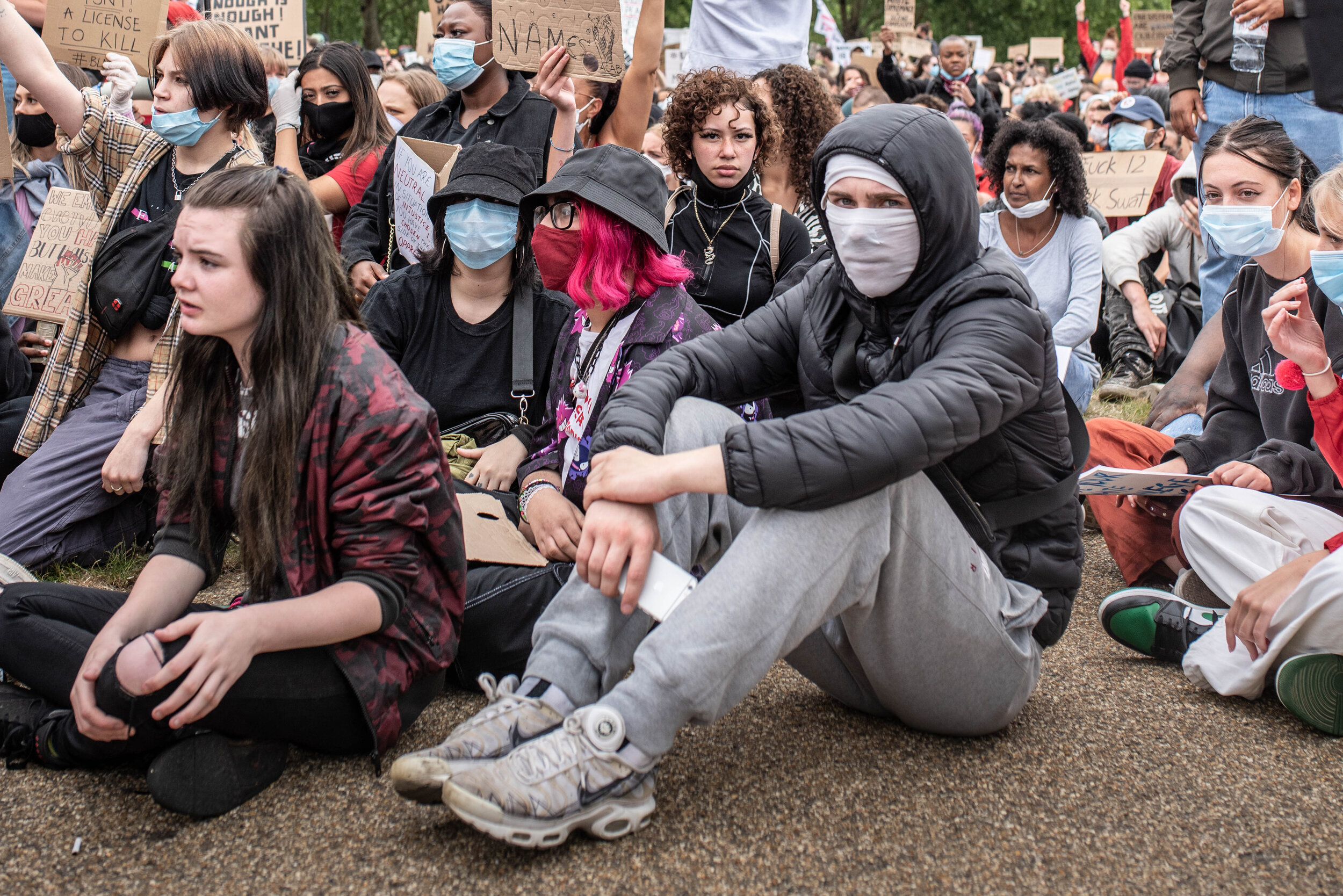
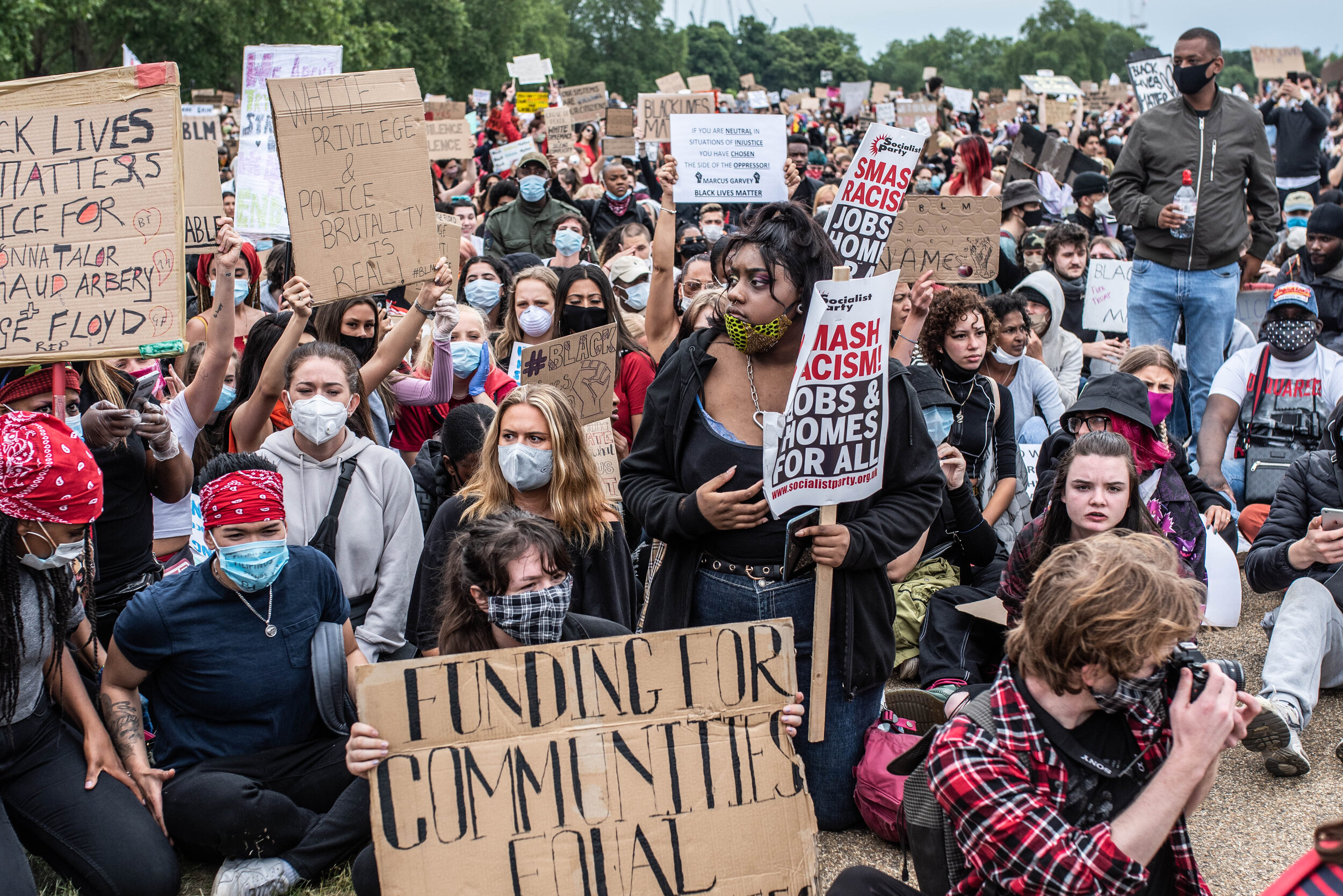
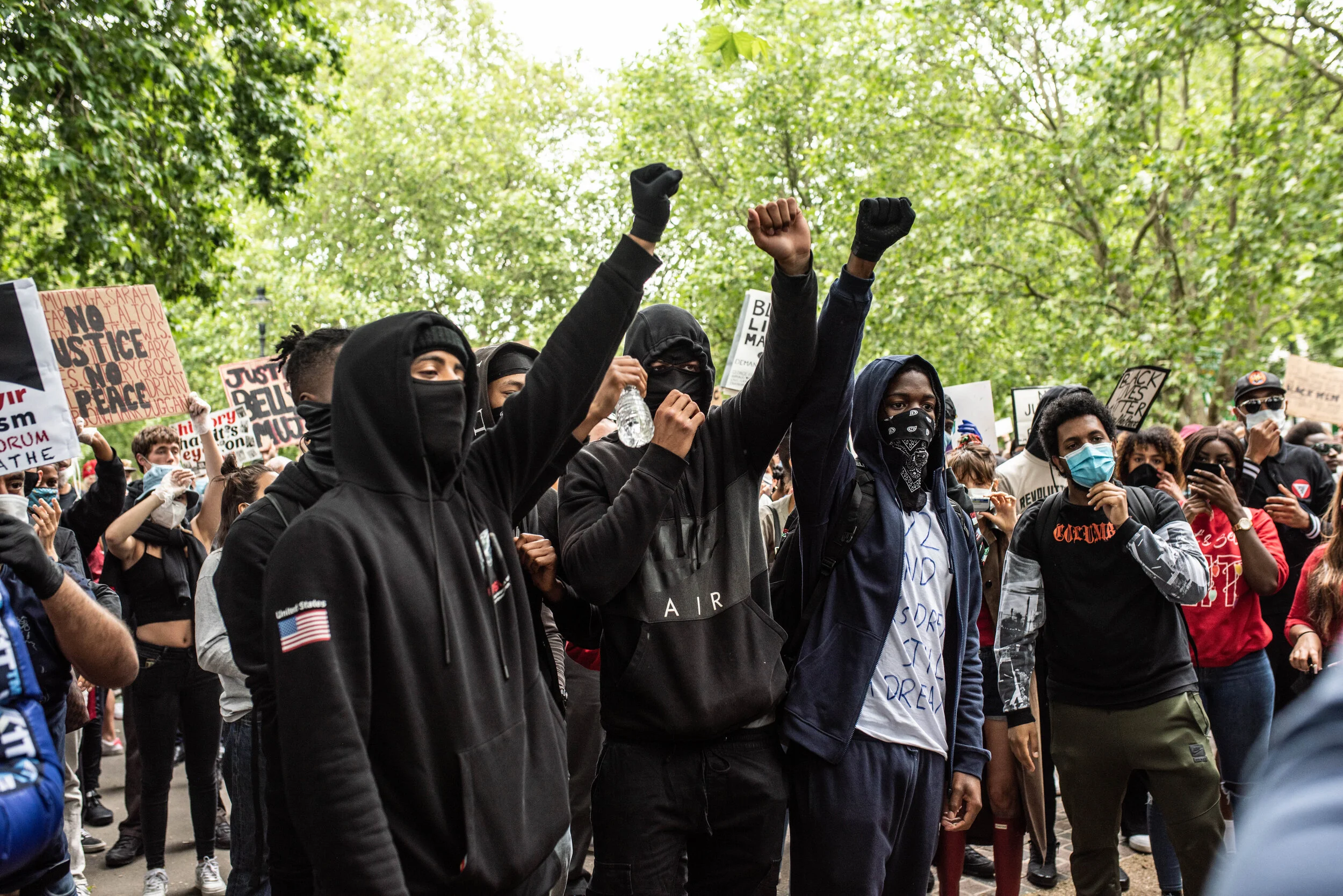
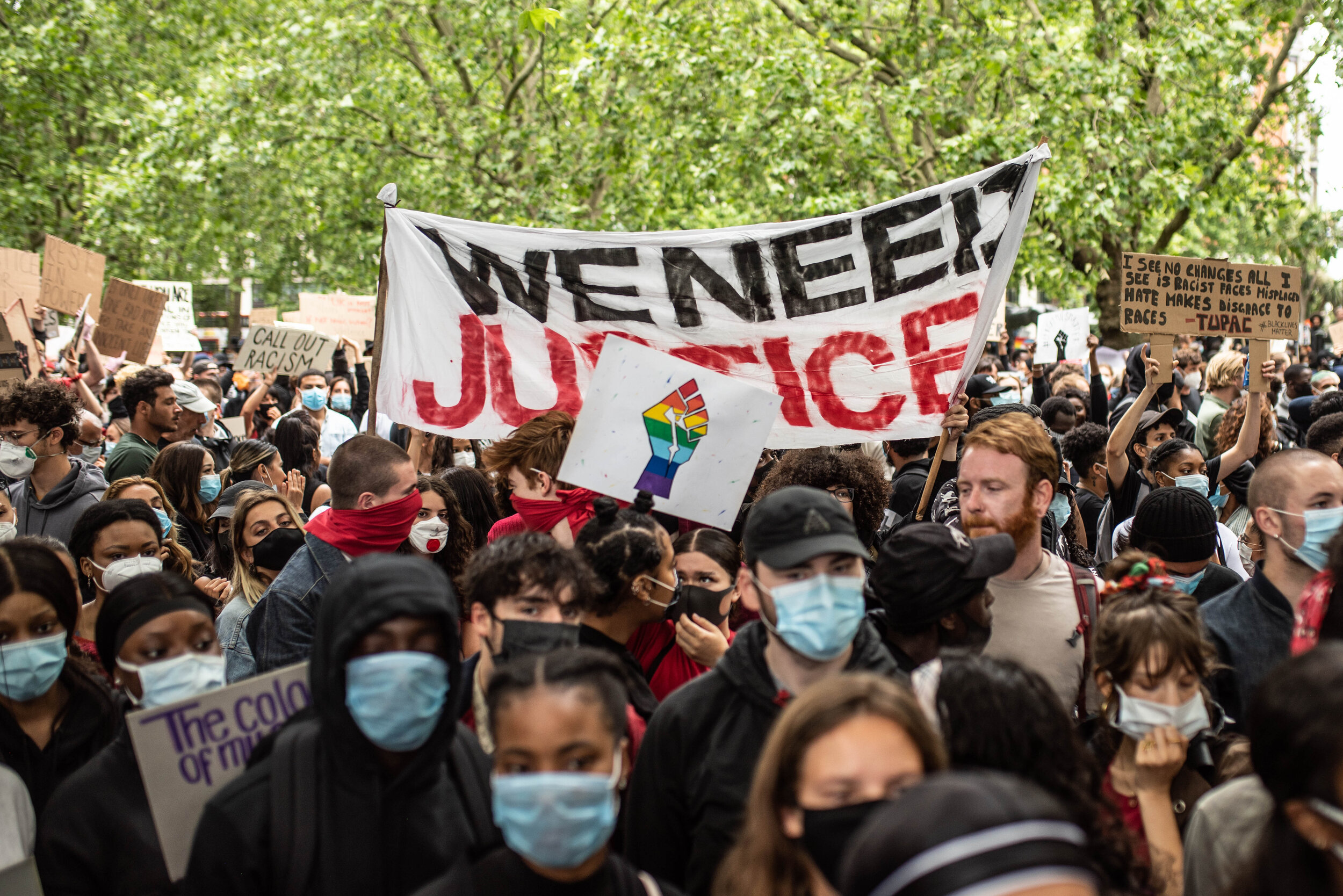
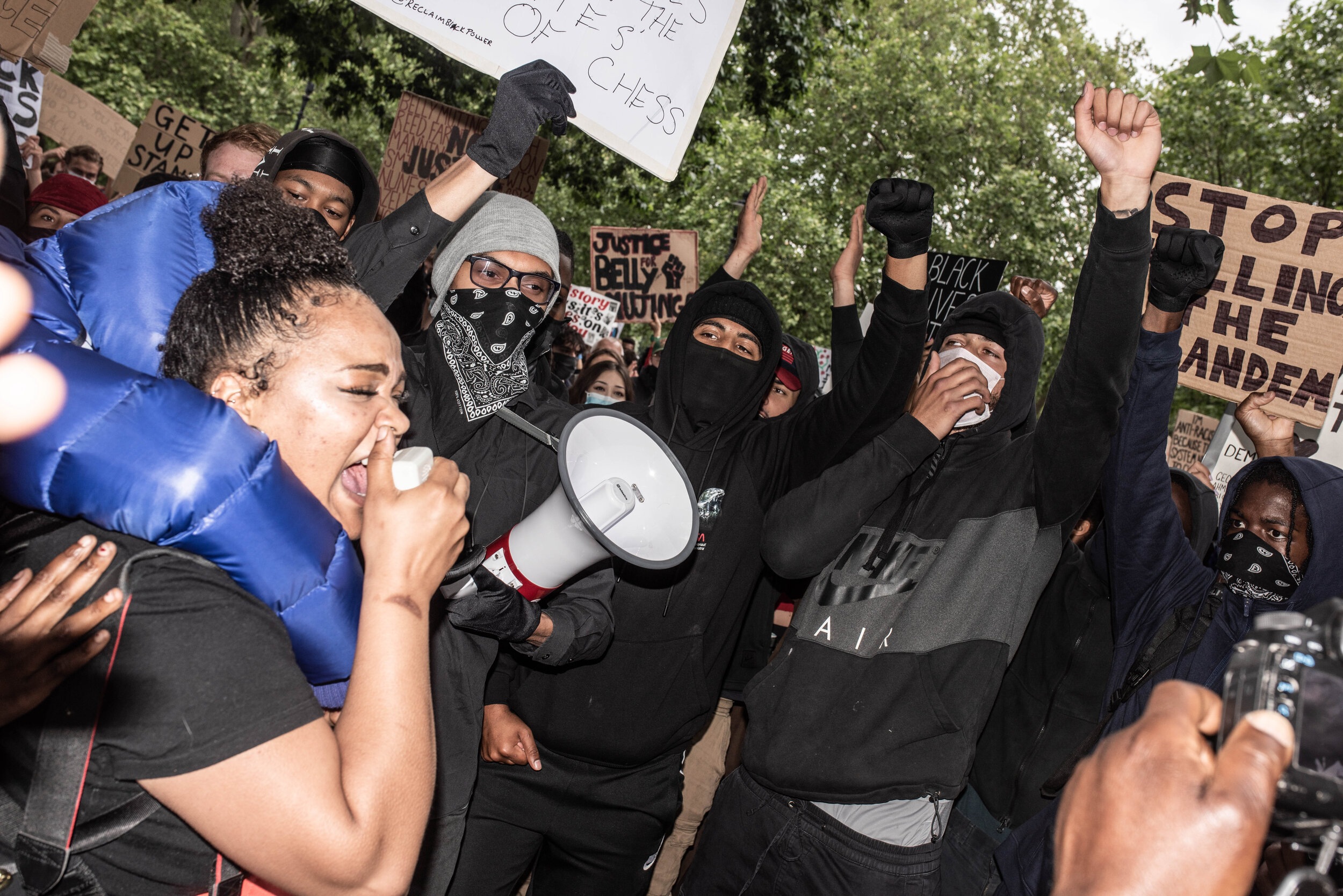
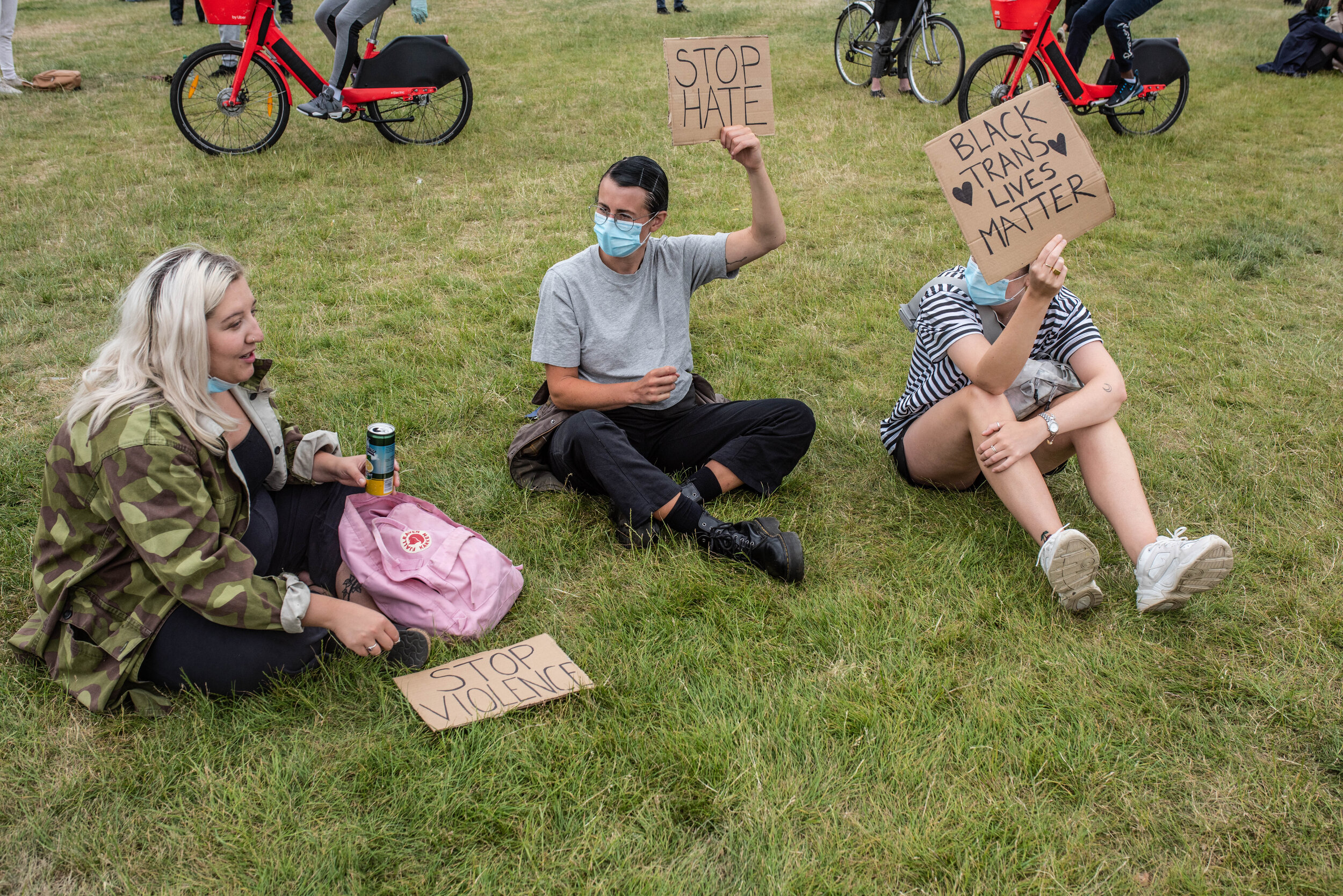
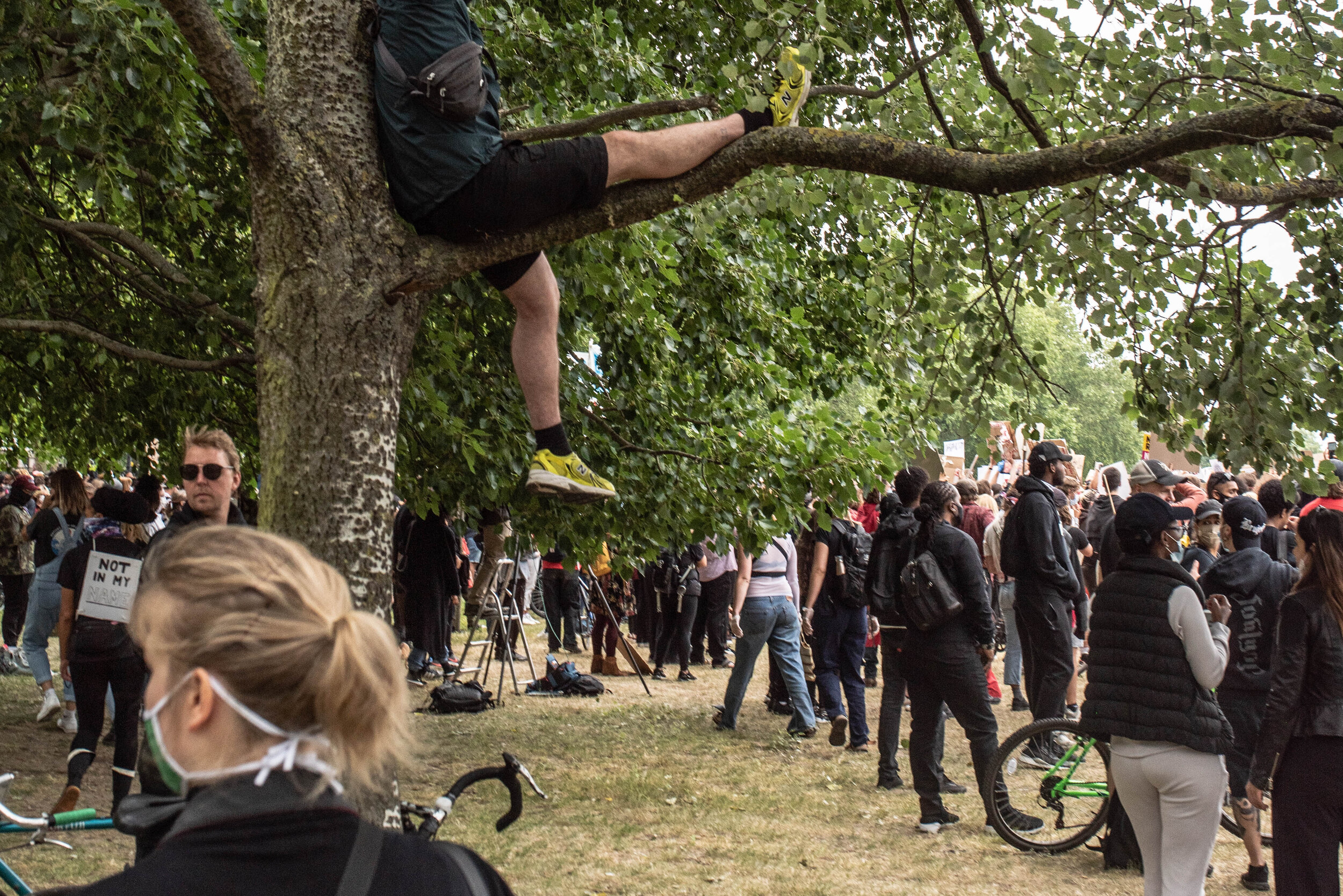
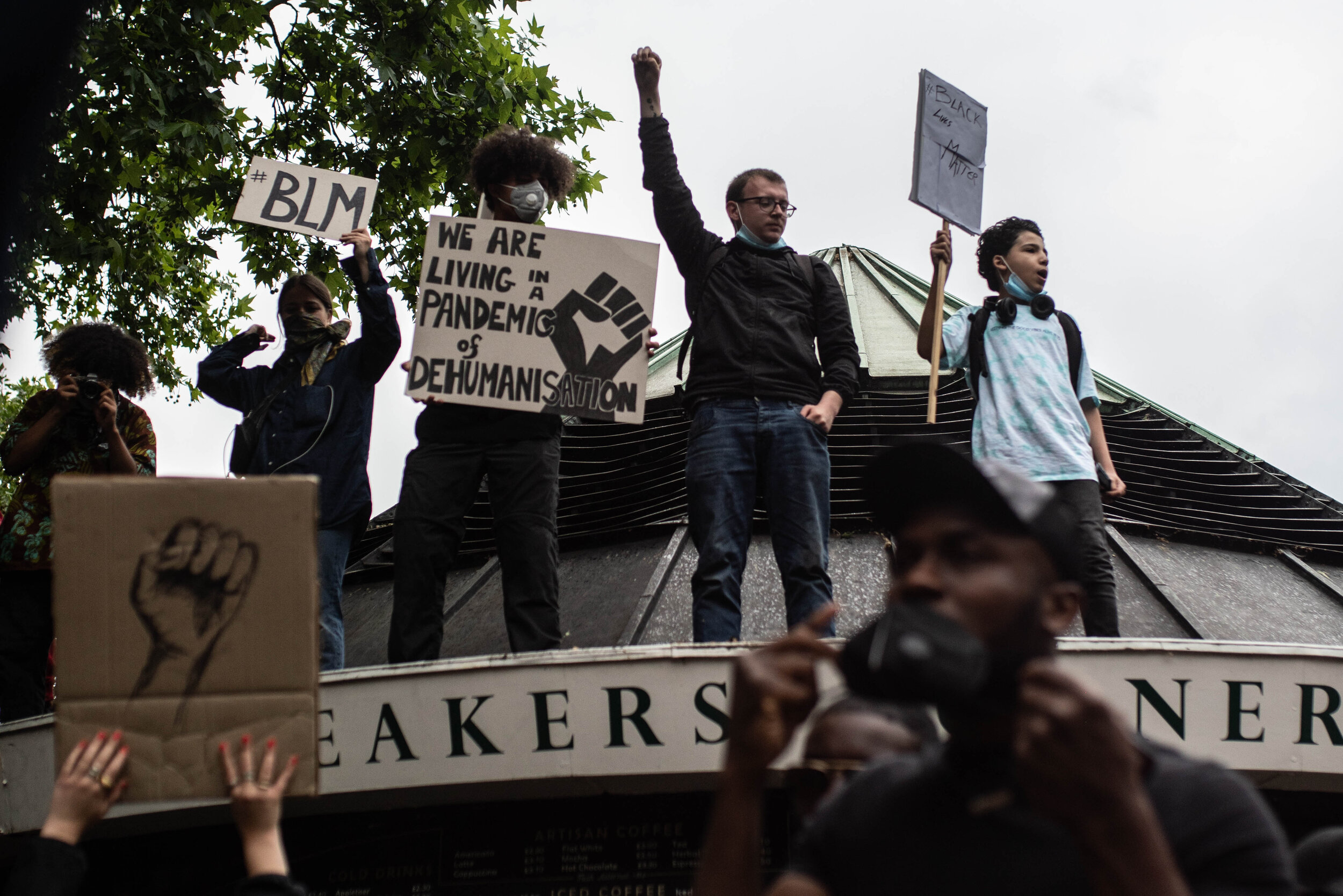
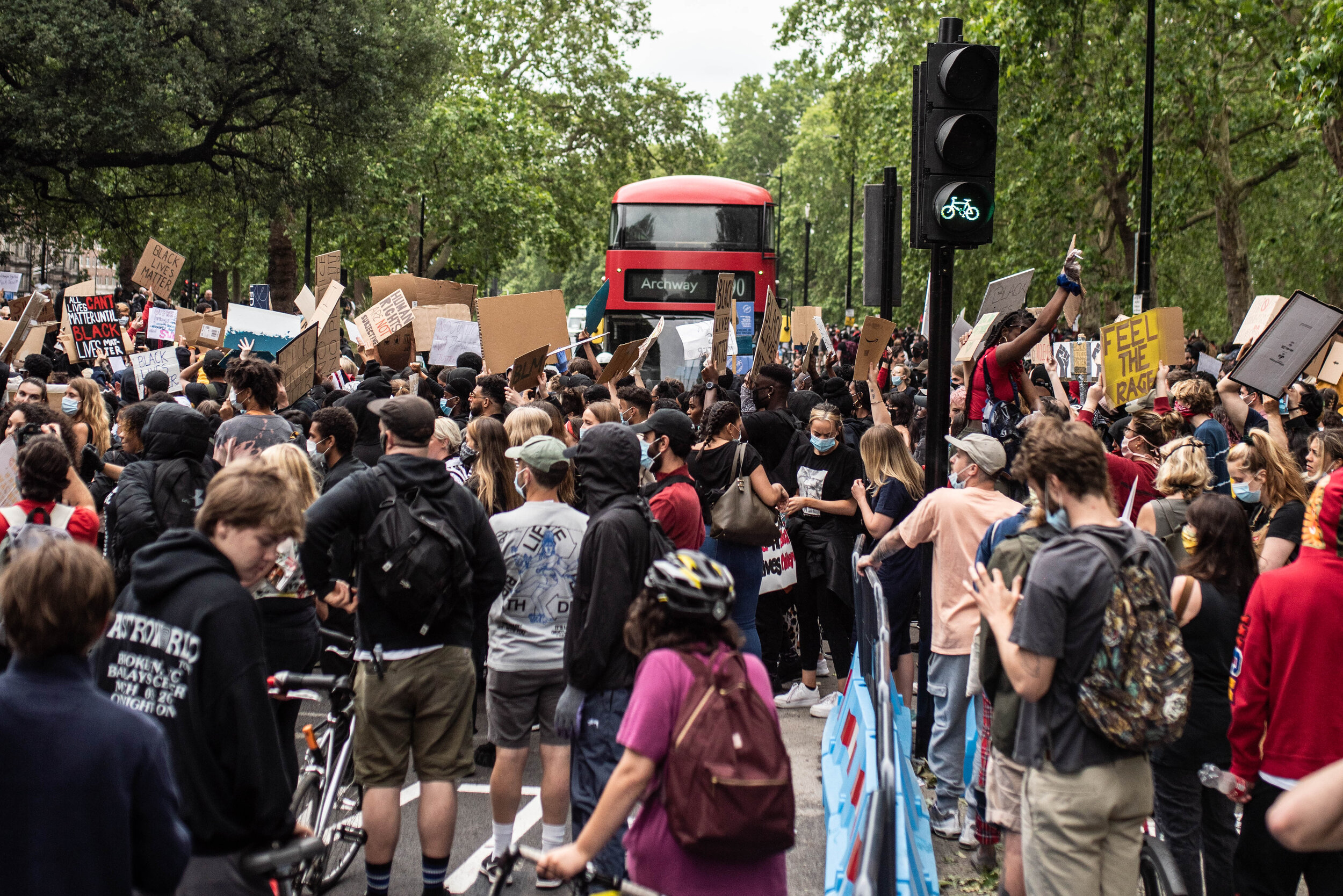
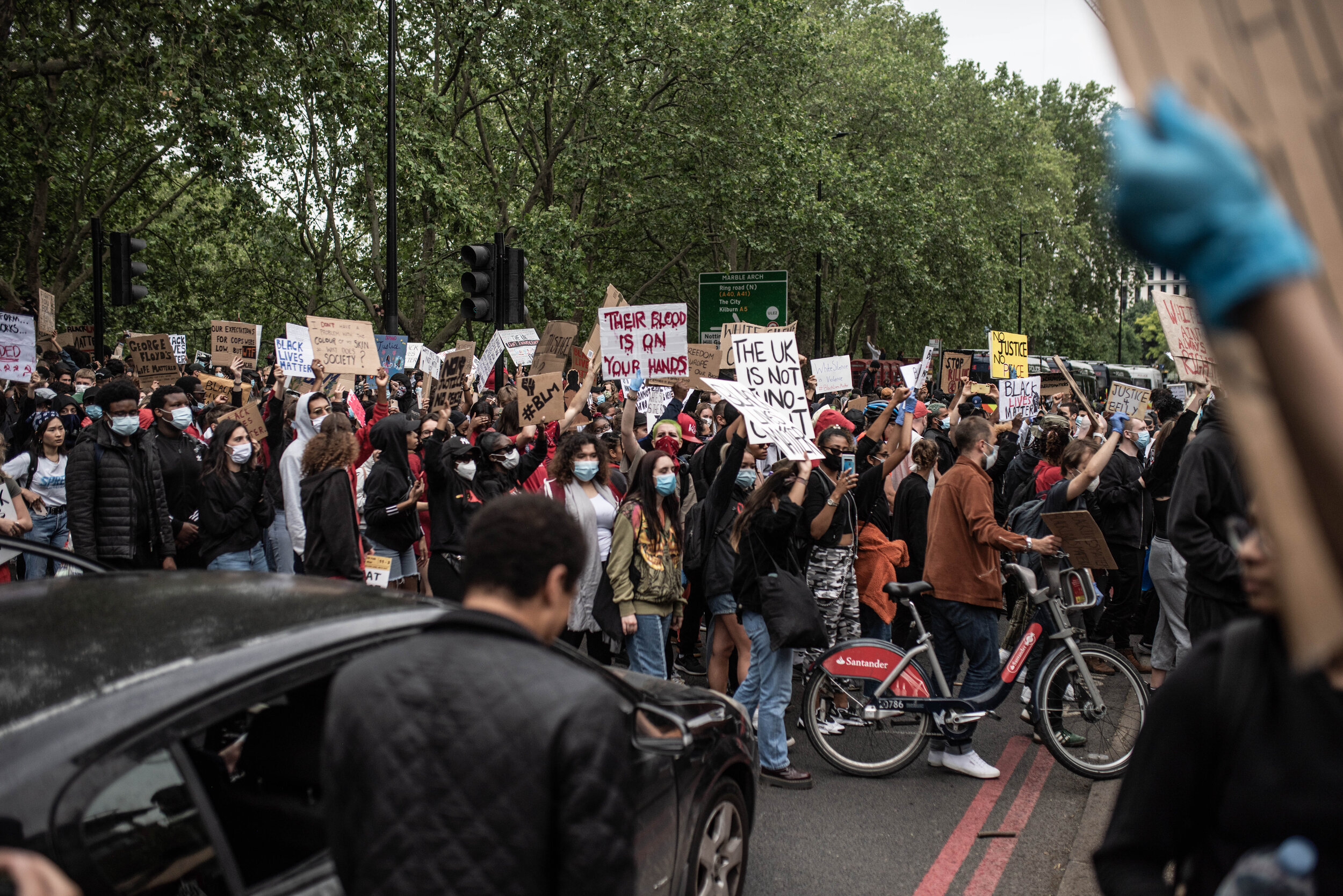
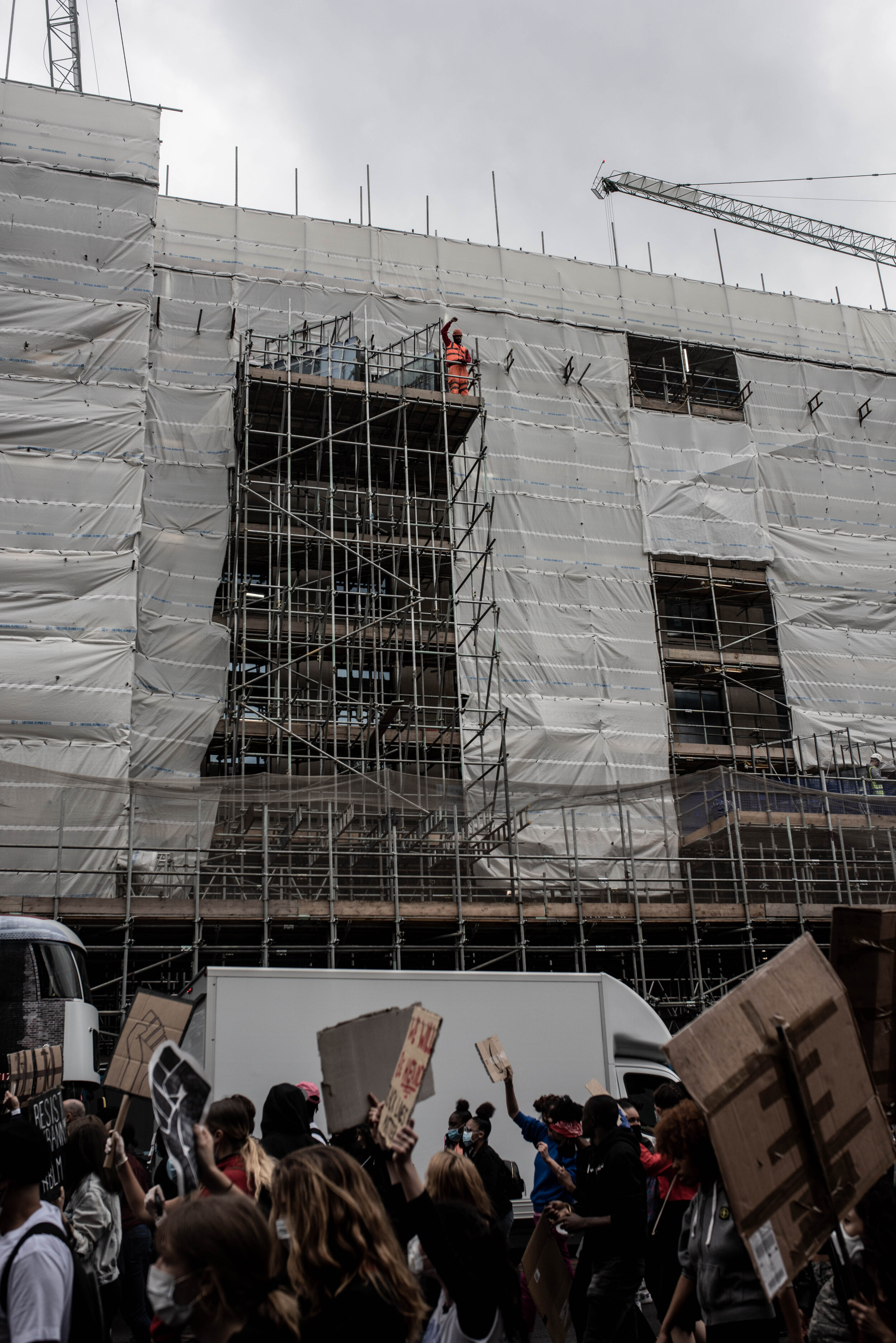
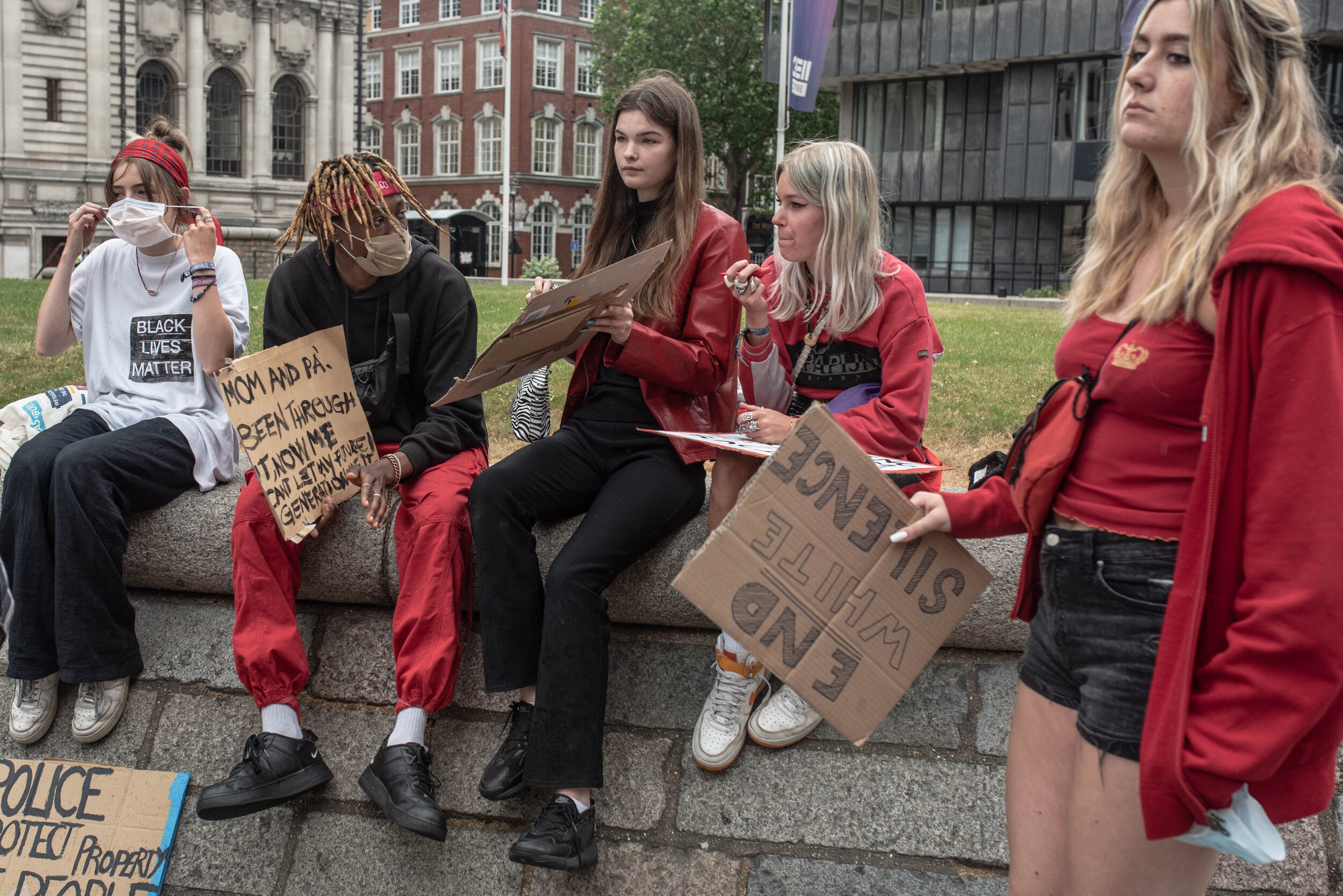
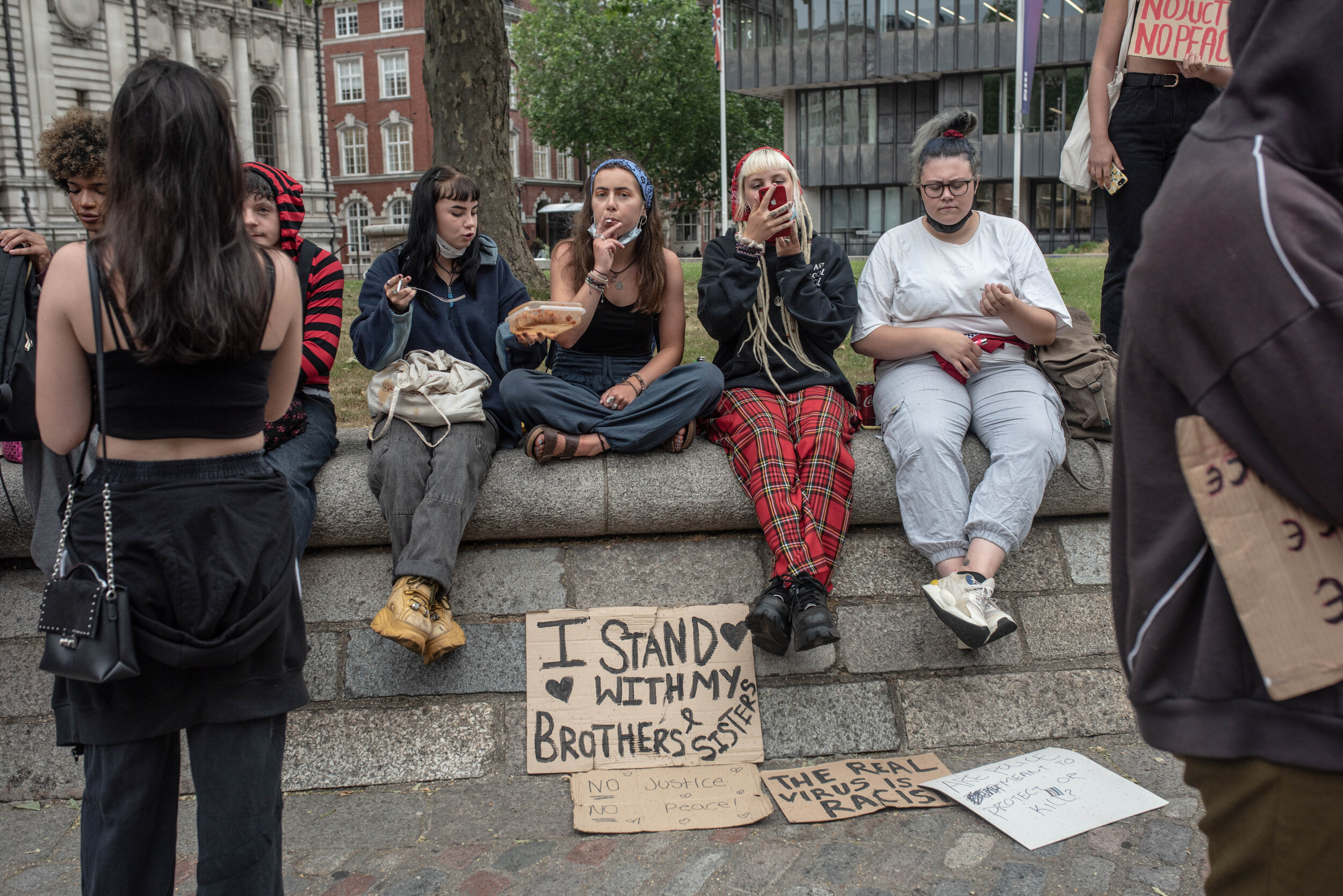
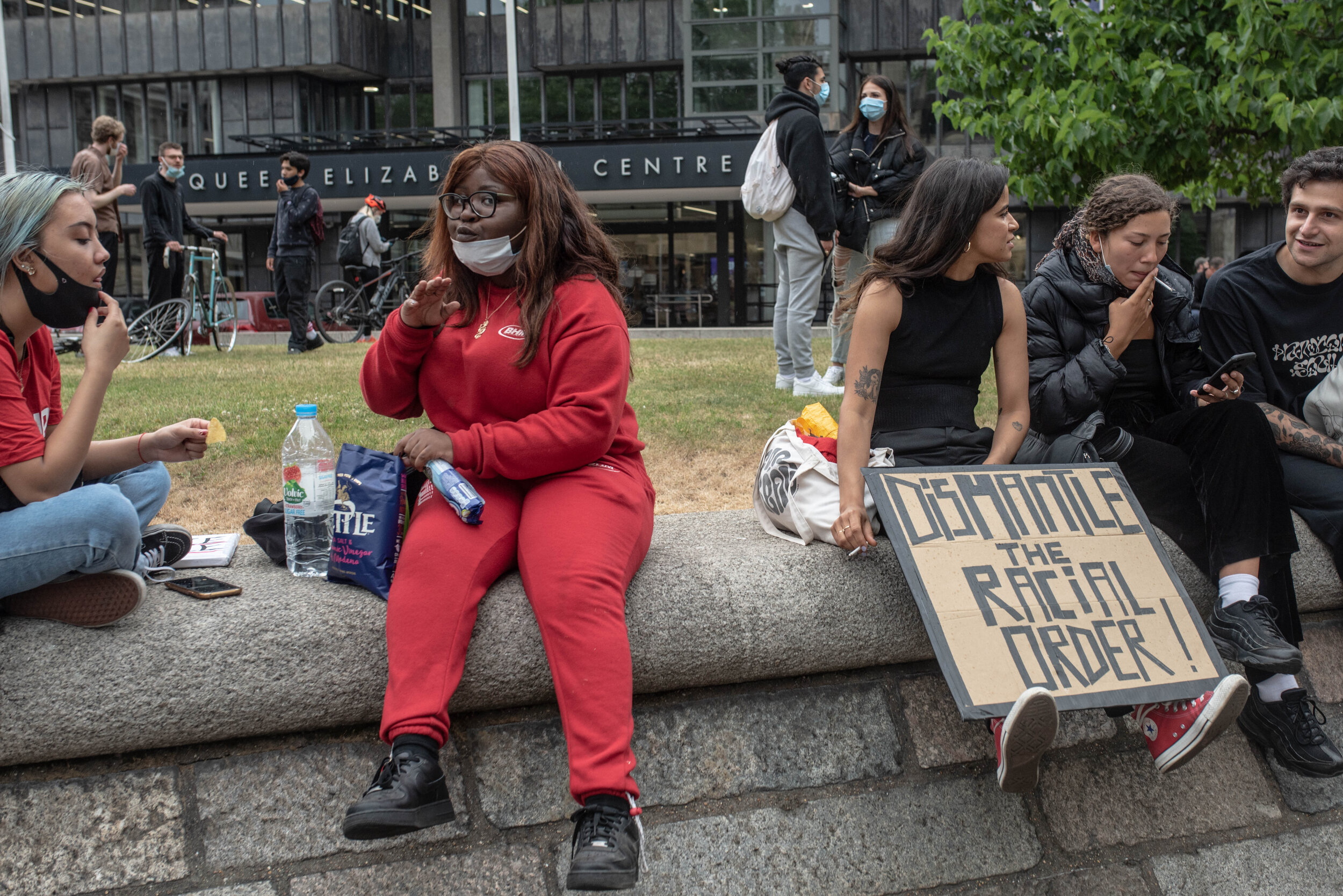
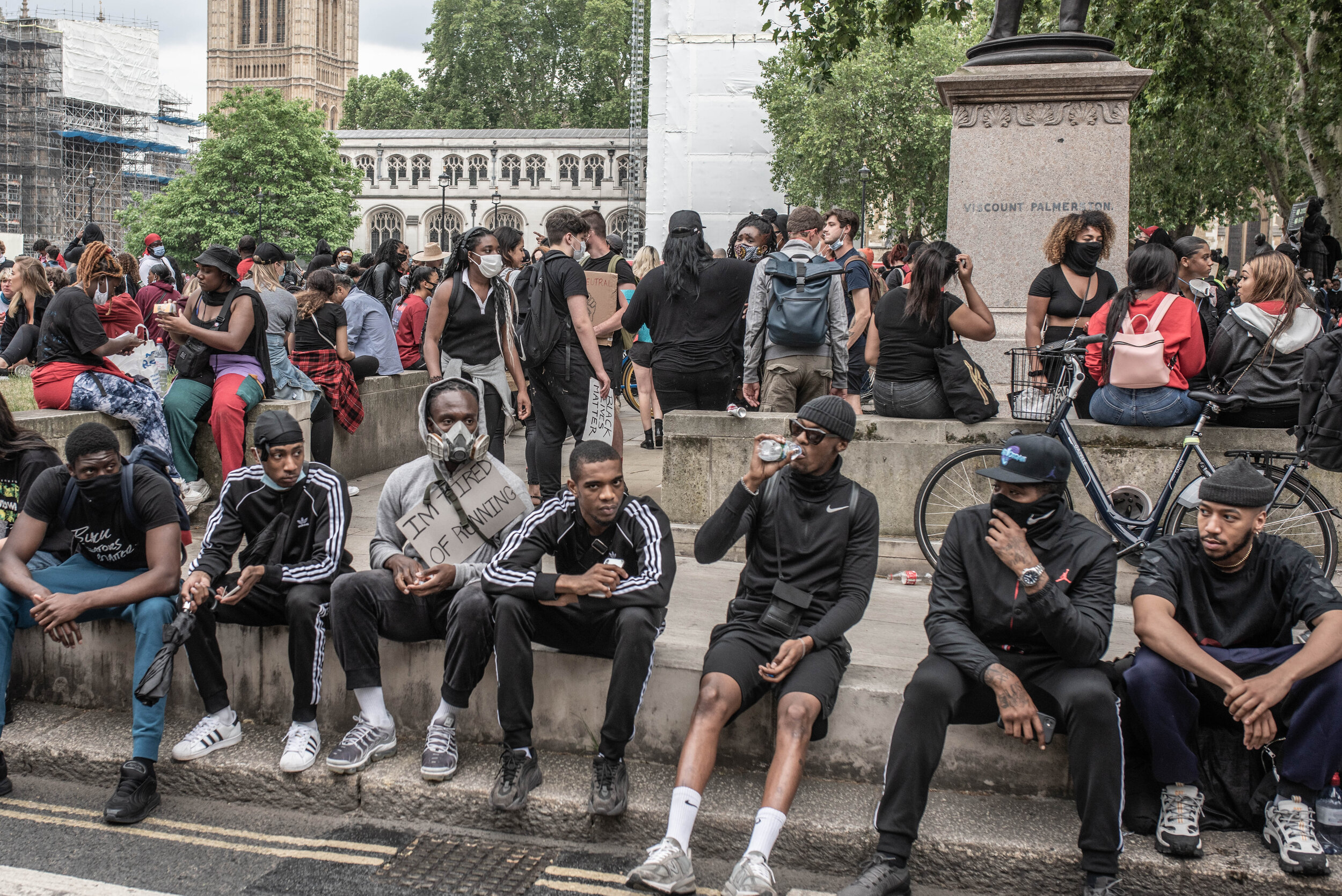
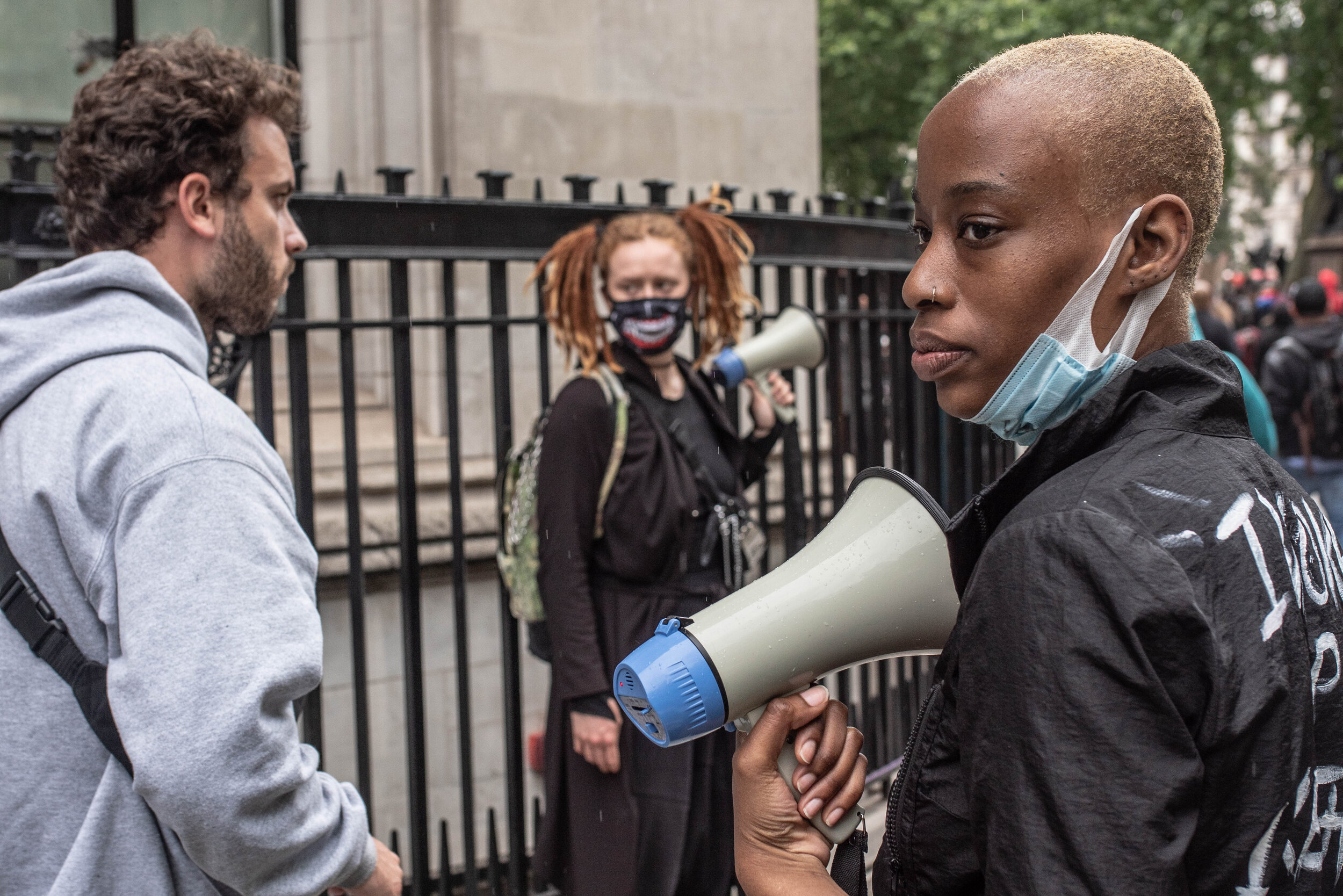
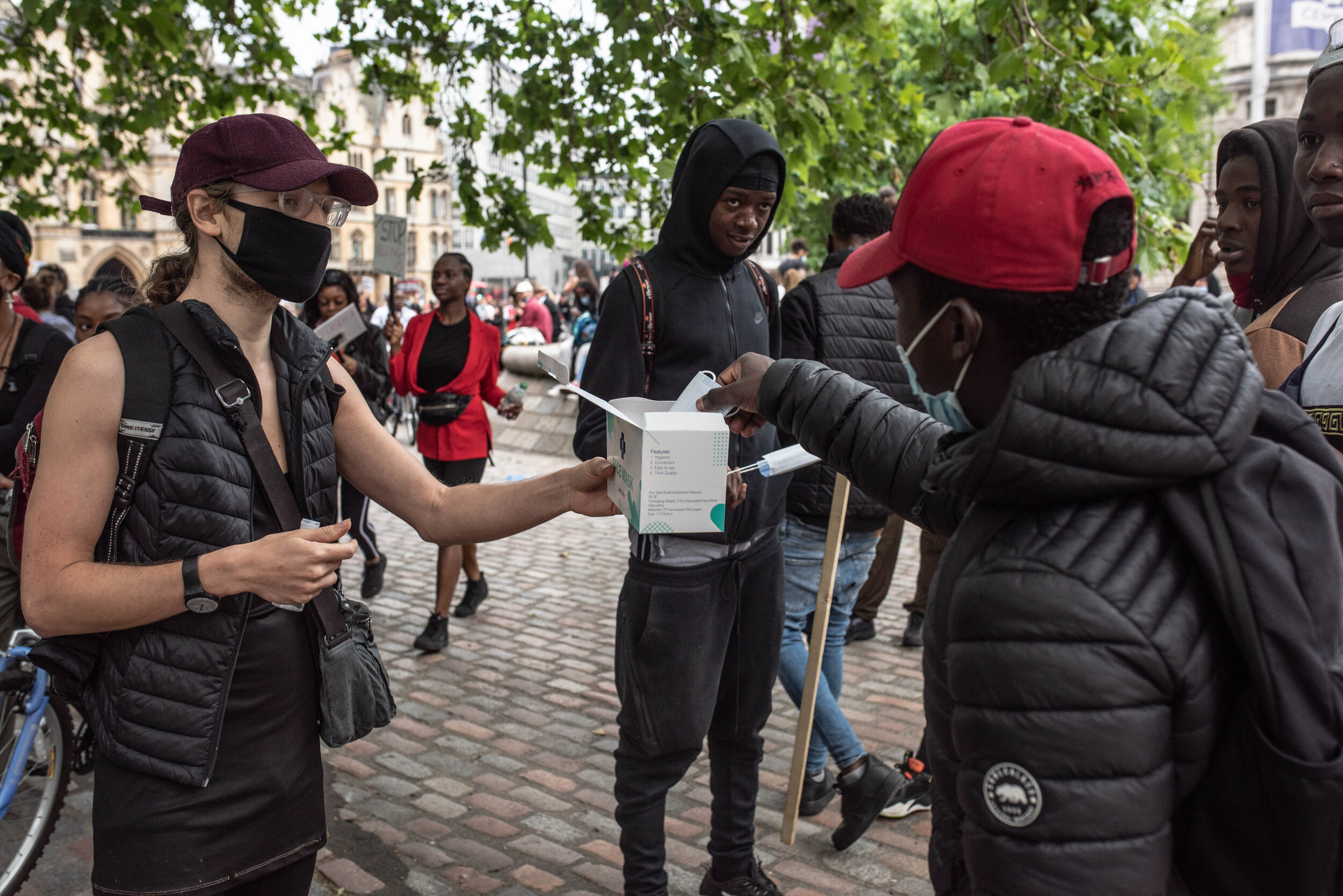
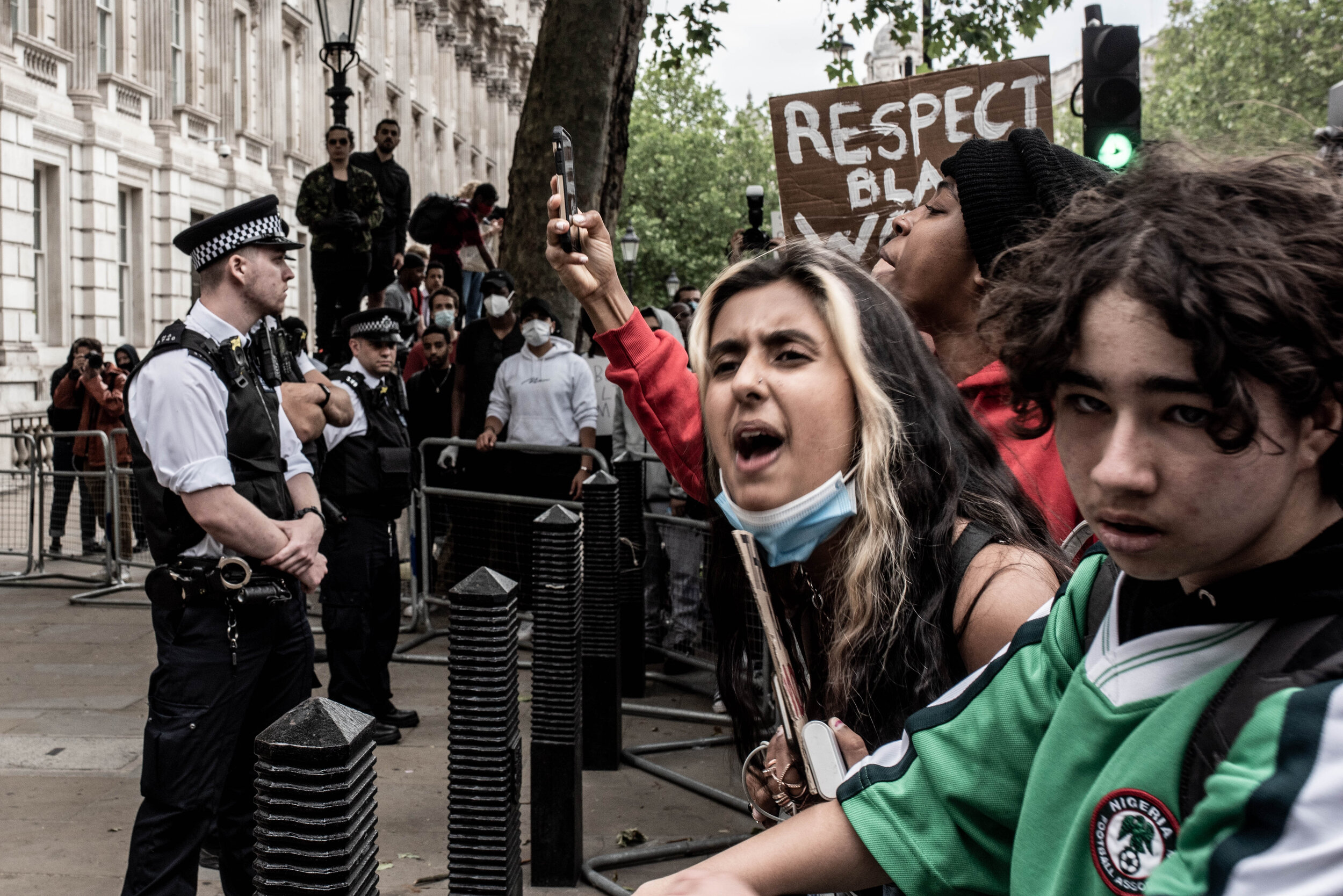
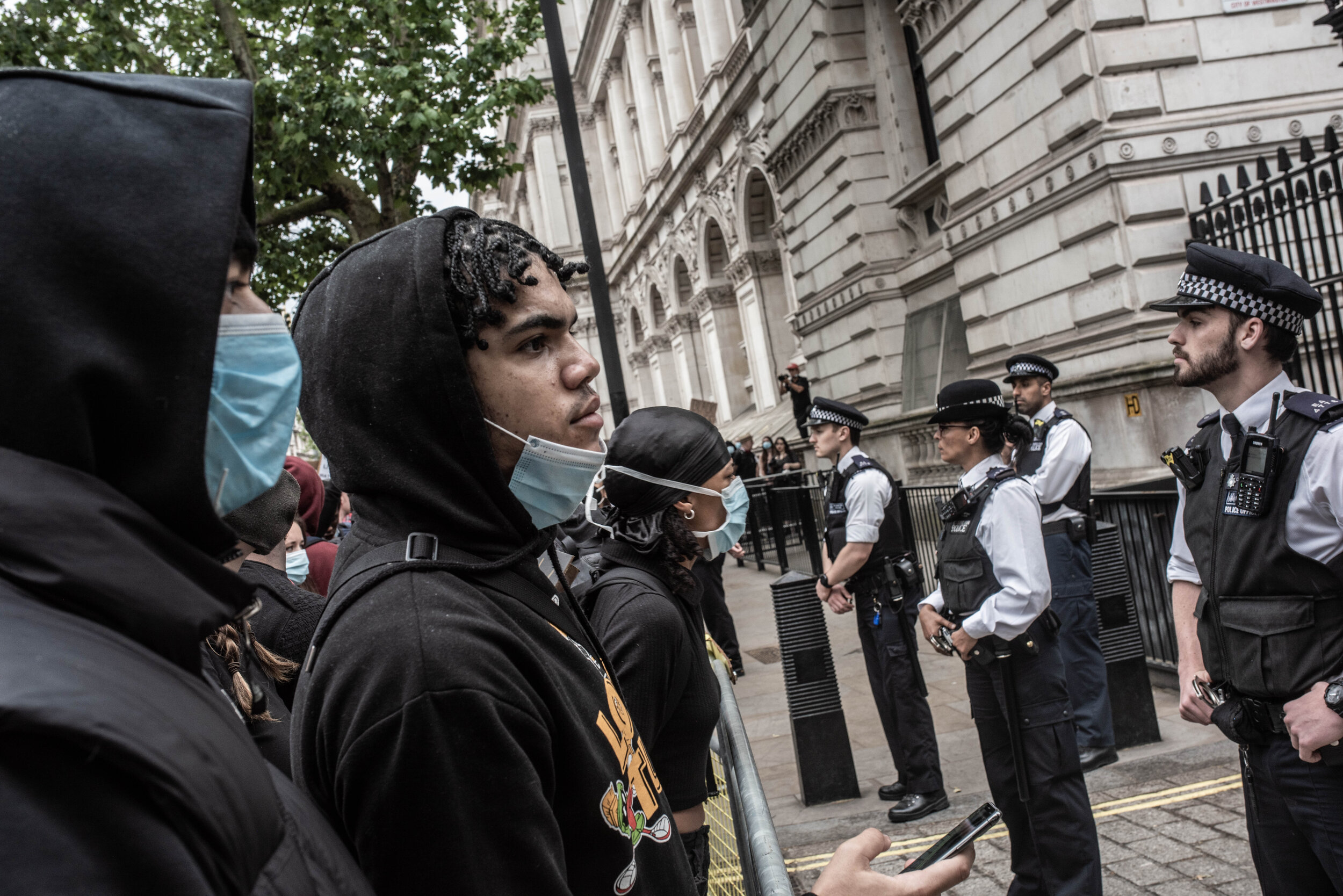
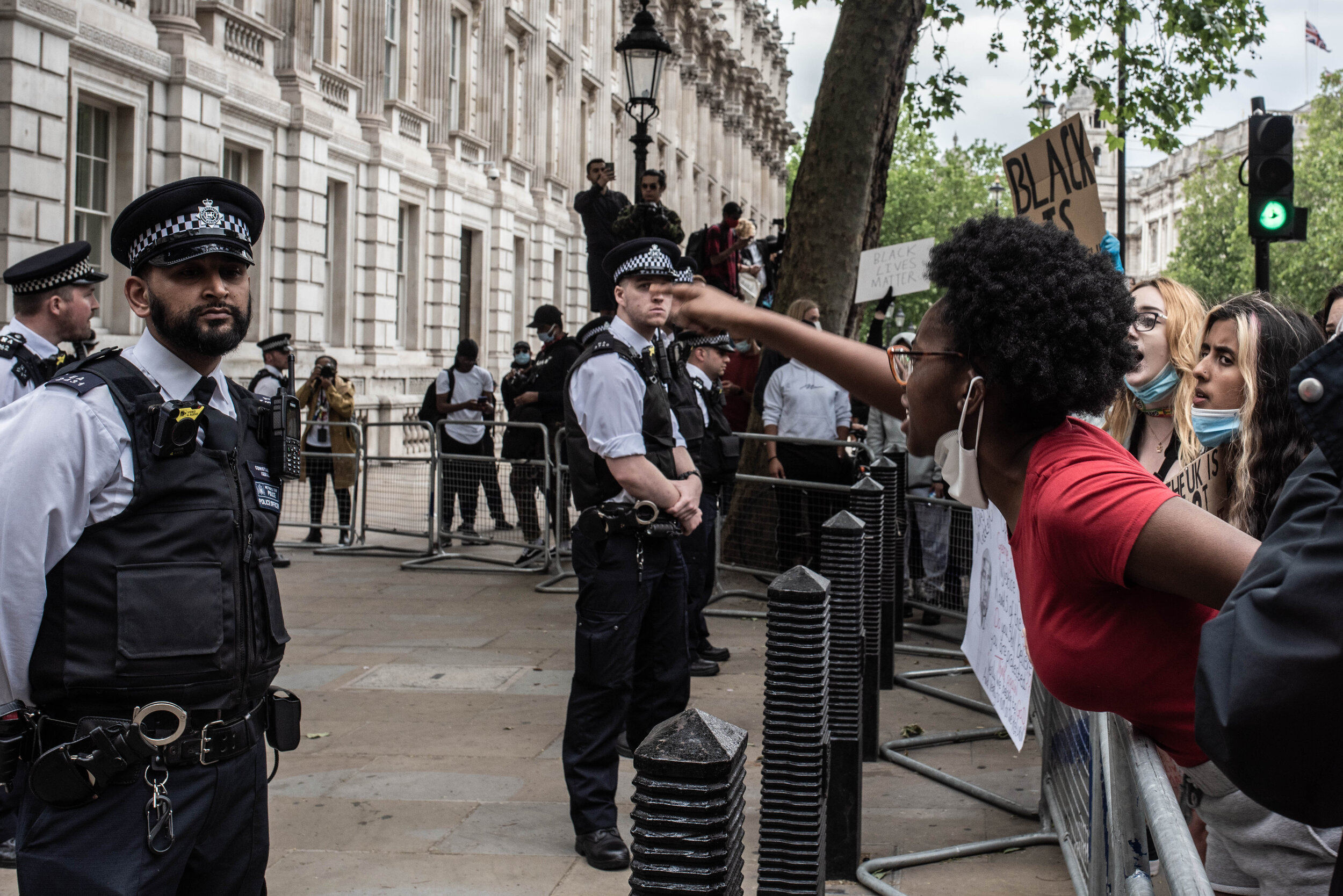
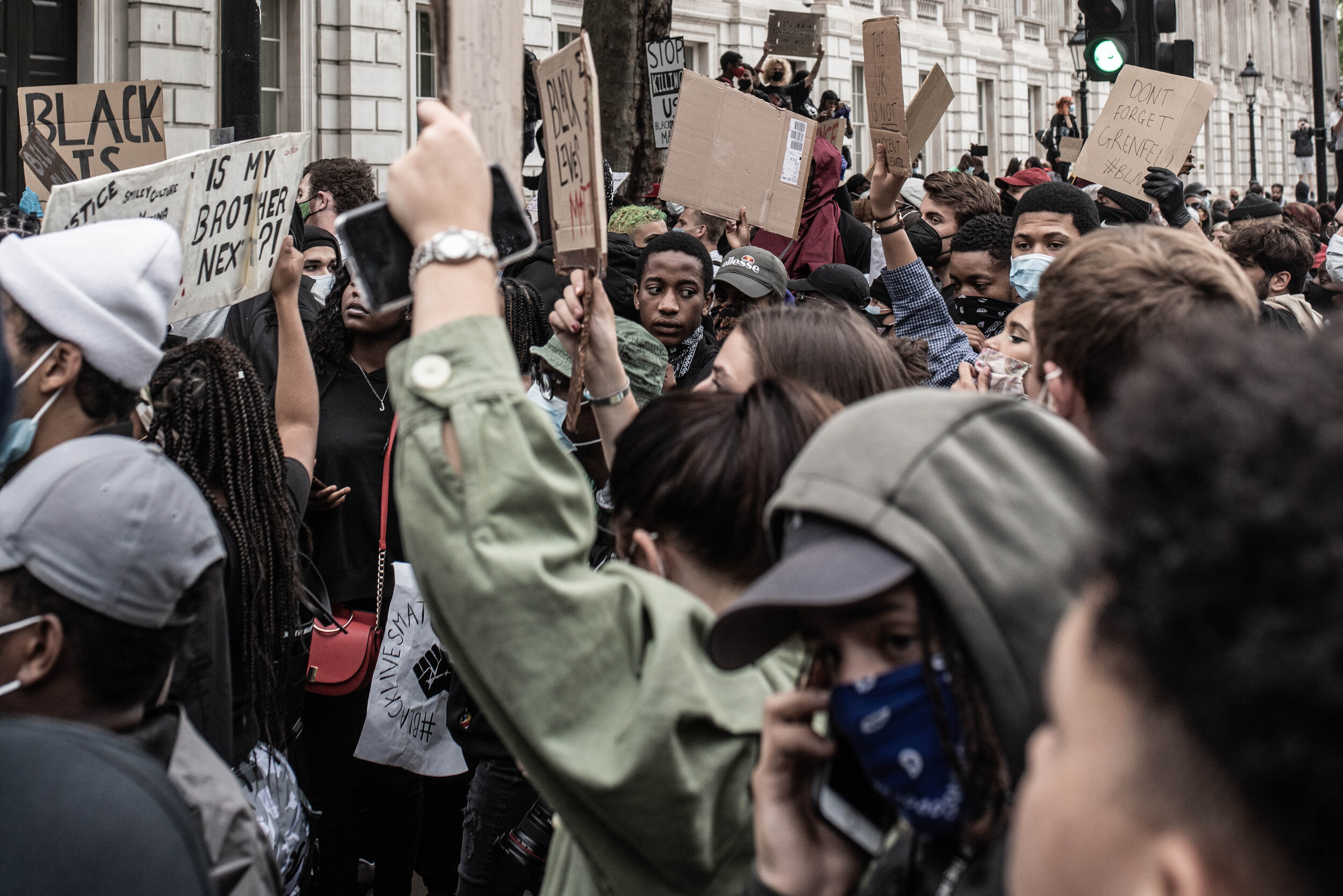
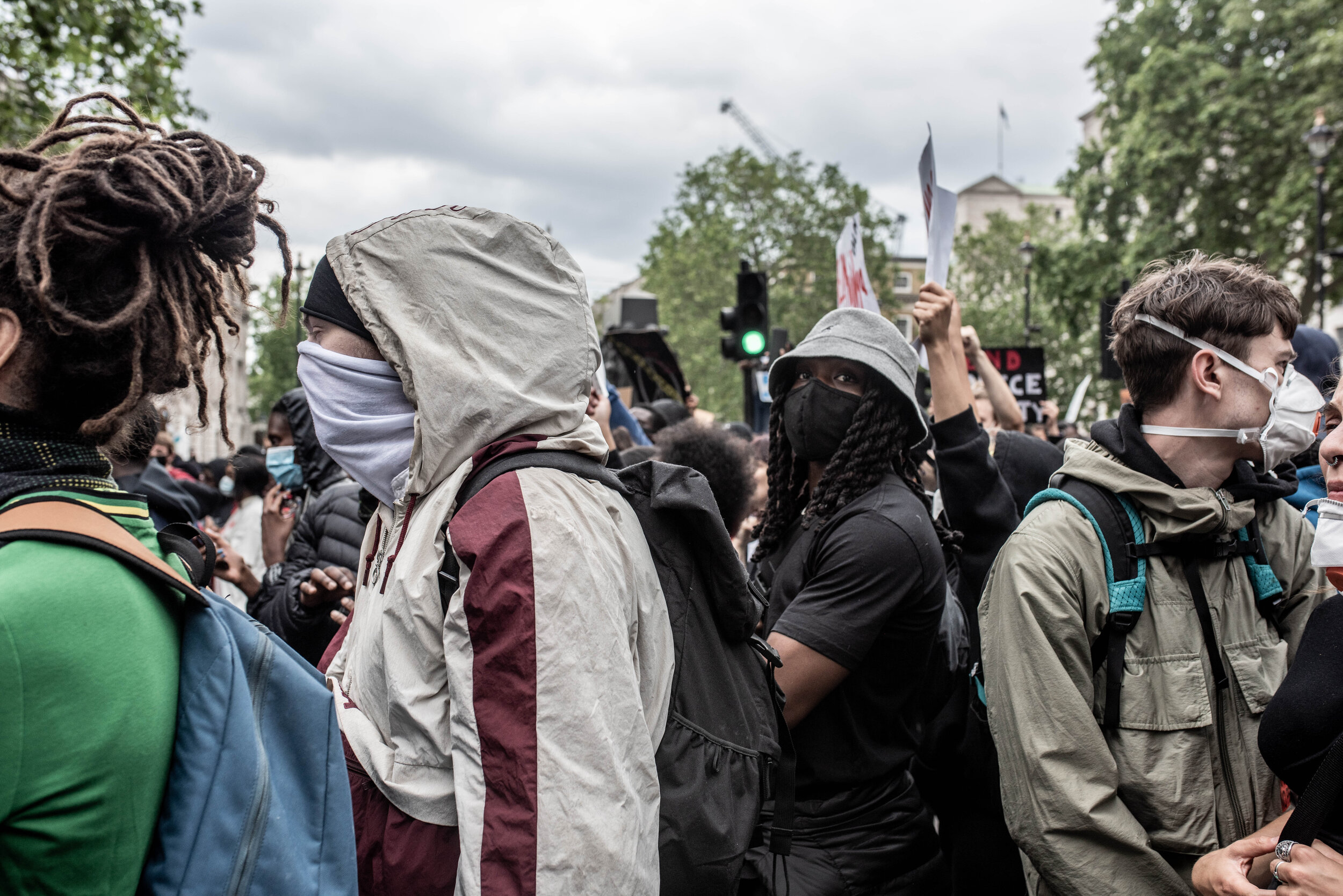
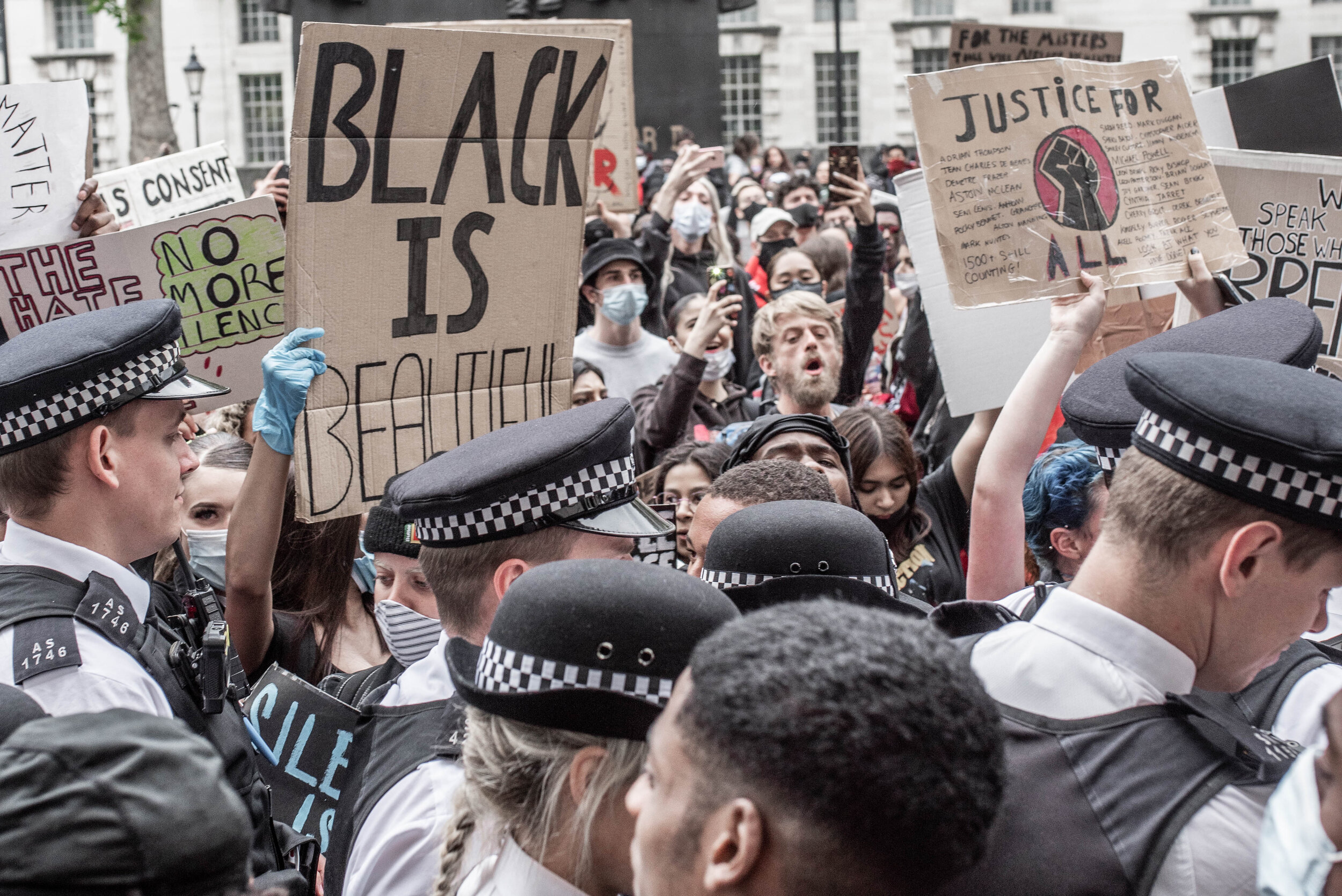
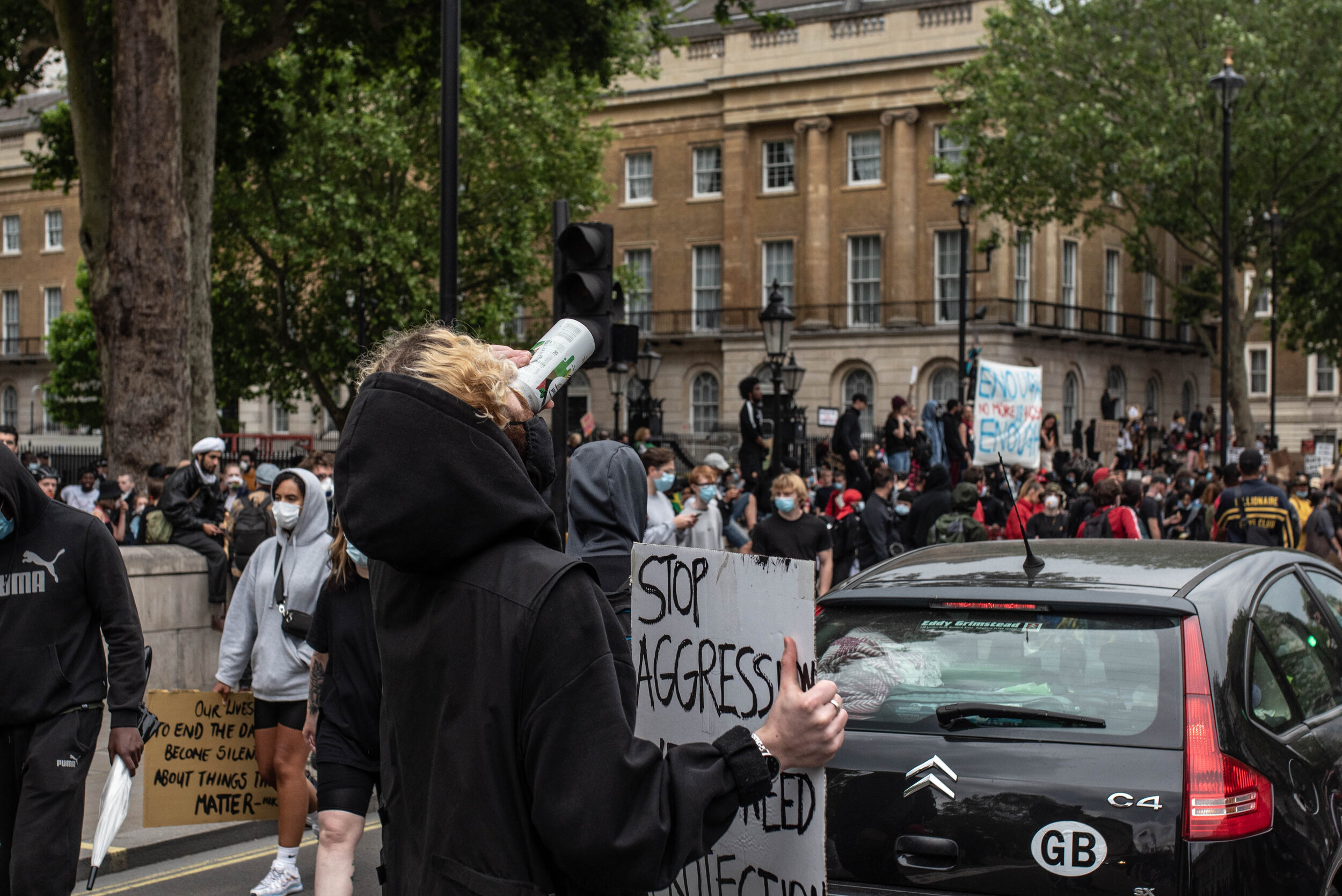
As I began to walk around, flags of innumerable nations atop slick black poles billowed above me as I stood behind the gaggle of police cars, soft music crept into my ear and was cast over the crowds by a guitarist at the entrance to the park. I felt an immediate sense of solidarity, unity and togetherness as he played the black spiritual “When The Saints Go Marching In.” Cheeks dimpled on masked faces, people drew closer together and the assembly began to grow.
I meandered around Marble Arch and talked to a few people but quickly made my way to the main congregation, where ushers and volunteers instructed the excitable collection of protesters to simmer down and be seated.
The group remained at Hyde Park for a few hours while John Boyega, Star Wars star who was born in Peckham, among others delivered inspired messages of hope. Boyega orchestrated the morale of the masses while giving an impassioned speech which asked what George Floyd could have achieved if he hadn’t died. His speech demanded what a world without racism would look like, if all were born with equal opportunity to achieve and there were no prerogatives, only equality. He also addressed black men, describing them as the pillars, the buttresses of their families. He identified that if real change is going to be inspired, then the family is where the first step must be taken, by young black men in particular.
I interpreted this as an encouragement to the next generation, to the young and zealous, to create equal opportunities for all.
The moments in history showing disparities in the values that are now upheld, are often looked back upon in anger. For we wish that we could have been there to make a change, in the 1960s in Birmingham, Alabama for example, to stop events from happening and to redirect the course of justice. Shaun King highlighted in a recent post that we are in fact living in those moments right now. The future activists and orators will refer back to these times; at the protests I felt a consensus in making this generation one that is identified as inspiring change.
Once again I milled around the group, speaking to individuals and conferring ideas until I was caught up under a canopy of trees as this woman began to attract a crowd of listeners. At first she began proclaiming beautiful rhetoric to the extent her own voice would permit. A man with a megaphone swiftly appeared and she used it to throw out a stirring soliloquy to the masses.
“You went to America… you stole! You went to Australia… you stole! You went to Africa… you stole! You stole from the three A’s of the world!”
“Come on!”
“NO! Because I’ve had enough of thieves, yeah? I’ve had enough of liars! The most vile… vile people you could ever nominate in the world, THEY are our leaders now. So it is really time for us to rise up, and do something…”
“Not in the name of colour, but in the name of humanity.”
“You need to find your humanity and breathe, yeah?”
“Breathe for George.”
“Breathe for him.”
[passersby and crowd erupts in applause]
“Whether you are a policeman… whether you are a road sweeper… find your breath and use it, to tell the truth, yeah?”
“Because the truth counts for everything. It counts for tomorrow, it counts for why you are going out and working. But if all you are working for is the sake of vanity, then my friend give up your job today.”
“Because everything you have materialistically, is perishable.”
“Everything you have will be thrown away. You can lose it at any point.”
“This coronavirus, should be showing all of us right now that the price, the quality of human life is so important.”
“I never spoke to my neighbour before but I do now. Everyday I say “how are you? You okay? You feeling a temperature? You breathing? You got your breath? You need anything?””
“Bring forth your humanity, it is your weapon and the biggest weapon in the world today is the power of love, the power of love, the power of love, the power of love…"
“We didn’t come here today to just be counted and then go back to our houses. We came here to make those changes officially.”
“We want to see that change.”
“So let’s find Boris Johnson. Let’s bring it to him and do it decently. Let’s fill out a petition and sign our names, our addresses and tell them where they can find us.
They can bug us up all day long.
Because they are not doing anything for our people.”
“OUR PEOPLE, YEAH?”
“Our people, who came here from the Commonwealth from the 50’s and even before that, on royal invitation. ON ROYAL INVITATION!”
“And then they say “who told you, you could come here?””
“ELIZABETH! MY QUEEN!
“SHE INVITED US HERE.”
“We work in your NHS, yeah? We clean your streets, we feed you, we look after your elderly.”
“Let there be no colour today, other than love. You are not black, you are not white, you are the colour of love.”
“NUMBER ONE! LONDON!”
Following a series of speeches and announcements, the group marched towards Downing Street. On the way, multiple junctions were held up by the steady flow of protestors, along which motorists and passengers beeped their horns and raised their clench fists in support.
Eventually flooding towards the Prime Minister’s residence, individuals began screaming in anguish at Number 10 and into the faces of the police. I could hear the sound of the bones in their wrists dully smacking against the metal fencing as they gesticulated. The officers and their eyes however, remained solemn and inscrutable.
I felt chills across my body and was very moved by some of the indictments drilled into the unsmiling, monochromatic countenance of the law, calling for change and for officers involved in unlawful murder to be brought to justice. Yet I cringed at some fatuous comments bawled out by younger protestors, who I don’t think were certain what they were saying and kept screaming “look at me in the eyes! You can’t because you’re guilty.” The entire group was so diverse and ranged from punters like this, to middle-class uni students, to low-jeaned groups of sly-looking teenagers, to transgender activists, to entire families nursing babies to gaggles of amateur photographers. Nonetheless, it was beautiful and encouraging to see such a displayed array of cultural backgrounds.
Though one strange sight that I saw on repeat was young men and women alike changing pose, pouting or finding their best angle while proudly holding up their Black Lives Matter signs as their friends took multiple pictures. Although it is not my place at all to judge another’s reason for attending, it was peculiar to see the permeation of social media influence into the actions of protestors. It physically brought the question of what the real face of activism today is into my head.
Is standing up to racism by posting a black square and picture of you at a protest on Instagram enough to qualify you as not racist today? I felt that some of the reposting was almost obsequious of individuals, giving in to social pressure – as if by not posting one, you would be denounced a racist.
It is clear that during the lockdown the consumption of online content has understandably risen; for many, there hasn’t been much else to do at home other than watch TV and scroll. Due to this increase in media and news intake, could it mean that more attention has been focussed on world events (and thereby the BLM movement) than if we had been living outside of this aberration, without corona? I have been considering this and the question has been raised on social media as to whether this ‘trend’ in racial issues will continue once #BLM stops trending online. Regardless of this, the support that Black Lives Matter has garnered and the conversations that have been initiated are so important in understanding how we are policed as a collective society.
I decided to look at some statistics after absorbing so much information that day. According to a BBC article by the ‘Reality Check Team’, 163 people have died while reprimanded in police custody over the last 10 years which equates to 8% of the total number of deaths (this is equally proportionate to the percentage of the British population who are black). From this we can ascertain that if all of those who had died while in police custody represented a model of British society, then the entire black population would have been killed. This statistic is beyond alarming. Figures in another article that I read quoted the UK research charity Inquest equally unnerved me:
“To date there have been 1741 deaths in police custody or otherwise following contact with the police in England & Wales since 1990.”
Although this number addresses mortality rates with much wider breadth, and takes into consideration not only 20 more years, but also variant modes through which people have died following interactions with the police, an unnerving key point is highlighted. Ostensibly “not a single police officer has been convicted in connection to these deaths.”
This is true injustice.
Before this day, I was uneducated on the injustices experienced by many black individuals in our country, where the police have acted presumptuously and without consideration. I am now familiar with the stories of Mark Duggan, Christopher Alder, Sean Rigg and Cynthia Jarrett to name a few. If you haven’t familiarised yourself with these names or any of these:
Mark Duggan, Sheki Bayoh, Smiley Culture (David Emmanuel), Jimmy Mubenga, Eric Reason, Michael Powell, Leon Briggs, Nicholas Walker, Benny Branch, Ricky Bishop, Brian Douglas, Joy Gardner, Sean Rigg, Leon Patterson, Cynthia Jarrett, Cherry Groce, Derek Bennett, Kingsley Burrell, Sarah Reed, Roger Sylvester, Azelle Rodney, Habib Ullah, Faruk Ali, Adrian Thompson, Jean Charles de Menezes, Demetre Fraser, Aston McLean, Seni Lewis, Anthony Grainger, Rocky Bennett, Alton Manning or Mark Nunes…
I suggest you do.
My only perspective has been from a privileged position, where I can count my number of interactions with UK police on one hand. I feel as if any past police collusion or other organisational attempt to lie and warp the truth is something that has gone over my head and the impunity that police have operated under was unbeknownst to me also. These things have gone over the heads of many of my peers too, because we have not been directly affected. We will not experience what it is like to be more likely to face the brunt of police brutality, to be paid less than other minorities or to be stopped and searched multiple times.
This is also the reason why I struggled to understand why people wanted to tear down the statue of Winston Churchill. I grew up with his imposing great lug of a figure embodying the might that won the war and personifying reason that we aren’t all speaking German now. When I discussed this with my friend Adam Abdalla recently (you can read his most recent article on institutional complicity with Israeli Apartheid here), he asked me to consider why it is that we are all speaking English. Why is the English language and culture prevalent and arguably endemic across the world? What difference would it make if that language was German? I had never thought of my own language and culture in that way before. From my perspective it had subconsciously been the default mode of communication, comprehension and connection in my western existence. I feel thankful as the resurgence of the fact that racism exists within the immediate framework of society has changed my perspective and caused me to ask questions that I hadn’t before considered.
With acknowledgment of the damage caused by years of colonialism and slavery, I felt self-educated enough before the BLM protest to reckon that the footprint left behind by Britain’s darkest years was significantly shallower than that of the US. I am stating this despite British imperial involvement in selling and transporting the slaves to the Americas and also in spite of our archaic inclination to sail to far away lands such as New Zealand (among many others), to rip customs, language and practice away from autochthonous inhabitants, replacing them with our more ‘noble’ ones. The cultural and racial welts left behind by the British Empire, Colonialism and the more modern immigration policies and initiatives (such as the Windrush Scandal) will forever characterise and continue to mould race relations in the UK, but I did still think life here for anyone is a blind sight better than it is for many in America.
For a country that obsessed for so long over the influence of land, in terms of controlling imperial tentacles stretching across vast continents, it is interesting to observe how subordination and inequality has trickled down into being visible among demographics living in direct juxtaposition to the rich (the Grenfell disaster is an example of this: after three years, the cladding that claimed the lives of 77 people still has not been removed on many tower blocks in the UK). It is clear the racism individuals from the BAME community are presented with in the UK are much more nuanced and indirect, in comparison the blatant rearing of racism’s ugly head in the US.
When it comes to understanding the British police’s brutality and propensity to stop and search young black men however, we apply judgment in terms of austere immediate racism. I don’t think we should look at it in this way. I think it should be approached as a result of historically evolving relationships between white and black people. Instead of thinking the entire police force exhorts its officers to apply more force on black people, or to pick BAME individuals from the bunch as being more likely to carry an illicit item, we should question the internal cultural programming that some may have. This issue is of a similar nature to a young woman feeling more cautious as she walks past a group of BAME men, than if she was walking past a group of white men late at night. Why is it that there is an installed predisposition to jump the gun and immediately judge black people? I think it is the result of assumed profiling of black people, which harks back to the times when black men were demonised as sexually voracious and predatory in American literature and entertainment (The Birth of a Nation for example). This unbridled judgment spread fanatical fiction about the true nature of black people. Now that slavery is not a part of society, why is it that black people are still more quickly judged by police?
How will we solve this problem? To ensure people of power and in police positions form informed decisions about why someone may be carrying a knife, for example, is an incredibly difficult task…
One individual who inspired me to educate myself more on the issue of racism in the UK was Size, who I met serendipitously on the day (pictured):
The tattoos in Arabic read from left-right, top-bottom as ‘الحب = Love’, ‘الحياة = Life’ and ‘الشجاعة = Courage.’
I had approached him and his friend as they stood next to a large glass depiction of the Queen’s head (top picture) and requested that they pose while making the Black Power salute. He kindly agreed after jovially asking how much I was going to pay him and we got talking. The conversation was only brief and general, but after contacting him again via email, I learnt that he is the cousin of Mark Duggan. His cousin was killed on the 4th of August, 2011 during a hard stop manoeuvre by Trident (an erstwhile unit of the Metropolitan Police Force, solely tasked with tackling gun crime); this event became the crux that tempted violence into play, thus provoking the ignition of the Tottenham riots. Over the following days, the upheaval then spread to multiple boroughs in London and six other cities across the UK. Duggan’s death exhumed old tensions between black communities in London and the police force, highlighting unfair treatment (Duggan’s family were not contacted to be informed that he had died until a day and a half after his death) and structural racism. To this day, the reason for Duggan’s death remains disputed and the question of whether he was carrying a gun or not has been scrupulously examined through forensic architectural analysis (DEFINITELY LOOK AT THIS LINK).
After watching a documentary (the Hard Stop) about the death of Duggan and the subsequent shockwaves that it sent through family, friends and the community of Tottenham, I can now more easily understand around which issues the contentious dichotomy between the police and the subordinated orbits. Duggan’s case is one of many where families are still waiting for justice to be served, the guilty to be arraigned for and closure to be reached. It seems that the police have historically been loth to be in-touch and responsive to the families of those who have died within police custody. Why?
Does this corroborate institutional racism within the UK or does this mean the police want to hide away all officers who act unlawfully, regardless of the skin colour of the men they have killed?
Taking this into consideration, I now find it quite telling to look at the faces of the protestors in my pictures, to see clenched fists and screaming faces contorted with anger at the people controlling administration, resources and power.
To conclude, I feel as if the protest presented the heart of a very London issue. It made clear the frustration of many factions with the police. The city most definitely drew back its jowl to slightly reveal its fangs, but unlike the Tottenham riots, remained in peaceful contemplation and the boundaries of the law. My experience was imbued with a feeling of frustrated hunger, for a different system and a deeper acknowledgment of the past. I now feel frustration at our generation not being taught about far flung possessive colonial compulsions in school, more so because we are not encouraged to consider racial motivation in our actions, or even to question the jurisdiction of the police outside of our own ethnicity.
As a son of this country, I think we must challenge the perspective that we have on the world and the system which we live in. Forcing conversation about this is what will incur systematic change.
“Everyone thinks of changing the world, but no one thinks of changing himself.”
LEO TOLSTOY
My day of shooting reached its denouement at Trafalgar Square, where protestors assembled for the last time on the steps up to the National Gallery. I left London feeling depleted, but enlightened.
One of the last scenes I observed however saddened me, and palely reflected the reality some people face in this country. This woman was inert and expressionless, surrounded by her belongings and ignored by her surroundings. I wonder what she felt about her state of living and whether she believed the protests sought to actively change her position.

